151 Project Topics For Economics Undergraduate Students (2024)
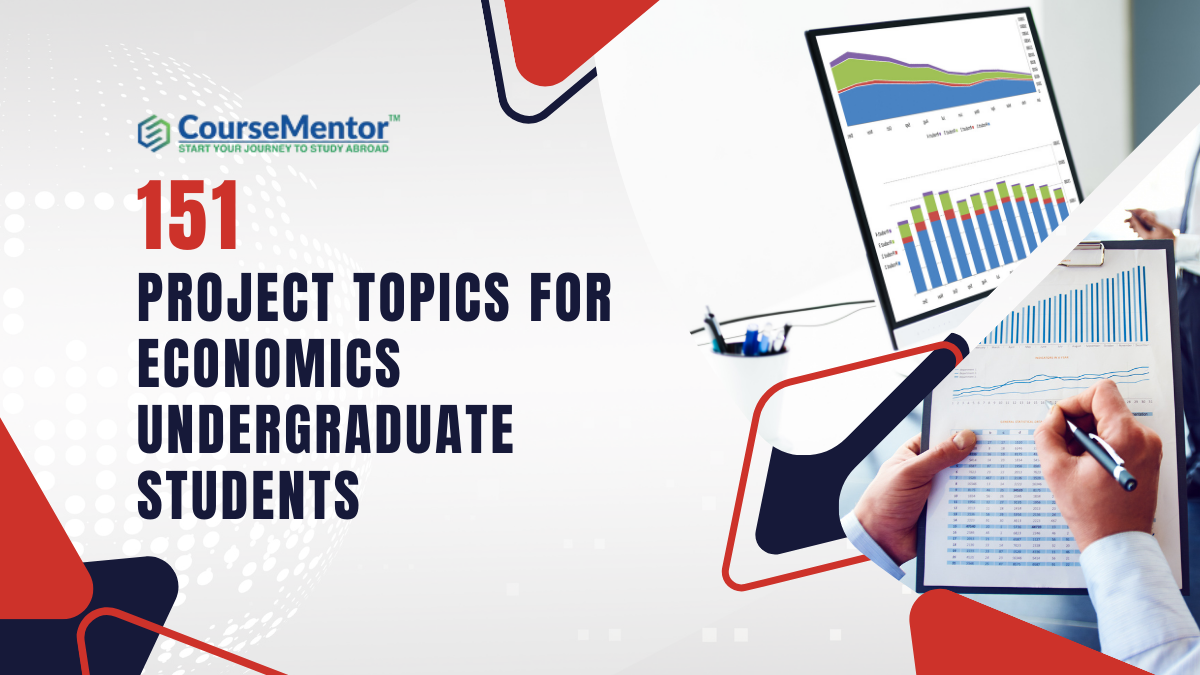
- Post author By admin
- March 15, 2024
- No Comments on 151 Project Topics For Economics Undergraduate Students (2024)
Selecting the right project topics for economics undergraduate students is crucial for students. It’s not just about completing an assignment; it’s an opportunity to delve into real-world economic issues, develop critical thinking skills, and lay the groundwork for future research.
In this blog, we’ll explore various project topics suitable for economics undergraduates, breaking down the process into simple steps for an average reader to understand.
Table of Contents

General Considerations for Selecting Project Topics
- Relevance: Pick a subject that connects to what’s happening now in the economy, like recent problems or ideas. Make sure it’s something you’re interested in and fits with what you want to do in your studies and future job.
- Feasibility: Assess whether the research can be realistically conducted within the constraints of your undergraduate study. Consider the availability of data, resources, and time.
- Interest: Select a topic that genuinely interests you. A genuine interest will sustain motivation throughout the research process and lead to a more meaningful exploration of the subject matter.
- Contribution: Evaluate the potential for your research to make an original contribution to the field of economics. Consider whether your findings could fill a gap in existing literature or provide new insights.
- Scope: Define the scope of your project clearly. Ensure it is manageable given the resources and time available. A well-defined scope will help you stay focused and avoid getting overwhelmed.
- Alignment: Ensure the project topic aligns with the guidelines and objectives of your academic program or course. It should meet the requirements set by your professors or institution.
- Accessibility: Check the accessibility of relevant literature, data, and resources needed for your research. Ensure you can access the necessary information to support your study effectively.
- Ethical Considerations: Consider any ethical implications associated with your chosen topic, especially if it involves human subjects or sensitive data. Ensure that your research adheres to ethical standards and guidelines.
151 Project Topics For Economics Undergraduate Students
- The Impact of Government Spending on Economic Growth
- Determinants of Foreign Direct Investment Inflows
- Analyzing the Effects of Minimum Wage Policies on Employment Levels
- Consumer Preferences and Demand Elasticities for Renewable Energy Sources
- The Role of Education in Economic Development
- Effects of Trade Liberalization on Income Inequality
- Economic Analysis of Healthcare Systems
- Impacts of Climate Change on Agricultural Productivity
- Gender Wage Gap: Causes and Solutions
- The Economics of Poverty Alleviation Programs
- The Relationship between Education and Economic Growth
- Fiscal Policy and its Impact on Aggregate Demand
- The Economics of Immigration: Costs and Benefits
- Impact of Technological Innovation on Economic Growth
- Analysis of Economic Recessions and Recoveries
- Economic Consequences of Brexit
- The Role of Central Banks in Economic Stability
- Inflation Targeting and Monetary Policy
- Effects of Globalization on Income Distribution
- Economic Analysis of Natural Disasters
- Behavioral Economics: Understanding Irrational Behavior
- The Economics of Healthcare Insurance Markets
- Impact of Exchange Rate Volatility on Trade
- Analysis of Economic Development Strategies in Developing Countries
- The Economics of Crime and Punishment
- Effects of Income Taxation on Labor Supply
- Economic Impacts of Aging Populations
- The Economics of Urbanization
- Financial Market Regulation and Stability
- The Economics of Environmental Sustainability
- Effects of Government Subsidies on Market Efficiency
- Economic Implications of Social Welfare Programs
- Economic Analysis of Housing Markets
- Impact of Global Supply Chains on International Trade
- Economics of Education: Returns to Schooling
- The Economics of Healthcare Costs and Spending
- Economic Evaluation of Infrastructure Projects
- Analysis of Economic Growth Models
- Impacts of Global Financial Crises on Emerging Markets
- The Economics of Innovation and Entrepreneurship
- Economic Effects of Government Debt and Deficits
- The Role of Institutions in Economic Development
- Trade-offs between Economic Growth and Environmental Conservation
- Economic Analysis of Income Mobility and Inequality
- Effects of Monetary Policy on Asset Prices
- Economic Impacts of Population Aging
- The Economics of Foreign Aid
- Impact of Technology on Labor Market Dynamics
- Economic Determinants of Health and Healthcare Utilization
- Analysis of Economic Effects of Immigration Policies
- The Economics of Corruption and its Consequences
- Economic Implications of Intellectual Property Rights
- Evaluation of Economic Policies in Developing Countries
- Economic Analysis of Crime Prevention Strategies
- Effects of Global Financial Integration on Developing Countries
- The Economics of Sports Industry
- Impact of Tax Policy on Economic Behavior
- Economic Implications of Climate Change Policies
- Analysis of Economic Effects of Trade Agreements
- The Role of Behavioral Biases in Financial Markets
- Economic Effects of Education Reforms
- The Economics of Healthcare Access and Equity
- Effects of Economic Uncertainty on Consumer Behavior
- Economic Analysis of Immigration and Refugee Policies
- Impact of Labor Market Regulations on Employment
- Economics of International Migration
- Economic Consequences of Political Instability
- Analysis of Economic Effects of Health Interventions
- Economic Evaluation of Social Security Systems
- The Economics of Technological Change
- Effects of Financial Development on Economic Growth
- Economic Impacts of Climate Change Adaptation
- The Economics of Globalization and Trade Imbalances
- Impact of Government Regulations on Business Environment
- Economic Evaluation of Healthcare Interventions
- Analysis of Economic Effects of Population Growth
- Economic Implications of International Capital Flows
- The Economics of Behavioral Finance
- Effects of Education Quality on Economic Development
- Economic Analysis of Consumer Behavior in Online Markets
- Impact of Immigration on Labor Market Dynamics
- Economic Consequences of Trade Protectionism
- The Economics of Cybersecurity
- Effects of Exchange Rate Movements on Trade Balance
- Economic Impacts of Health Insurance Coverage
- Analysis of Economic Effects of Energy Policies
- Economic Evaluation of Poverty Alleviation Programs
- The Economics of Financial Crises and Regulatory Responses
- Impact of Taxation on Economic Growth
- Economics of Water Resource Management
- Economic Analysis of Health Inequality
- Effects of Financial Inclusion on Economic Development
- Economic Implications of Government Subsidies
- The Economics of Behavioral Change Interventions
- Analysis of Economic Effects of Foreign Aid Programs
- Economic Evaluation of Education Policies
- The Economics of Social Networks
- Effects of Trade Openness on Economic Growth
- Economic Impacts of Immigration Policies
- Impact of Government Spending on Income Distribution
- Economic Analysis of Education Inequality
- Economics of Sustainable Development Goals (SDGs)
- Effects of Financial Literacy Programs on Economic Behavior
- Economic Implications of Population Aging
- The Economics of Renewable Energy Adoption
- Analysis of Economic Effects of Health Expenditure
- Economic Evaluation of Public Infrastructure Projects
- The Economics of Income Redistribution
- Effects of Economic Globalization on Labor Markets
- Economic Impacts of Trade Agreements on Developing Countries
- Impact of Fiscal Policy on Economic Stability
- Economics of E-commerce and Digital Markets
- Economic Analysis of Gender Wage Gap
- Effects of Economic Inequality on Social Mobility
- Economic Implications of Aging Population on Pension Systems
- The Economics of Behavioral Interventions in Poverty Alleviation
- Analysis of Economic Effects of Trade Tariffs
- Economic Evaluation of Healthcare Delivery Systems
- The Economics of Financial Inclusion
- Impact of Technology Adoption on Economic Growth
- Economics of Family Planning Programs
- Economic Analysis of Entrepreneurship Development
- Effects of Corruption on Economic Growth
- Economic Implications of Universal Basic Income
- The Economics of Housing Affordability
- Analysis of Economic Effects of Immigration on Host Countries
- Economic Evaluation of Education Quality
- The Economics of Corporate Social Responsibility
- Effects of Economic Policies on Income Distribution
- Economic Impacts of Remittances on Developing Countries
- Impact of Financial Education Programs on Economic Behavior
- Economics of Health Insurance Markets
- Economic Analysis of Climate Change Mitigation Strategies
- The Economics of Social Impact Bonds
- Effects of International Trade on Environmental Sustainability
- Economic Implications of Income Inequality on Economic Growth
- Analysis of Economic Effects of Social Welfare Programs
- Economic Evaluation of Labor Market Interventions
- The Economics of Technological Innovation in Agriculture
- Impact of Monetary Policy on Exchange Rates
- Economics of Carbon Pricing
- Economic Analysis of Financial Inclusion Initiatives
- Effects of Government Spending on Infrastructure Development
- Economic Impacts of Foreign Direct Investment on Host Countries
- The Economics of Cryptocurrencies and Blockchain Technology
- Analysis of Economic Effects of Aging Population on Healthcare Systems
- Economic Evaluation of Community Development Programs
- The Economics of Behavioral Change in Energy Conservation
- Effects of Economic Development on Environmental Degradation
- Economic Implications of Aging Population on Social Security Systems
- Analysis of Economic Effects of Financial Literacy Programs
Best Research Methodology For Economics Projects
Quantitative analysis.
- Regression Analysis: Assess the relationship between dependent and independent variables using regression models, such as linear regression, logistic regression, or panel data regression.
- Time-Series Analysis: Study changes in variables over time to identify trends, patterns, and forecast future values using techniques like ARIMA models, VAR models, or time-series regression.
- Experimental Economics: Conduct controlled experiments to analyze economic behavior and test hypotheses, often used in studying decision-making processes, incentives, and policy interventions.
Econometric Modeling
- Structural Equation Modeling (SEM): Examine complex relationships among multiple variables by estimating latent constructs and their relationships.
- Simulations: Use computational models to simulate economic systems, policy impacts, or market dynamics to predict outcomes and analyze policy alternatives.
Qualitative Analysis
- Case Studies: Investigate specific economic phenomena, institutions, or policies in-depth, often using interviews, observations, and document analysis to understand complex causal relationships.
- Content Analysis: Analyze textual data from documents, policy papers, or media sources to uncover trends, themes, and discourses related to economic issues.
- Ethnographic Studies: Immerse in economic settings or communities to observe and understand economic behavior, social norms, and cultural influences on economic decisions.
Mixed-Methods Approach
- Triangulation: Combine quantitative and qualitative methods to corroborate findings, enhance understanding, and provide a comprehensive analysis of economic phenomena.
- Sequential Design: Collect and analyze quantitative data first, followed by qualitative data to explore, explain, or contextualize quantitative findings.
Data Collection Methods
- Surveys and Questionnaires: Gather primary data by administering structured or semi-structured surveys to individuals, households, or businesses to collect information on economic preferences, behavior, or perceptions.
- Secondary Data Analysis: Utilize existing datasets from government agencies, international organizations, or academic sources to conduct empirical research, analyze trends, and test economic hypotheses.
Sampling Techniques
- Random Sampling: Ensure representativeness and reduce bias by selecting samples randomly from the population of interest.
- Stratified Sampling: Divide the population into homogeneous strata and then randomly sample from each stratum to ensure proportional representation of subgroups.
- Cluster Sampling: Divide the population into clusters and randomly sample clusters to reduce costs and increase efficiency, especially when the population is geographically dispersed.
Validity and Reliability
- Ensure the validity of measurements and research findings by using reliable data sources, robust methodologies, and appropriate statistical techniques.
- Conduct sensitivity analyses , robustness checks, and validation procedures to assess the robustness and generalizability of research findings.
Ethical Considerations
- Adhere to ethical guidelines and principles when conducting research involving human subjects, sensitive data, or vulnerable populations.
- Obtain informed consent, protect privacy and confidentiality, and minimize harm to participants in accordance with institutional review board (IRB) or ethics committee requirements.
Choosing the best project topics for economics undergraduate students is an exciting opportunity to deepen their understanding of economic principles and contribute to the field’s knowledge.
By considering factors such as relevance, feasibility, and personal interest, you can select a topic that not only meets academic requirements but also inspires curiosity and passion.
Remember, the journey of research is as valuable as the findings themselves, so embrace the process with enthusiasm and dedication. Happy researching!
Leave a Reply Cancel reply
You must be logged in to post a comment.
- australia (2)
- duolingo (13)
- Education (266)
- General (70)
- How To (16)
- IELTS (127)
- Latest Updates (162)
- Malta Visa (6)
- Permanent residency (1)
- Programming (31)
- Scholarship (1)
- Sponsored (4)
- Study Abroad (187)
- Technology (12)
- work permit (8)
Recent Posts
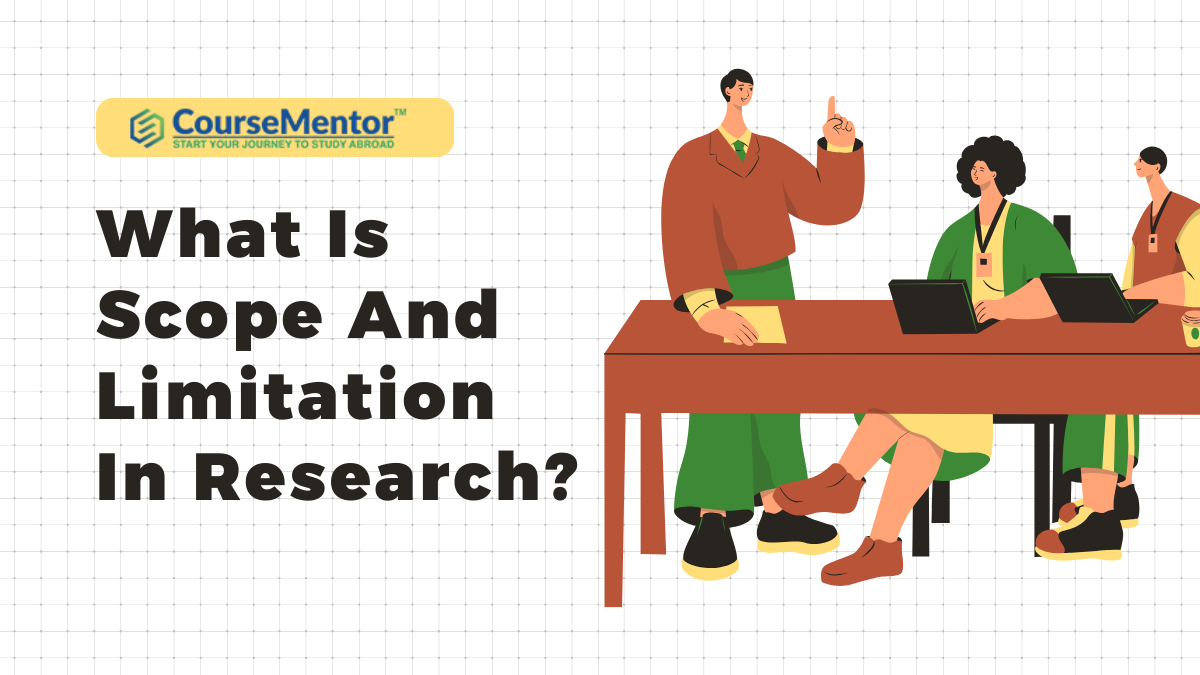
51+ Economics Project Topics [Updated]

Economics may sound like a daunting subject, but it’s all around us, influencing every aspect of our lives. Economic projects delve into various aspects of how societies produce, distribute, and consume products or goods and services. Whether you’re a student looking for compelling economics project topics or someone curious about the world of economics, this guide will walk you through some fascinating areas to explore.
How Do You Write An Economic Project?
Table of Contents
Writing an economic project involves several steps to effectively research, analyze, and present your findings. Here’s a general guide on how to write an economic project:
- Choose a Topic: Choose an economic subject that captures your interest and is in line with the requirements of your assignment or the objectives of your research. It could be a macroeconomic trend, a microeconomic analysis, or a specific area like environmental economics or development economics.
- Conduct Research: Collect pertinent data and information from credible sources like scholarly journals, government reports, economic repositories, and literature. Make sure to critically evaluate the credibility and reliability of your sources.
- Outline Your Project: Create an outline that organizes your ideas and arguments logically. Include sections such as introduction, literature review, methodology, findings, discussion, and conclusion.
- Write the Introduction: Begin with an introduction that provides background information on your topic, states the purpose of your project, and outlines the structure of your paper.
- Review the Literature: Perform a thorough examination of existing literature and theories pertinent to your subject matter through a literature review. Identify any deficiencies or areas lacking sufficient research that your project intends to fill.
- Develop a Methodology: Describe the methods you used to collect and analyze data. This may include quantitative techniques such as econometric modeling or qualitative approaches like case studies or interviews.
- Present Your Findings: Present the results of your analysis in a clear and organized manner. Use tables, charts, and graphs to illustrate key findings and trends.
- Discuss Your Results: Interpret the implications of your findings and discuss their significance in relation to existing literature and theoretical frameworks. Address any limitations or constraints of your study.
- Draw Conclusions: Provide a condensed overview of your project’s key discoveries and derive conclusions from your analysis. Consider the broader implications of your research and suggest areas for further study.
- Write the Conclusion: Conclude your project by restating the main points and highlighting the contribution of your research to the field of economics. Discuss any practical implications or policy recommendations arising from your findings.
- Cite Your Sources: Make sure to cite all sources properly used in your project according to the appropriate citation style (e.g., APA, MLA, Chicago).
- Proofread and Edit: Finally, carefully proofread your project to check for errors in grammar, spelling, and formatting. Ensure that your writing is clear, concise, and coherent.
By following these steps, you can effectively write an economic project that demonstrates your understanding of economic concepts, analytical skills, and ability to communicate research findings effectively.
51+ Economics Project Topics: Category Wise
Macroeconomic topics.
- The Impact of Fiscal Policy on Economic Growth
- Analyzing the Effects of Monetary Policy on Inflation
- Evaluating the Relationship Between Exchange Rates and Export Performance
- Assessing the Role of Government Spending in Stimulating Aggregate Demand
- Examining the Causes and Consequences of Economic Recessions
Microeconomic Topics
- Market Structure Analysis: A Case Study of the Smartphone Industry
- Consumer Behavior and Preferences in the Fast Food Industry
- The Impact of Price Elasticity on Revenue in the Airline Industry
- Producer Surplus and Profit Maximization in Competitive Markets
- Analyzing Market Failures and the Need for Government Intervention
International Economics Topics
- The Effects of Trade Liberalization on Developing Countries
- Exchange Rate Volatility and Its Impact on International Trade
- Globalization and Its Effects on Income Inequality
- Trade Policies and Their Influence on Foreign Direct Investment
- Comparative Advantage and Specialization in International Trade
Environmental Economics Topics
- The Economics of Renewable Energy Adoption
- Carbon Pricing and Its Implications for Climate Change Mitigation
- Economic Valuation of Ecosystem Services
- Environmental Regulations and Firm Behavior: A Case Study Approach
- The Role of Economics in Biodiversity Conservation Efforts
Development Economics Topics
- Microfinance and Poverty Alleviation: Lessons from Case Studies
- The Impact of Education on Economic Development
- Evaluating the Effectiveness of Conditional Cash Transfer Programs
- Gender Inequality and Economic Development: An Empirical Analysis
- The Role of Foreign Aid in Promoting Sustainable Development
Behavioral Economics Topics
- Behavioral Biases in Consumer Decision-Making: A Experimental Study
- Nudge Theory and Its Applications in Public Policy
- Prospect Theory and Risk Preferences in Investment Decisions
- The Influence of Social Norms on Economic Behavior
- Behavioral Economics Approaches to Addressing Climate Change
Econometrics and Quantitative Analysis Topics
- Time-Series Analysis of Stock Market Volatility
- Regression Analysis of Factors Affecting Housing Prices
- Forecasting Macroeconomic Indicators Using Machine Learning Techniques
- Panel Data Analysis of Regional Economic Disparities
- Causal Inference Methods in Economic Research
Policy Analysis and Evaluation Topics
- Cost-Benefit Analysis of Infrastructure Projects
- Evaluating the Impact of Minimum Wage Policies on Employment
- Welfare Effects of Tax Reform: A Microsimulation Approach
- Policy Responses to Economic Shocks: Lessons from the COVID-19 Pandemic
- Assessing the Effectiveness of Anti-Poverty Programs in Developing Countries
Monetary Economics Topics
- The Transmission Mechanism of Monetary Policy
- Central Bank Independence and Inflation Targeting
- Quantitative Easing and Its Effects on Financial Markets
- The Role of Interest Rates in Determining Investment Decisions
- Digital Currencies and the Future of Monetary Policy
Labor Economics Topics
- The Economics of Immigration: Impacts on Labor Markets
- Gender Wage Gap: Causes and Policy Implications
- The Effects of Automation on Employment Patterns
- Labor Market Dynamics and Unemployment Duration
- Evaluating the Impact of Minimum Wage Laws on Poverty
Health Economics Topics
- The Economics of Healthcare Financing Systems
- Cost-Effectiveness Analysis of Healthcare Interventions
- The Impact of Health Insurance Coverage on Healthcare Utilization
- Behavioral Economics Approaches to Promoting Healthier Lifestyles
- Healthcare Market Competition and Patient Outcomes: Evidence from Empirical Studies
What To Avoid For Economics Projects?
When working on economics projects, it’s essential to be aware of common pitfalls to avoid. Here’s a list of things to steer clear of:
- Lack of Clarity in Research Question: Ensure your research question is clear, specific, and well-defined. Avoid ambiguity or broad topics that make it difficult to focus your research.
- Poor Data Quality: Avoid using unreliable or outdated data sources. Ensure your data is accurate, relevant, and obtained from reputable sources.
- Ignoring Assumptions: Be transparent about the assumptions underlying your analysis. Ignoring or glossing over assumptions can weaken the validity of your findings.
- Overly Complex Models: While sophisticated models can be impressive, avoid unnecessarily complex models that obscure key relationships or make interpretation difficult.
- Ignoring Alternative Explanations: Consider alternative explanations for your findings and address potential counterarguments. Ignoring alternative explanations can weaken the credibility of your analysis.
- Misinterpreting Correlation as Causation: Be cautious when interpreting correlations as causation. Correlation does not imply causation, so ensure you have robust evidence to support causal claims.
- Ignoring Feedback Effects: Consider feedback effects and dynamic interactions between variables in your analysis. Ignoring feedback effects can lead to biased or misleading conclusions.
- Ignoring Heterogeneity: Recognize heterogeneity within the population or sample under study. Ignoring heterogeneity can lead to overgeneralization of results.
- Overlooking Endogeneity: Be mindful of endogeneity issues, where the relationship between variables is bidirectional or influenced by unobserved factors. Addressing endogeneity requires careful modeling and appropriate techniques.
- Inadequate Literature Review: Conduct a thorough literature review to situate your research within the existing literature. Avoid overlooking relevant studies or failing to acknowledge prior research.
- Inadequate Discussion of Limitations: Acknowledge the limitations of your study and discuss their implications for the validity and generalizability of your findings.
- Poor Presentation and Organization: Ensure your project is well-organized and clearly presented. Avoid cluttered or confusing visuals, inconsistent formatting, or unclear writing.
By avoiding these common pitfalls, you can enhance the quality and credibility of your economics projects and contribute meaningfully to the field of study.
Economics is a dynamic and multifaceted field, offering endless opportunities for exploration and discovery. Whether you’re interested in understanding the forces shaping the global economy or seeking solutions to pressing social issues, there’s a wealth of topics to explore.
By delving into these areas, you’ll gain valuable insights into how economies work and how they can be improved for the benefit of all. So, don’t hesitate to dive into economics project topics and start exploring the fascinating world of economics.
Related Posts

Step by Step Guide on The Best Way to Finance Car

The Best Way on How to Get Fund For Business to Grow it Efficiently
Leave a comment cancel reply.
Your email address will not be published. Required fields are marked *
199+ Project Topics for Economics Undergraduate Students

Understanding why economics matters for students is crucial. It acts as a guide, helping students navigate the complexities of our global world. In a society influenced by economic forces, having knowledge of economics empowers students to grasp how things work, make informed choices, and contribute meaningfully to the future. Recognizing the intricate nature of economic concepts, our blog steps in as a helpful resource for undergraduates.
However, this blog thoughtfully gathers a variety of project topics, offering a clear path for students to explore the details of economic theories, policies, and research. Here, you’ll discover a range of interesting subjects that not only fulfill academic requirements but also deepen your understanding of the diverse world of economics. Join us on this enlightening journey as we explore the importance of economics and dive into engaging project topics for economics undergraduate students.
What is a Project in Economics?
Table of Contents
In economics, a project typically refers to a focused research endeavor aimed at exploring and analyzing specific economic phenomena. These projects can cover a wide range of topics, such as examining market trends, assessing policy impacts, or conducting empirical studies. Students often undertake economic projects to gain practical insights, enhance analytical skills, and apply theoretical knowledge to real-world scenarios. The outcomes of these projects may include reports, presentations, or papers that contribute to a deeper understanding of economic principles and their practical implications.
Benefits of Using Project Topics for Economics Undergraduate Students
Here are some benefits of economics project ideas for students:
- Focused Learning: Project topics offer a concentrated study on specific aspects of economics, allowing students to delve deep into a particular area of interest.
- Applied Knowledge: Engaging in projects enables students to apply theoretical concepts to real-world situations, fostering a practical understanding of economic principles.
- Analytical Skills: Researching and presenting a project hones analytical skills, teaching students to critically evaluate data, draw conclusions, and communicate findings effectively.
- Preparation for Future Endeavors: Completing projects prepares undergraduates for future academic and professional challenges by honing research, writing, and presentation skills essential for success in various fields.
- Personalized Exploration: Students have the freedom to choose project topics aligned with their passions, making the learning process more enjoyable and personally fulfilling.
Criteria for Choosing Economics Project Topics
1. Interest Alignment
Select a project topic that aligns with your personal interests within the broad field of economics.
2. Relevance
Ensure the chosen topic is relevant to current economic issues or addresses a specific aspect of economic theory, policy, or practice.
3. Feasibility
Consider the availability of data, resources, and time constraints to ensure the chosen project is realistic and achievable.
Choose a topic with the potential to contribute valuable insights or solutions to existing economic challenges.
5. Supervisor Guidance
Seek input from mentors or professors to ensure the chosen project aligns with academic standards and objectives.
List of Project Topics for Economics Undergraduate Students
The following list comprises project topics for economics undergraduate students. These topics offering a diverse array of research avenues for students to explore and delve into the multifaceted world of economic analysis.
Macroeconomics
- Impact of Fiscal Policy on Economic Growth
- Analysis of Inflation and its Effects on the Economy
- The Role of Central Banks in Monetary Policy
- Government Debt and its Implications on the Economy
- Unemployment Dynamics: Causes and Solutions
- Exchange Rate Movements and International Trade
- Economic Consequences of Population Aging
- Business Cycles and Economic Fluctuations
- The Phillips Curve: Theory and Empirical Evidence
- Effects of Global Economic Shocks on Domestic Economies
Microeconomics
- Market Structure and its Impact on Firm Behavior
- Consumer Behavior in the Digital Age
- Game Theory and Strategic Decision Making
- Pricing Strategies and Market Competition
- Externalities and Market Failures
- The Economics of Information and Asymmetric Information
- Labor Market Dynamics and Wage Determination
- Analysis of Cartels and Antitrust Policies
- Impact of Government Regulations on Industries
- Economics of Network Industries
Development Economics
- Poverty Alleviation Strategies in Developing Countries
- Role of Foreign Aid in Economic Development
- Gender Inequality and Economic Development
- The Informal Economy in Developing Nations
- Impact of Education on Economic Development
- Infrastructure Development and Economic Growth
- Agricultural Policies and Rural Development
- Technological Innovation and Economic Progress
- Sustainable Development Goals (SDGs) and Economic Policies
- Microfinance and Entrepreneurship in Developing Economies
International Economics
- Globalization and its Effects on National Economies
- Trade Liberalization and Economic Growth
- Foreign Direct Investment (FDI) and Host Country Development
- Exchange Rate Volatility and Trade Flows
- Trade Policies and Regional Integration
- Balance of Payments: Causes and Consequences
- Economic Integration in the European Union
- Currency Crises and Financial Contagion
- Comparative Advantage and Trade Patterns
- International Migration and its Economic Impacts
Environmental Economics
- Economic Valuation of Ecosystem Services
- Carbon Pricing and Climate Change Mitigation
- The Economics of Renewable Energy
- Deforestation and Economic Consequences
- Environmental Regulations and Industry Compliance
- Sustainable Resource Management
- Economic Analysis of Pollution Control Policies
- Biodiversity Conservation and Economic Development
- Water Scarcity and Economic Adaptation
- Green Technology Adoption in Industry
Behavioral Economics
- Nudging and Behavioral Interventions in Public Policy
- Prospect Theory and Decision Making under Uncertainty
- Behavioral Economics of Savings and Investment
- Social Preferences and Economic Choices
- Cognitive Biases in Economic Decision Making
- Emotions and Economic Behavior
- Fairness and Equity in Economic Exchanges
- Impulse Buying and Consumer Behavior
- Neuroeconomics: Integrating Neuroscience and Economics
- Cultural Influences on Economic Decision Making
Financial Economics
- Asset Pricing Models and Investment Strategies
- Financial Market Efficiency and Anomalies
- Corporate Finance and Capital Structure Decisions
- Financial Regulation and Market Stability
- Risk Management in Financial Institutions
- Behavioral Finance in Stock Market Trading
- Derivatives Markets and Hedging Strategies
- Impact of Information Technology on Financial Markets
- Credit Markets and Banking Crises
- Initial Public Offerings (IPOs) and Market Performance
Health Economics
- The Economics of Healthcare Financing
- Demand for Health Services and Healthcare Utilization
- Economic Analysis of Public Health Interventions
- Health Insurance and Access to Medical Care
- Pharmaceutical Pricing and Market Dynamics
- Economic Burden of Chronic Diseases
- Global Health Economics: Challenges and Opportunities
- Healthcare Expenditure and Economic Growth
- Behavioral Factors in Health Decision Making
- Economic Evaluation of Health Programs
Labour Economics
- Wage Inequality and Income Distribution
- Impact of Technological Change on Employment
- Gender Wage Gap: Causes and Solutions
- Labor Market Flexibility and Economic Performance
- Unemployment Insurance and Labor Market Dynamics
- Impact of Minimum Wage Laws on Employment
- Job Training Programs and Skill Development
- Aging Workforce and Retirement Policies
- Labor Market Discrimination: Evidence and Remedies
- Gig Economy and Changing Work Patterns
Public Economics
- Taxation Policies and Economic Efficiency
- Public Expenditure and Economic Growth
- Social Security and Intergenerational Equity
- Government Subsidies and Market Distortions
- Public-Private Partnerships in Infrastructure Development
- Cost-Benefit Analysis of Public Projects
- Fiscal Federalism and Local Government Finances
- Political Economy of Public Policy Choices
- The Economics of Welfare Programs
- Public Goods and Collective Decision Making
Industrial Organization
- Market Power and Pricing Strategies
- Entry and Exit in Competitive Markets
- Mergers and Acquisitions: Economic Implications
- Network Effects and Market Dominance
- Product Differentiation and Consumer Preferences
- Vertical Integration and Supply Chain Management
- Innovation and Competition in High-Tech Industries
- Monopoly Regulation and Consumer Protection
- Antitrust Policies in Dynamic Industries
- Market Structure and Innovation Incentives
Econometrics
- Time Series Analysis and Forecasting
- Panel Data Econometrics: Applications and Challenges
- Instrumental Variables and Endogeneity Issues
- Causal Inference in Observational Studies
- Bayesian Econometrics and Model Uncertainty
- Machine Learning in Economic Forecasting
- Nonparametric Methods in Econometric Analysis
- Testing for Unit Roots and Structural Breaks
- Spatial Econometrics: Models and Estimation
- Robust Estimation Techniques in
Advanced Econometric Techniques
- Granger Causality and Time Series Relationships
- Monte Carlo Simulations in Econometric Modeling
- Forecast Evaluation and Model Comparison
- Nonlinear Dynamics and Chaos Theory in Econometrics
- Endogeneity in Cross-Sectional Data Analysis
- Forecasting Volatility in Financial Markets
- Instrument Selection in Instrumental Variable Estimation
- Machine Learning Approaches to Causal Inference
- Bayesian Model Averaging in Econometric Analysis
- Quantile Regression and Tail Analysis
Monetary Economics
- The Role of Money in the Modern Economy
- Monetary Policy Transmission Mechanisms
- Central Bank Independence and Monetary Stability
- Digital Currencies and the Future of Money
- Quantitative Easing and Unconventional Monetary Policy
- The Phillips Curve and Inflation Expectations
- Optimal Currency Areas and Exchange Rate Regimes
- Financial Innovation and Monetary Policy Challenges
- Hyperinflation: Causes and Consequences
- International Reserves and Monetary Policy Coordination
Urban and Regional Economics
- Urbanization and Economic Development
- The Economics of Gentrification
- Regional Disparities in Economic Growth
- Transportation Infrastructure and Urbanization
- Agglomeration Economies and City Dynamics
- Housing Markets and Urban Planning
- Local Government Finance and Fiscal Policies
- Migration Patterns and Regional Labor Markets
- Smart Cities: Technology and Urban Efficiency
- Urban Sustainability and Environmental Economics
Economics of Education
- The Impact of Education on Income Inequality
- School Choice and Education Outcomes
- Education Quality and Economic Development
- The Economics of College Access and Affordability
- Teacher Incentives and Student Performance
- Educational Technology and Learning Outcomes
- Early Childhood Education and Long-Term Effects
- Vocational Education and Labor Market Outcomes
- Education Financing and Student Loan Debts
- Gender Disparities in Education Attainment
Agricultural Economics
- Agricultural Subsidies and Market Distortions
- Climate Change and Agriculture: Impacts and Adaptations
- Farm Management and Efficiency Analysis
- Agricultural Trade Policies and Global Markets
- Land Tenure Systems and Agricultural Productivity
- Sustainable Agriculture Practices and Economic Viability
- Rural-Urban Linkages and Agricultural Development
- Agricultural Extension Services and Technology Adoption
- Food Security and Poverty Alleviation in Rural Areas
- Agribusiness and Value Chain Analysis
Economics of Innovation
- Innovation and Economic Growth
- Intellectual Property Rights and Innovation Incentives
- Open Innovation Models and Collaboration
- Technology Transfer and Knowledge Spillovers
- Start-up Ecosystems and Entrepreneurship
- Research and Development Investment Strategies
- Innovation Policy and Government Intervention
- Industry Clusters and Innovation Networks
- Creative Industries and Economic Development
- Innovation Metrics and Measurement
Economic History
- Economic Causes and Consequences of Historical Wars
- Industrial Revolution and Economic Transformations
- Historical Perspectives on Financial Crises
- The Great Depression: Lessons for Today
- Colonialism and its Economic Legacy
- Economic Impact of Technological Revolutions
- Economic Changes in Post-Socialist Transition
- Globalization and Historical Trade Patterns
- Economic History of Pandemics and Health Crises
- Evolution of Economic Thought over the Centuries
Health Care Financing
- Comparative Analysis of Health Care Systems
- Universal Health Coverage: Challenges and Solutions
- Public-Private Partnerships in Healthcare
- Health Insurance Models and Access to Care
- Cost-Effectiveness Analysis of Health Interventions
- Healthcare Innovation and Financial Viability
- Impact of Demographics on Health Care Costs
- The Role of Technology in Healthcare Financing
- Economic Evaluation of Health Care Reform
Energy Economics
- Energy Pricing and Market Dynamics
- Renewable Energy Adoption and Economic Impact
- Energy Security and Geopolitics
- Energy Efficiency and Economic Sustainability
- Oil Price Volatility and Economic Consequences
- Nuclear Energy : Costs and Benefits
- The Economics of Carbon Capture and Storage
- Transition to a Low-Carbon Economy: Challenges and Opportunities
- Energy Markets and Competition
- Economic Analysis of Energy Policies and Regulations
These project topics for economics undergraduate students with a diverse range of options for research and exploration.
Tips for Conducting Effective Project Topics for Economics Undergraduate Students
- Dive into extensive research to build a solid foundation for your project.
- Define clear and achievable objectives to guide your project effectively.
- Ensure data used is reliable and relevant for accurate analysis.
- Apply critical thinking to interpret findings and draw meaningful conclusions.
- Organize your project logically for a coherent and impactful presentation.
- Regularly seek feedback from peers or mentors to enhance project quality.
- Plan your time wisely to meet project deadlines without compromising quality.
- Keep abreast of current economic developments to enrich the context of your project.
In conclusion, undertaking project topics for economics undergraduate students a unique opportunity to blend theoretical knowledge with practical application. Through focused research and analysis, students can deepen their understanding of economic principles, enhance analytical skills, and contribute meaningfully to the academic discourse. The process not only prepares them for future challenges but also fosters a passion for continuous learning and exploration within the dynamic field of economics.
As they present their findings, students not only fulfill academic requirements but also showcase their ability to critically engage with economic issues, making them well-equipped for the journey ahead in both academia and the professional realm.
Related Posts

Science Fair Project Ideas For 6th Graders
When it comes to Science Fair Project Ideas For 6th Graders, the possibilities are endless! These projects not only help students develop essential skills, such…

Java Project Ideas for Beginners
Java is one of the most popular programming languages. It is used for many applications, from laptops to data centers, gaming consoles, scientific supercomputers, and…

80+ Best Project Topics for Economics Undergraduate Students in 2024
Explore a World of Economic Ideas with Engaging Project Topics for Economics Undergraduate Students. Uncover Fresh Insights, Boost Your Academic Journey, and Dive into Real-World Economic Challenges. Discover Your Ideal Economics Project Today
Imagine economics as your compass to navigate the intricate web of choices, markets, and human behavior that shapes our world. Now, picture yourself as an undergraduate student, equipped with the tools to uncover the secrets of this captivating discipline. Your mission? To choose a project topic that takes you on an academic adventure like no other.
Selecting the perfect project topic is akin to choosing the destination for your intellectual journey. It’s a chance to explore economic phenomena, analyze real-world issues, and contribute your unique perspective to the field. In this article, we’re your travel guides, ready to lead you through a treasure trove of project topics crafted especially for economics undergraduates.
These topics are more than just assignments; they’re the portals to deeper understanding, critical thinking, and personal growth. So, fasten your seatbelts and get ready to embark on a journey where the economics of the world become your playground.
Table of Contents
Project Topics for Economics Undergraduate Students
Check out project topics for economics undergraduate students:-
Macroeconomics
- Analyzing the Impact of Government Expenditure on Economic Growth
- The Relationship Between Interest Rates and Investment: A Macroeconomic Perspective
- Inflation Targeting as a Monetary Policy Framework: An Evaluation
- The Phillips Curve and Its Relevance in Today’s Economy
- Government Debt Sustainability: A Case Study of [Your Country]
- The Role of Central Banks in Financial Crises: Lessons from Recent History
- Fiscal Stimulus Packages and Their Effects on Employment
- Exchange Rate Policies and Their Implications for Trade Balances
- Economic Consequences of Population Aging: A Global Comparison
- The Effect of Income Inequality on Macroeconomic Stability
Microeconomics
- Analyzing Consumer Behavior in Online Shopping
- Market Power and Price Discrimination: A Study of [Industry]
- Game Theory Application in Oligopoly Markets
- The Economics of Intellectual Property Rights: Copyright vs. Patent Protection
- Consumer Surplus and Deadweight Loss: A Case Study of Taxation
- The Impact of Monopsony Power on Labor Markets
- Economic Analysis of Environmental Externalities in [Specific Industry]
- Efficiency of Government Subsidies in the Agricultural Sector
- Microeconomic Factors Influencing Small Business Survival
- The Economics of Information Asymmetry in Health Care
International Economics
- The Effects of Trade Agreements on Export Growth in Developing Countries
- Currency Devaluation and Its Impacts on International Trade
- Comparative Advantage in a Globalized World: Case Studies of Nations
- Foreign Direct Investment and Economic Development in [Country]
- The Role of International Financial Institutions in Global Financial Stability
- Global Value Chains and Their Implications for Trade and Labor Markets
- The Impact of Tariffs and Trade Barriers on International Business
- Analyzing the Economic Effects of Brexit on the UK and EU
- Exchange Rate Volatility and Its Effects on Foreign Direct Investment
- Economic Consequences of Trade Wars: A Comprehensive Analysis
Labor Economics
- The Gender Wage Gap: Causes and Solutions
- Unemployment Duration and Its Relationship with Skill Mismatch
- Minimum Wage Policies and Their Influence on Youth Employment
- Labor Market Segmentation: A Comparative Study of [Countries]
- Determinants of Labor Force Participation Among Older Workers
- Employment Effects of Immigration Policies: A Case Study of [Country]
- Labor Market Outcomes for College Graduates: A Longitudinal Analysis
- The Impact of Trade Unions on Wage Bargaining and Labor Market Outcomes
- The Economics of Apprenticeships: A Comparative Analysis
- Racial Wage Disparities and Discrimination in the Labor Market
Development Economics
- Microfinance and Poverty Alleviation: An Empirical Analysis
- The Role of Education in Economic Development: A Longitudinal Study
- Infrastructure Investment and Its Effects on Regional Development
- Foreign Aid Allocation and Its Impact on Health and Education
- The Dynamics of Rural-Urban Migration: A Comparative Analysis
- Trade and Economic Growth in Developing Countries: Case Studies
- The Economics of Sustainable Agriculture and Food Security
- Microenterprise Development and Its Contribution to Local Economies
- Informal Sector Employment and Economic Growth in Developing Nations
- Energy Access and Economic Development in Sub-Saharan Africa
Health Economics
- The Impact of Health Insurance on Healthcare Utilization and Expenditure
- Economic Evaluation of Health Promotion Programs: Case Studies
- Healthcare Financing and Its Effect on Access to Care
- Pharmaceutical Pricing and Access to Medicines: A Global Perspective
- Economic Consequences of Aging Populations on Healthcare Systems
- The Role of Telemedicine in Expanding Healthcare Access in Rural Areas
- The Economics of Mental Health Services and Stigma Reduction
- Healthcare Systems and Outcomes: A Comparative Analysis of Nations
- The Economic Implications of Global Health Crises: Lessons from Pandemics
- Economic Inequality and Healthcare Disparities: A Cross-Country Study
Environmental Economics
- Carbon Pricing and Its Effects on Greenhouse Gas Emissions
- Renewable Energy Policies and Their Impact on Economic Growth
- The Economics of Ecosystem Services: Valuation and Conservation
- Market-Based Environmental Policies: Cap and Trade vs. Carbon Tax
- The Cost-Benefit Analysis of Environmental Regulations
- Sustainable Resource Management in Fisheries: Economic Considerations
- Water Scarcity and Its Economic Implications in Arid Regions
- The Economics of Recycling and Waste Management
- Economic Incentives for Biodiversity Conservation in National Parks
- Natural Disasters and Their Economic Consequences: A Comparative Analysis
Public Economics
- Taxation and Income Redistribution: A Case Study of Progressive Tax Systems
- Government Spending and Economic Growth: Keynesian vs. Supply-Side Economics
- The Economics of Universal Basic Income: Feasibility and Effects
- Public Debt Management and Fiscal Sustainability: Lessons from [Country]
- Economic Analysis of Social Welfare Programs and Their Impact on Poverty
- Privatization of Public Services and Efficiency Gains: Case Studies
- The Economics of Nudging: Behavioral Insights in Public Policy
- Tax Incidence Analysis: Who Bears the Burden of Taxation?
- The Role of Public-Private Partnerships in Infrastructure Development
- The Economics of State and Local Government Fiscal Policies: A Comparative Study
These project topics provide a wide array of options for undergraduate students studying economics. They cover various subfields within economics, allowing students to explore topics
What is a good topic for economics?
Selecting the ideal economics project topic is a bit like choosing your next adventure. The world of economics offers a rich tapestry of possibilities, each leading to unique discoveries and insights. To help you on your journey, here are some engaging and intriguing project areas:
Macroeconomic Exploration
- Unraveling the Economic Magic: The Impact of Fiscal Policy on Growth
- Inflation and Unemployment: A Rollercoaster of Economic Effects
- Monetary Policy and Exchange Rates: Navigating the Currency Seas
Microeconomic Marvels
- Market Wars and Strategies: Inside the World of [Specific Industry]
- Consumer Behavior Mysteries: Deciphering Demand Elasticity for [Product]
- Price Discrimination Unveiled: A Deep Dive into Retail Tactics
Global Economics Odyssey
- Trade Tales: How Trade Liberalization Shapes Developing Nations
- Currency Conundrums: Exploring Exchange Rate Fluctuations and Trade
- Trade Wars: The Clash of Economic Titans
Development Dreams
- Microfinance Miracles: Empowering Communities and Alleviating Poverty
- Infrastructure Alchemy: The Secret to Economic Growth
- Foreign Aid Adventures: Unlocking the Key to Economic Development
Labor Market Expeditions
- Gender Pay Gap: Unraveling the Causes and Crafting Solutions
- Unemployment Chronicles: Trends and Policy Pathways in [Specific Region]
- Immigration Impact: How Newcomers Reshape Labor Markets
Health Economics Escapade
- Healthcare Economics Uncovered: The Price of Staying Healthy
- Medicine and Money: The Economics of Pharmaceutical Pricing
- Healthcare Dollars and Sense: Comparing Health Outcomes Across Nations
Environmental Economics Adventure
- Carbon Pricing Chronicles: Economic Tools for Environmental Heroes
- Green Energy: Unleashing the Economic Power of Renewables
- Nature’s Worth: The Economic Valuation of Ecosystem Services
Public Policy Odyssey
- Tax Tales: The Economics of Income Redistribution
- Government Spending Safari: How It Affects Economic Growth
- Universal Basic Income: Is It the Economic Holy Grail?
A good economics project topic should be like a fascinating story, one that piques your curiosity and leads to exciting revelations. So, embrace your interests, follow your passion, and choose a topic that will not only fuel your intellectual journey but also make a meaningful impact in the world of economics. Your adventure begins now!
What are the research topics for economics?
Are you ready to delve into the intriguing world of economics research? Think of it as a grand adventure, where every research topic is a path to discovery and understanding. Here, we present a captivating array of research areas:
- Economic Growth and Development: The Quest for Prosperity
- International Trade and Investment: Charting the Global Economic Odyssey
- Financial Markets and Asset Pricing: Deciphering the Language of Wealth
- Labor Markets and Wage Determination: The Economics of Earning a Living
- Public Economics and Taxation: Where Policy Shapes Our Economies
- Industrial Organization and Competition Policy: Unraveling Market Secrets
- Environmental Economics and Resource Management: Balancing Nature and Economy
- Behavioral Economics and Experimental Economics: The Human Side of Decision-Making
- Development Economics and Poverty Alleviation: Empowering Communities and Nations
- Monetary Economics and Central Banking: Guardians of Economic Stability
- Macroeconomics and Business Cycles: Riding the Tides of Economic Change
- Health Economics and the Economics of Education: Nurturing Well-Being and Knowledge
- Urban Economics and Regional Development: The Evolution of Cities and Regions
These are just the beginning of your quest; the world of economics is brimming with possibilities. When you select your research topic, let your passion guide you, and consider your research skills and the availability of data and resources.
How do I choose a research topic in economics?
Choosing a research topic in economics is a bit like choosing your next adventure. It’s an opportunity to explore, discover, and make a meaningful impact. Here’s a guide to help you embark on this exciting journey:
- Follow Your Passion: Think about the areas of economics that genuinely fascinate you. Your passion will be your guiding star, keeping you motivated.
- Know Your Strengths: Assess your existing knowledge and research skills. A topic that aligns with your expertise can give you a head start.
- Seek Wise Counsel: Don’t hesitate to consult your professors, academic advisors , or mentors. They’re like seasoned travelers who can point you in the right direction.
- Survey the Terrain: Dive into recent economic research. What are others studying? Are there gaps or uncharted territories that pique your interest?
- Make it Matter: Consider the real-world relevance of your research. How can it contribute to solving practical problems or improving our understanding of the world?
- Zoom In: Take that broad area you’re thinking about and narrow it down to a specific research question. This will be your compass, ensuring you stay on course.
- Data Check: Ensure that you have access to the necessary data for your topic. Without data, your research could hit a roadblock.
- Feasibility Matters: Consider the time and resources at your disposal. Choose a topic that’s doable within your constraints.
- Blaze Your Trail: Strive for originality. A unique angle or approach can make your research more valuable.
- Ethical Guideposts: Be mindful of any ethical considerations linked to your research. Always conduct your work with integrity and respect.
- Test the Waters: Share your research idea with peers and professors. Their feedback can refine your topic and make it even better.
- Dip Your Toes: Before fully committing, conduct some initial research to ensure there’s enough material to work with.
- Stay Agile: Be open to adapting your topic as you delve deeper into your research. Sometimes, the journey takes unexpected turns.
- Fuel Your Fire: Most importantly, choose a topic that ignites your passion and curiosity. Research can be a long and challenging trek, and your enthusiasm is your best companion.
Your research topic is like the destination of an incredible journey. Make it one that excites you, aligns with your strengths, and has the potential to leave a lasting mark on the world of economics. The adventure begins now!
In the grand tapestry of economics, you’ve just embarked on an exhilarating quest. The choice of your project topic is akin to selecting the perfect starting point for your intellectual adventure. As an undergraduate student, this decision is your gateway to unraveling the mysteries of the economic world.
Economics offers a myriad of captivating realms—macroeconomics, labor markets, environmental economics, and more. Each topic is like a door to uncharted territory, awaiting your exploration. Your research is not just a task; it’s an opportunity to make a meaningful impact on the field.
So, as you venture into the world of economic research, remember to stay inquisitive, embrace diverse perspectives, and keep the flames of your passion burning bright. Your chosen topic is your compass, and your journey is bound to be a rewarding one.
The project topics listed are but a glimpse of the vast landscape that economics offers. Choose one that resonates with your interests and aspirations, and let your research adventure begin. With dedication and enthusiasm, you have the power to uncover valuable insights and shape the future of economics. Happy researching!
Frequently Asked Questions
What is the significance of studying income inequality and poverty in economics.
Income inequality and poverty are critical issues with far-reaching economic and social implications. Understanding them is essential for creating effective policies and interventions.
How can I make my research in behavioral economics more engaging and relatable?
Incorporate real-life examples and case studies to illustrate the behavioral concepts you’re studying. This helps make your research more engaging and relatable.
Leave a Comment Cancel Reply
Your email address will not be published. Required fields are marked *
Save my name, email, and website in this browser for the next time I comment.

11 Mind-Blowing Economics Project Ideas for A+ Grades
Table of contents, key takeaways.
- Choose a topic that interests you: Select a project topic that you are passionate about and have a genuine interest in. This will make the research process more enjoyable and motivate you to delve deeper into the subject.
- Consider the relevance and impact: Look for project topics that have real-world relevance and can make a significant impact. Focus on issues that are currently affecting the economy or have the potential to shape future economic policies.
- Narrow down your focus: Economics is a broad field, so it is important to narrow down your project topic to a specific aspect or problem. This will allow you to conduct a more in-depth analysis and provide more meaningful insights.
- Conduct thorough research: Before finalizing your project topic, conduct thorough research to ensure that there is enough available information and data to support your study. This will help you avoid any potential roadblocks during the research process.
- Seek guidance from your professor or advisor: Consult with your professor or project advisor to get their input and guidance on your chosen topic. They can provide valuable insights, suggest additional resources, and help you refine your research question.
- Consider the feasibility of your project: Assess the feasibility of your project topic in terms of data availability, time constraints, and resources required. Make sure you have access to the necessary data and tools to carry out your research effectively.
- Stay updated with current events: Keep yourself updated with the latest economic news and developments. This will not only help you choose a relevant project topic but also provide you with valuable insights and data to support your research.
- Plan your project timeline: Create a timeline for your project, including specific milestones and deadlines. This will help you stay organized and ensure that you complete your project within the given timeframe.
- Use a variety of research methods: Consider using a combination of quantitative and qualitative research methods to gather data and analyze your findings. This will provide a more comprehensive understanding of your chosen topic.
- Present your findings effectively: Finally, focus on presenting your project findings in a clear and concise manner. Use visual aids, such as graphs and charts, to support your analysis and make your project more engaging for the audience.

When searching for a project topic to explore economics, it is essential to pick something that piques your interest and is suitable for your ability level . Looking into the effects of tax reforms on economic growth , comparing economic systems across different countries, examining consumer decision-making in relation to social media advertising , or understanding the role of mentorship programs in career development are all popular economics project ideas.
Alternatively, those focusing on microeconomics could investigate market behavior and pricing strategies, while those focused on macroeconomics might study government policies and unemployment rates or the effects of inflation on currency values.
For students in lower grades, topics such as needs versus wants and natural resources may be more suitable. Meanwhile, high school and college students may be able to do more complex projects like constructing marketing plans for hypothetical companies or researching international trade relations.
Finally, when selecting a topic, make sure it aligns with your interests and career aspirations. This will help make the project more enjoyable and provide valuable insights into areas you may wish to pursue.
Economics Project Ideas for Different Grade Levels
Economics Project Ideas for Different Grade Levels:
Looking for some interesting economics project ideas for students of varying grade levels? Here are some creative suggestions to explore various economic concepts:
Table: Economics Project Ideas for Different Grade Levels
For a fresh approach, consider these unique project ideas:
- Social Media and Its Impact on Economic Growth: Analyze how social media platforms influence economic growth in different countries.
- The Role of Mentors in Economic Development: Explore the role of mentors in shaping successful careers and their impact on economic growth.
Pro Tip: When selecting a project idea, ensure it aligns with the grade level and allows students to delve into economic concepts while sparking their curiosity and critical thinking skills. Teaching the supply and demand curve to second graders is like trying to explain quantum physics to a goldfish.
2nd Grade Economics Project Ideas
Create a classroom economy where students can earn and spend currency to learn about saving, spending, and budgeting.
Get students to create their own mini-businesses! Encourage them to make crafts or baked goods to sell at a school market. They can learn about supply and demand, pricing, and profit.
Organize a class yard sale! Have students bring in items they no longer need and sell them to their classmates. This will teach them about entrepreneurship, marketing, and negotiation.
Moreover, surveys can be conducted to collect data about what products or services are in demand. This will give them insights about consumer preferences and help them understand market research.
A great example of this is a 2nd-grade class that organized a lemonade stand to raise money for charity. The students learned about setting prices, advertising, and customer service as they sold drinks. It was educational and heartwarming, teaching the children the importance of giving back.
Forget recess – these 3rd-grade economics project ideas are sure to get even a piggy bank excited!
3rd Grade Economics Project Ideas
Giving 3rd graders economics projects can be an engaging and educational way to introduce important concepts. Here are some ideas:
- Planting for Profit: Supply and demand can be learned through starting a garden and selling fruits/veggies at a school market.
- Entrepreneurship Exploration: Get creative and have students design their own product or service. They can make adverts and present them to the class.
- Money Matters: Teach them about financial literacy by creating a classroom economy. They earn “classroom dollars” by doing tasks. They can use them to buy rewards or join auctions.
There are other fun ways of introducing economic concepts to 3rd graders. For example, setting up a mock trade fair where they exchange things with classmates using play money. This helps them understand the importance of negotiation and currency.
Economics has been around since ancient times and is essential to human history. From bartering systems to complex monetary systems, people have been organizing their resources. By teaching kids economics early, we can equip them with knowledge that will help them throughout life.
5th Grade Economics Project Ideas
5th graders can explore economics with these fun project ideas! Students will have to think critically and use economic concepts in a practical way.
Project Ideas Table:
These creative projects will help students develop their critical thinking skills while learning about economics.
Fact: According to the National Center for Education Statistics, teaching economics early on has been connected to better financial literacy in adulthood. 6th graders should learn about economics so they know the value of money before they ask for an allowance raise!
6th Grade Economics Project Ideas
6th-grade economics projects can get students thinking critically and learning in a hands-on way. Ideas include a simulated business, exploring supply and demand, and designing a business plan.
Class auctions are another unique approach. Students use classroom currency earned from their behavior and academic performance to bid on items.
Plus, the National Council on Economic Education (NCEE) has shown that teaching economics in elementary schools has positive impacts on student achievement in math and reading. Home Economics classes are also great for learning to budget wisely – so you don’t have to live off ramen noodles forever!
Home Economics Project Ideas
Check out these five awesome project ideas for Home Economics:
Want more ideas? Here are some unique details to help you out:
- Research the benefits of organic farming and design a garden.
- Conduct an energy audit to find energy-saving opportunities.
- Look into sustainable living and create a project on reducing waste.
Now, listen to this true story about home economics project ideas:
A group of high schoolers made a sustainable garden on campus for a project. They researched gardening, designed the layout, and grew their own fruits and veggies. Plus, they learned business skills by selling the produce to the cafeteria. It was a great experience that taught them self-sufficiency and entrepreneurship.
So there you have it – creative and interesting project ideas plus a real-life example. Have fun exploring these projects and learning new skills!
Looking for something special? Try analyzing the economic impact of a zombie apocalypse on a college campus. Who needs the stock market when you can study the undead economy?
Economics Project Ideas for College Students
Captivate your college audience with these three innovative economics project ideas!
- Analyze Tax Reforms : Compare the impacts of tax reforms on economic growth in different countries. Uncover key factors and their consequences.
- Cryptocurrencies : Study the role of cryptocurrencies in the economy and how they might affect traditional financial systems. Examine trends, behavior, and regulations.
- The Metaverse Economy : Investigate virtual worlds and their economic implications. Look at digital assets, currencies, and activities to influence consumption patterns.
These projects let you apply economic theories to real scenarios. Make a meaningful contribution to the field and leave a lasting impression on your college community. Choose a topic that’s intriguing, innovative, and gives valuable insights into today’s dynamic world. Don’t miss out – start your academic journey now!
Economics Project Ideas for High School Students
Economics projects for high school students can be an exciting and enlightening experience. It provides a chance to explore key concepts in a practical way. Analyzing market trends, and understanding economic growth – there are numerous project ideas that can help students understand the subject better.
Here’s a table with some fun ideas:
These projects can help high school students learn more and develop critical thinking skills. By researching a topic thoroughly, students gain broader perspectives on economic issues.
Pro Tip: Get students to choose a project they’re passionate about. That way, they’ll be more motivated and engaged.
Behavioral Economics Project Ideas
Behavioral economics is an interesting field that examines the connection between human behavior and economic decisions. It offers a different view of why people choose certain things and how their behavior impacts the economy.
Let’s create a table to give an overview of project ideas related to behavioral economics. This will help students get a clearer picture of the topic and pick an idea that matches their interests.
Now, let’s take a look at an intriguing aspect of behavioral economics. One area to explore is the impact of cognitive biases on consumer decision-making. By studying different biases like availability bias or anchoring effect, researchers can gain an understanding of how they affect economic choices.
To show the usefulness of behavioral economics, here’s a real story. In an experiment by psychologists Daniel Kahneman and Amos Tversky, they discovered that people are more likely to avoid losses than seek gains. This is called loss aversion , and it has a great role in economic decisions such as investments or pricing strategies.
Looking for engineering economics project ideas? Brace yourself to calculate the cost of your tears as you explore the realm of failed dreams and broken prototypes.
Engineering Economics Project Ideas
Compare different energy sources and examine their economic effect on society. Look at the costs, advantages, and sustainability of renewable energy such as solar power, wind energy, and hydroelectric power.
Analyze the money-related effects of utilizing different transport systems in cities. Examine the cost-effectiveness and efficiency of public transport like buses, subways, and light rail versus private car usage.
Study if it’s feasible to make other waste management methods. Research new technologies and techniques to reduce waste production, increase recycling levels, and decrease landfill fees.
Check out potential project ideas like:
- Examining the economic practicality of using smart grids for efficient electricity distribution.
- Investigating the financial gains of incorporating automation technologies in manufacturing companies.
- Assessing the cost-effectiveness of employing sustainable building materials in construction projects.
These ideas address engineering challenges and consider economics. By analyzing and understanding their financial implications, we can gain a valuable understanding of decision-making in engineering. Also, these projects help promote sustainable practices and link engineering efforts with economic goals for a better future. Finding economics project topics is hard, but when you find one, you’ll have an abundance of knowledge and get great grades!
Economics Project Topics for Research
Economics Project Topics for Research:
Economics project ideas are crucial for conducting research in various fields. Here are five key areas to explore:
- The impact of tax reforms on economic growth : Analyze the effects of tax reforms on a country’s economy, including its impact on businesses and individuals.
- Behavioral economics in the market: Investigate how psychological factors influence consumer behavior and decision-making in the market.
- The role of mentors in economic development : Study the significance of mentorship programs in fostering economic growth, particularly in the context of small businesses and entrepreneurship.
- The influence of social media on economic behavior : Examine how social media platforms affect consumer preferences, marketing strategies, and overall economic trends.
- The integration of cryptocurrency in the economy : Explore the potential benefits and risks of incorporating cryptocurrencies into the financial system and the impact on economic transactions.
By delving into these economics project topics, students can gain a deeper understanding of important economic concepts and their real-life applications. These research projects not only enhance knowledge but also provide valuable insights into the complex dynamics of our ever-evolving global economy.
Did you know? According to a study by the United States Department of Agriculture, grocery stores in the country play a vital role in the economic growth of local communities, providing employment opportunities and stimulating economic activity.
Tax reforms may not be the most exciting topic, but they sure know how to take a chunk out of your paycheck and make the economy do a little dance.
Tax Reforms and Their Impact on Economic Growth
Tax reforms are key to a country’s economic growth. They can help or hinder progress. To understand how tax reforms affect growth, let’s look at the data. A table displays various reforms from different countries and their impacts.
In the US, lowering corporate tax rates led to increased investment and job creation. Canada introduced progressive income taxes to improve income distribution. Germany increased VAT rates to raise government revenue.
These findings suggest policymakers should consider the current economic conditions and tailor reforms accordingly. Plus, evaluating the outcomes is important. Accurate data collection and assessment will provide feedback about effectiveness.
Also, consistency is vital for economic growth. Unstable taxation can deter investors. By crafting and implementing tax reforms that fit the country’s needs, economic growth can be stimulated. Monitoring outcomes, fostering transparency, and ensuring consistency will enhance the effectiveness of policy changes.
In conclusion, understanding tax reforms’ impact on economic growth is essential. By considering context, making informed decisions, and taking a proactive approach, policymakers can nurture growth through effective tax reforms.
Economic Impact of Social Media Marketing
The economic impact of social media marketing is remarkable. It changed the way businesses advertise and interact with customers. A table displaying data on the economic effects of social media marketing can be very helpful. Here are some crucial columns:

- Conversion Rate: The proportion of users who do a desired action, for example, buy something or sign up for newsletters, after seeing content on social media.
- Return on Investment (ROI): The ratio between the money earned and the cost of social media marketing campaigns.
- Customer Engagement: Actions like likes, shares, comments, and clicks show how people react to social media content.
- Sales Revenue: The income generated from sales due to social media marketing activities.
Let’s dig deeper into the economic impact of social media marketing. Studies prove businesses using social media platforms gain an average increase in revenue of 20% compared to those using only traditional marketing approaches.
One interesting event is Facebook’s evolution of its advertising model . It started with simple banner ads but soon saw the potential of advertising based on user data. This not only increased their income but offered advertisers the chance to reach their desired customers accurately.
Comparative Analysis of Micro and Macro Economics
Microeconomics and macroeconomics are two distinct branches of economics. Microeconomics examines how individuals make decisions about consumption and production. It looks at supply and demand to determine market prices. Whereas, macroeconomics takes a broader view. It studies the whole economy, such as GDP, inflation rate, and unemployment rate .
Let’s take a look at the table below for a better understanding of the comparative analysis between micro and macroeconomics:
Microeconomics helps us understand how individual decisions affect markets. On the other hand, macroeconomics provides insights into aggregate economic outcomes. Thus, these two branches work together to offer a comprehensive perspective of the economy.
Remember to always collect reliable data from credible sources when conducting research on economics. You can also seek help from a mentor to help you understand this tricky subject.
The Role of Mentors in Economics Education
Mentors are essential for the growth and development of economics students. They provide guidance, support, and real-world insights beyond what textbooks can offer.
Mentors relate economic principles to practical examples and current events, giving students a deeper understanding. They give personalized feedback to sharpen analytical thinking and problem-solving skills. Mentors also create opportunities to network with professionals in the field, as well as internships, research projects, and job placements.
Furthermore, mentors serve as role models, inspiring students to pursue their passions in economics and guiding them along different career paths. They also offer advice on coursework, research methodologies, and graduate school applications.
To maximize the impact of mentors, structured mentorship programs should be created. This includes matching students with appropriate mentors and regular meetings. Additionally, workshops and seminars involving experienced economists can be organized to share industry trends and career insights.
By recognizing the importance of mentors in economics education, we can equip students with the skills and confidence needed to thrive in this field. International trade may be a game, but mentorship is far more than that – it’s a way to foster academic, personal, and professional growth.
The Impact of International Trade on a Country’s Economy
International trade has a big effect on a nation’s economy. It impacts multiple sectors, like employment, economic growth, and prices of goods. The table below shows the consequences:
Furthermore, global trade encourages specialization. This means countries focus on making goods and services where they have an advantage. This leads to increased efficiency and productivity.
In addition, international trade stimulates innovation and technological progress. Countries exposed to global markets learn new ideas and technologies that drive economic growth.
To get the most out of global trade, countries should use certain strategies. First, investing in infrastructure development guarantees efficient transportation and logistics for trade facilitation. Plus, improving education and skills training helps workers adapt to changing market demands.
Moreover, introducing favorable trade policies, such as reducing tariffs and non-tariff barriers, encourages foreign investment and gives domestic industries better market access. Plus, regional integration initiatives can lead to economies of scale and improved competitiveness.
Ultimately, international trade has far-reaching effects on a country’s economy. By understanding its impacts and using the right strategies, countries can make the most of globalization to get sustained economic growth and development.

Frequently Asked Questions
Faq 1: what are some interesting economics project ideas for high school students.
Some interesting economics project ideas for high school students include studying the impact of tax reforms on the economy, analyzing the role of social media in influencing consumer behavior, and conducting a comparative analysis of international trade policies.
FAQ 2: Are there any economics project ideas for elementary students?
Yes, there are several economics project ideas for elementary students. They can learn about the concept of opportunity cost by comparing different choices they make in their daily lives or creating a small business plan for a lemonade stand.
FAQ 3: What are some popular economics project topics for college students?
Some popular economics project topics for college students include analyzing the impact of government policies on economic growth, conducting a case study on the stock market, and studying the relationship between energy consumption and economic development.
FAQ 4: Can you suggest some behavioral economics project ideas?
Sure! Some behavioral economics project ideas include studying the effects of incentives on people’s decision-making, analyzing behavioral biases in the stock market, and examining the impact of advertising on consumer behavior.
FAQ 5: What are some interesting engineering economics project ideas?
There are various interesting engineering economics project ideas, such as analyzing the cost-effectiveness of renewable energy sources, studying the economic feasibility of infrastructure projects, and conducting a detailed study on the economic impact of technological innovation.
Can I Use Economics Project Ideas for Building Electronics Projects?
Can I Use Economics Project Ideas for Building Electronics Projects? Yes, you can! By combining the principles of economics with the excitement of building, you can create 11 mind-blowing electronics projects to build . Explore concepts such as supply and demand in a digital world or create an automated system for managing personal finances.
FAQ 6: Can you provide some 2nd-grade economics project ideas?
For 2nd-grade economics projects, you can consider teaching students about the concept of money and its uses, organizing a market day where students trade goods and services, or conducting a class research project on different jobs and their roles in the community.
How Can Economics Project Ideas Also Improve Social Studies Grades?
Implementing social studies project ideas into economics curriculum can enhance students’ understanding of real-world economic concepts. By exploring historical and cultural aspects of economics through social studies project ideas, students can improve critical thinking skills and broaden their perspective on economic issues.
Analyzing economic projects is fascinating. Options range from behavioral economics to market analysis. These projects not only boost critical thinking and problem-solving skills but also offer real-world economic knowledge.
In addition, they can provide insight into economic issues like tax reforms, export-import dynamics, and the impact of government policies on business performance . By researching and comparing related topics, students understand them better.
Economics projects are connected to everyday life. For example, students can observe small businesses’ role in the local economy or the link between sports and economic growth . This shows how economics affects society.
Furthermore, these projects give students a chance to explore new fields such as cryptocurrency and the metaverse . They can examine the pros and cons of them, and evaluate their potential influence on people.
Finally, economics projects help students develop essential abilities such as research, data analysis, and presentation . Working on these projects individually or in groups boosts critical thinking and real-world economic knowledge. ( True Fact: The United States Bureau of Labor Statistics reports that economists analyze employment levels, wages, inflation rates, and other economic indicators.)
Economics Project Topics
economic project ideas for schools
- English project topics for class 8
- Twitch project ideas
- Single board computer projects
- Finance project topics
- Rpl project ideas
- Dashboard project ideas
- Machine learning project ideas
- English project topics for class 9
- Upc project ideas
- Python project ideas

Hello…..I am Rivin George, a passionate individual who likes to experiment with never-ending chemical possibilities. I have completed my post-graduation in applied chemistry. By having a better understanding of the subject, I would like to make interesting, updated chemistry concepts and deliver them in the most simplified manner. Let’s connect through LinkedIn:
Hi Fellow Reader,
We're a small team at Techiescience, working hard among the big players. If you like what you see, please share our content on social media. Your support makes a big difference. Thank you!
- Miscellaneous

10 Best Economics Project Topics – 2024 (With PDFs)
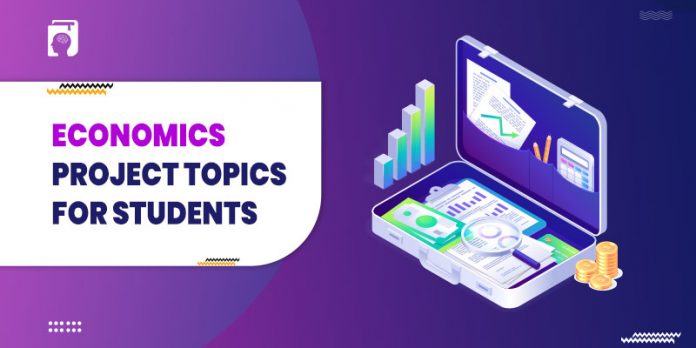
Let Duniakagyan walk you through a few ideas for the economics project topics. What to include, tips, reference links, and cover-page design ideas are also there to make things easier for you.
Over the past few centuries, human civilization has grown exceedingly complex. Unlike the primitive bartering systems used in the past, we now deal with a global economy with many moving parts to it. That necessitates the handling of money, business, industry, and other related dynamics. And that’s precisely what you are studying in your 12th or undergraduate economics program.
There’s no better way to learn economics (or any subject) than through projects. That’s why schools and colleges ask students to complete an economics project. Thankfully, it is a multi-disciplinary subject combining history, political science, and sociology. Plus, it’s dynamic, meaning it evolves with time. So, you have immense scope for project research on the subject.
If you, too, have a project, read on – as we discuss the best economics topics for a college project. What to include, tips & tricks, reference links, and cover-page design ideas are just a bonus.
10 Best Economics Project Topics for College Students
1. best economics project topics: pandemic and the global economy .
COVID-19 was harsh on us all. Every nation and every industry suffered. The world saw extensive lockdowns that brought the global economy to a grinding halt. With little to no international trade, the economies struggled to sustain themselves. Even after the pandemic is over, governments are having a hard time dealing with the short-term & long-term implications of the economic disaster.
The “impact of the pandemic on the global economy ” could be among the best college or class 12 economics project topics. You have plenty of scope for research with ample info available online.
What to Include?
Click here for a few economics project ideas you should include for an impressive project. ( https://docs.google.com/document/d/1k7A2TWhMgCpmoOBo4vEv3BffdFaAxuGXO1W0NkkV-OE/edit )
Tips & Tricks :
Since stats add authenticity to claims, ensure putting plenty of them wherever required.
Reference Materials :
- The World Bank: The economic impacts of the COVID-19 crisis ( https://www.worldbank.org/en/publication/wdr2022/brief/chapter-1-introduction-the-economic-impacts-of-the-covid-19-crisis )
- Statista: Impact of the Pandemic on the Global Economy – Statistics & Facts ( https://www.statista.com/topics/6139/covid-19-impact-on-the-global-economy/#topicOverview )
- Frontiers: COVID-19 outbreak: Impact on Global Economy ( https://www.frontiersin.org/articles/10.3389/fpubh.2022.1009393/full )
- Wikipedia: Economic Impact of the COVID-19 Pandemic ( https://en.wikipedia.org/wiki/Economic_impact_of_the_COVID-19_pandemic )

2. Best Economics Project Topics: Demonetization

When GOI announced NOTEBANDI (demonetization) on 8th November 2016, the Rupees 500 and 1000 denomination banknotes became obsolete. The idea was to bring down corruption, narco-trade, circulation of counterfeit currency, and terror funding. It was a big step with far-reaching impact. As such, it is a great idea for economics class 12 projects as well as college projects.
What to Include?
As one of the best economics project topics, there’s a lot to include in the project. ( https://docs.google.com/document/d/17Ff-hOqd8O8lZL05NMMncfurgDIq69-of3_3kiHmg7I/edit )
For an impactful economics project, you should mention the strikes, stock market crashes, deaths due to cash shortages, reduction in human trafficking and money laundering, and lastly, increased tax net in different sections. Ensure to include pictures of old and new currency notes for a stronger impression. If time permits, you can even talk about how it helped the spread of digital payments.
- Investopedia: Demonetization: Meaning, Example, and How It Works ( https://www.investopedia.com/terms/d/demonetization.asp )
- The Great Indian Demonetization: Amartya Lahiri (PDF) ( https://pubs.aeaweb.org/doi/pdfplus/10.1257/jep.34.1.55 )
- Wikipedia: 2016 Indian Banknote Demonetization ( https://en.wikipedia.org/wiki/2016_Indian_banknote_demonetisation )
3. Best Economics Project Topics: GST
One Nation, One Tax, and One Market! It served as the baseline for Goods and Services Tax ( GST ) when enacted on 1st July 2017, just 8 months after demonetization. Think of GST as a destination-oriented tax applicable at multiple stages. With the implementation of GST, indirect taxes just vanished. Given its complex structure, GST is too complicated for the common man to understand.
You can choose this topic for your next economics project in class 12, 11, or college with proper research. It’s an opportunity to deconstruct the complexity of this tax law for easy understanding. The knowledge, thus acquired, will come in handy if you plan to pursue chartered accountancy.
- The prime motive behind GST
- Types of GST with Explanations and Implications
- Inclusions and Exclusions
- Recently Implemented Changes in GST
- Tax laws before GST
- GST and price reductions
Research the latest amendments and guidelines laid down by the GST Council. Also, it’s important to mention how GST has helped or hindered India’s economic growth. Use plenty of stats and charts.
- BASICS OF GST (PDF) : https://wirc-icai.org/images/material/BASICS-GST.pdf
- Department of Revenue: FAQs on GST (PDF) ( https://dor.gov.in/sites/default/files/GST_FAQ.pdf )
- CBIC: GST Concepts & Status: PDF ( https://gstcouncil.gov.in/sites/default/files/GST-Concept%20and%20Status01062019.pdf )
4. Best Economics Project Topics: Digital India
The Digital India Movement is transforming India digitally. And the transformation is evident in the virtual field. People paying via cards and money transfer apps is a common sight now. Even the man of the street is accessing Government services electronically from their PCs and gadgets, and India is on the cusp of emerging as a knowledge economy. It’s all thanks to this flagship program of GOI.
Why not base your next economics project for college on the Digital India initiative? The Digital India Project class 12 or college will help you understand how disruptive technology like the internet can change things for good. plus, you have plenty of information available online and offline.
Your Digital India project for class 12 should include these sections: ( https://docs.google.com/document/d/1M3weZ10W6_X7pSSFG5a36aG_2_MnDUNEMVlIfDBWz5w/edit )
Describing a few success stories or examples of how Digital India has transformed specific sectors is a good idea. It will help readers gauge the significance of the initiative in the long term.
- GOI: Digital India (PDF): ( https://www.meity.gov.in/sites/upload_files/dit/files/Digital%20India.pdf )
- Wikipedia: Digital India ( https://en.wikipedia.org/wiki/Digital_India )
- Byjus: Digital India – Challenges, Advantages, Digitalization : ( https://byjusexamprep.com/upsc-exam/digital-india-upsc#toc-5 )
5. Best Economics Project Topics: Globalization
Wondering what is globalization? Countries, industries, economies, cultures, and societies cannot grow in isolation. They require global interaction and integration through international trade and partnerships. This interdependence is known as globalization. Herein, people, ideas, technologies, goods & services move freely across geographical borders to benefit one another.
While globalization has shaped the modern-day world, it has its share of trade-offs. That makes globalization one of the simple yet exciting economics project topics for degree students and economics class 12 project. You can consider it if you don’t want to put in much time and effort.
What to include?
- Globalization Characteristics
- Positive Effects and Implications
- A Brief History of Globalization
- Future of Globalization
Tips : Take a holistic approach while discussing the effects and implications. It is advisable to include how globalization impacts people, economies, countries, technologies, and more to get a bigger picture.
6. Tax Reforms
Taxes have a direct impact on most of us. An economics project on tax reforms is always recommended. You will have a lot to discuss, such as revenue enhancement reforms, why there’s a need for reforms in India and more. Later you will need to debate what effect the reforms will have on the economic climate. A few subtopics that need to be discussed include:
- Fiscal policy of India
- Fiscal system
- Indirect and Direct taxes
- Tax evasion
- Subsidies, etc.
7. Standard of Living (SoL)

“Standard of Living” is the measure of the material wealth and sources of comfort an individual or group in a given geography possesses. Typically, SoL is determined on a variety of criteria, such as income, occupation, education, healthcare, nutrition, environment, and other material situations.
Do not mistake Sol for Quality of Life (QoL), as they are two different things, although used interchangeably. While SoL is all about material aspects of life, QoL takes into account intangible aspects like life satisfaction, self-reported happiness, subjective well-being, and cultural factors.
Typically, you can use the following in your Economics Project Topics on Standard of Living : ( https://docs.google.com/document/d/1_TA8R4iQBRFpAAtVgG7ESZqB8gr5oTEHUyJ-FSN2lAo/edit )
You must take a mixed group of individuals for your project and include a selected group’s objectives and income level. Also, factor in literacy rates, the economic status of that area, poverty, employment facilities, political controls, and more to get a holistic idea of the standard of living.
- Wikipedia: Standard Of Living: ( https://en.wikipedia.org/wiki/Standard_of_living )
- Discussing Approaches to Standard of Living (PDF) : https://www.researchgate.net/publication/332257785_Discussing_Approaches_to_Standard_of_Living
- Investopedia: Standard of Living Definition, How To measure: ( https://www.investopedia.com/terms/s/standard-of-living.asp#:~:text=Standard%20of%20living%20generally%20refers,personal%20liberty%20or%20environmental%20quality .)
8. Government Budget
The Union Budget is presented by the Department of Economic Affairs of the Ministry of Finance. Earlier, it was presented in two categories – Railway Budget and General Budget. However, since 2017, it has been merged into the General Budget, presented once a year. It is relevant, dynamic, and has a lot of scope for research, which makes it a good economics topic for a college project.
You can consider this evergreen economics project topic and include the following: ( https://docs.google.com/document/d/1ubRRMUsGpe2148zRsNj1mLSnG0MS8JHgGEDNRkithbo/edit#heading=h.xt489xlety1o )
You can also cover current issues like the ‘Impact of COVID-19 on the Union Budget’, the ‘Rise in Petrol Prices,’ and the ‘Black Economy,’ etc. Also, discuss the challenges faced by the government in balancing its budget. This will add value and nuance to your economics project work.
- GOI: Union Budget ( https://www.indiabudget.gov.in/ )
- Wikipedia: Government Budget : ( https://en.wikipedia.org/wiki/Government_budget#:~:text=A%20government%20budget%20is%20a,correspond%20with%20the%20calendar%20year .)
- Drishti IAS: Government Budgeting (PDF) : https://www.drishtiias.com/pdf/1591800322-government-budgeting.pdf
9. Poverty and Unemployment Alleviation Programmes
Poverty is the most pressing issue that the world is facing currently. As an economics student, you must be aware of how poverty and unemployment go hand in hand. You take care of one, the other takes care of itself. No wonder, the government of India, from time to time, comes up with various different programs that address the issue of poverty through employment.
It is a good idea to base your project on the “Poverty and Unemployment Alleviation Programs. This is one of the best economics project topics for learning and grades at school and college levels.
What to include?
- Jawahar Gram Samridhi Yojana
- Swarnjayanti Gram Swarozgar Yojana
- The Employment Assurance (EAS)
- Pradhan Mantri Gramodaya Yojana
- Annapurna Yojana
- National Social Assistance Scheme
- National Maternity Benefit Scheme
- NOAPS, IRDP, and NREGA, etc.
10. Environmental Pollution
Our environment is vulnerable to pollutants. When the exposure to toxicity is prolonged, the environment degrades. Environmental pollution comes in all shapes and sizes, from air and sound to water and nuclear pollution. It’s the easiest and the most common class 11 economics and EVS projects for class 12.
- Cost-Benefit Analysis of Pollution
- Environmental Laws
- Environmental Acts
- Purpose to Save the Environment
Tips : You can add types of pollutants, causes of environmental pollution, and more. However, don’t elaborate much on these to avoid making the project too generic.
Economics Project Cover Page Design Ideas & Tips
Now that your economics project is done, it’s time to design a cover page. Mind you, colleges often require you to present the project with a cover page featuring all essential information regarding the project. Plus, a well-designed cover page can attract attention and good grades, even if it isn’t a compulsory part of the project. After all, it’s the first thing your professor will notice when presented with the project. When high stakes are high, you cannot ignore the design of the economics project cover page. So, here are a few proven ideas to help you develop an engaging cover page.
Tip 1: Provide the required info
The cover page is all about giving insights into the project. So, it should feature all key info, including:
Tip 2: Keep it clear and precise
While it’s crucial to state the aim of the project and a description, avoid stuffing too much info on the cover page. Instead, keep it clear, precise, and creative. You are better off choosing an appealing page clipart when designing in MS Word. It shouldn’t be flashy, ambiguous, untidy, or unacademic.
Tip 3: Keep the dimensions right
The size of the cover page is an important consideration. Anything too big or small will reflect poorly on you and undermine your effort. The thumb rule is keeping it smaller than the project’s main body.
Tip 3: Format it right
An attractive cover page is one with the proper formatting. Unless specified, you are better off with the Times New Roman font with the standard 12-point. Ensure the text is double-spaced for more precise reading. Also, capitalize the first letter of each word in the title, except for the propositions and articles.
Economics shapes our world and choices. However, to know what Economics is, we need to know what isn’t Economics. It doesn’t involve finances or how to make fortunes. Even though some economists in bow-ties might preempt the future of a particular economy, it’s never the prime concern of economics. Instead, the subject is all about people and the decisions they make.
Speaking of decisions, we must have helped you choose economic project topics that meet your learning and other needs.
That was our list of top 10 economics project ideas. Hopefully, you will find a topic for your project quickly that meets your learning and other needs. When doing the project, you’ll develop a deeper understanding of the topic, which is, of course, the end goal of this activity.
People are also reading:
- 10 Best History Project Ideas for Students
- Top 10 Computer Science Project Ideas
- Economics Project Topics for Class 12th Student
- Sociology Project Topics Idea for Students
- Best Political Science Research Topics
- Best History Project Topics for Class 12
- History Project Ideas for Class 10
- Chemistry Project Ideas for Class 12th
- Best Geography Project Ideas
- Best Maths Projects
More from this stream
Most Expensive Buildings in the World
Top 10 museums in mumbai, top unicorn companies in india, 9 best omegle alternatives in 2024, barmer – history & best places to visit | things to do, sariska national park | things to do | best time to visit.
Terms of use
Privacy Notice
© Copyright - All Right Reserved to Duniakagyan
16 Economics Project Ideas for High School Students

Indigo Research Team

Economic projects teach high school students the basic principles of economics and their practical application. Here are a few fantastic economics project ideas that will help you understand concepts related to government regulation, entrepreneurship, market competition, and scarcity. So, let’s get started.
Top Economics Project Ideas For High School Students:
1. small business economics.
If you’re looking for economics project ideas that will sharpen your entrepreneurial skills, you could opt for small business economics. Understand how small businesses run in your country.
The first step is to study market trends, you must know the needs and wants of your local community. Then learn how much money an entrepreneur needs to start and run a small business. Interviewing small business owners can help you understand how they make important decisions such as setting prices of their services and products.
After doing this project, you’ll be able to discover different strategies that small business owners use to overcome challenges and become successful. This economic project can turn your idea into a clear road map and may become an additional source of income in the future.
2. Inequality of Income and Wealth
Income and wealth inequality are among the biggest global issues. The economics project idea will allow you to explore causes and consequences. You’ll also be able to propose solutions to social injustice. Conduct research and learn how income or wealth are distributed in your society. Analyze trends and find key factors that are involved in this issue such as education, healthcare, and housing.
You can read case studies of different countries that have overcome income and wealth inequality. Read their policies, learn lessons, and then develop policies for your community to address income and wealth inequality. Create a public awareness campaign on social media to promote social justice.
3. Economic Policy Analysis
Policy analysis is one of the trending project topics in economics. Explore the impact of different forms of government decisions on economies. You can use SWOT analysis to examine the Strengths, Weaknesses, Opportunities, and Threats of a policy.
First of all, choose a policy such as tax reduction, a stimulus package, or a raise in the policy interest rate and then analyze it. Move on to assessing its impacts on economic factors like employment, price levels, and GDP growth rate. List down all the benefits and drawbacks of your chosen policy. Then, create your strategy by incorporating the insights gained from your assessment. This strategy should implement your chosen policy and use all the data collected in it.
4. Labour Market Dynamics
This economics project focuses on jobs and unemployment. High school students can begin by scrutinizing the causes and the impact of unemployment. Determine whether technical progress, economic decline, or other factors contribute to unemployment. Once data is gathered, suggest solutions to address unemployment issues. The solutions should show how to keep the job market stable and showcase your understanding of the data.
5. Sports Economics

If you are a sports lover, this would be a perfect economic project topic. Explore different sports and discover how these events play an important role in our economy. You’ll learn how tournaments promote local industry and examine the additional job opportunities for athletes, coaches, and people who sell tickets and snacks.
Analyze the effects of the local team’s success and failure on small businesses and the overall economy. Also, discover the influence of sports on the tourism and advertising industry.
6. Economic Forecasting
High school students can use current data to create economic forecasts. This economic project will enable you to predict how our economy will change in the future.
Act as a detective and collect facts about the economy such as job opportunities, rates of goods, and average expenditures of a citizen. The next step is to understand the behavior of the economy by looking at previous data. Then make predictions about job openings, prices, and other stuff. This project will allow you to prepare your country for coming challenges. You can summarize your prediction in a PowerPoint presentation.
7. Global Trade Analysis
This engaging economics project is about international trade. Start by researching the negotiating process of countries for acquiring goods. Choose any two countries, then thoroughly study the goods they trade, focusing on how it affects their economies. Look into the benefits and drawbacks of the trade conducted. After collecting all the data, you can make policy recommendations addressing the issues in international trade.
8. Gig Economy
Exploring the gig economy is an outstanding project for economics because it is full of opportunities for high school students. Unlike 9-5 jobs, work is done on a project basis so a student can build a side hustle if they truly understand the gig economy.
First of all, collect stories on successful people doing gig jobs. You can interview freelancers, delivery boys, and online content creators. List down the pros and cons of part-time jobs. Analyze the overall impact of gigs on the local economy. Then predict how gig jobs will change in the future.
9. Consumer Behavior Study
For this economics project, you need to pick a product, such as sneakers, smartphones, or anything else. Research the factors shaping customer purchase choices and explore advertising, branding, and social influences. Conduct surveys and analyze trends to uncover the drivers behind consumer preferences. Culminate the project by formulating actionable strategies to enhance understanding and awareness of consumer decision-making in your chosen product category, and present your findings in a detailed report or presentation.
10. Inflation Investigation
Explore the impact of inflation on purchasing power in this project for economics. Start by checking historical inflation rates and track increases in prices. Calculate the rising cost of goods over time. Then, examine how inflation affects people and the economy.
Uncover hidden factors influencing spending habits like psychological responses and wage-price spirals. For instance, individuals might adjust their spending due to inflation fears, anticipating further price hikes. Develop a contingency plan to adjust pricing or diversify product offerings based on market conditions.
11. Game Theory Application
This project is for students who want to be strategic masterminds! It's time to apply your skills in the world of game theory. Develop a concrete plan, predict your opponent's moves, and implement your strategy.
Explore ideas from game theory, such as the prisoner's dilemma, dominant strategies, and Nash equilibrium. You will better grasp the rationale for strategic decision-making and choose this topic for an economics research paper. Culminate your research with a comprehensive report and incorporate visuals in your PowerPoint presentation.
12. Healthcare Economics
This project for economics looks into the impact of healthcare prices and availability on people in any country you choose. First, investigate variables like insurance and government policies for healthcare. Analyze how these factors affect people's access to and affordability of healthcare. Make a strategic plan based on your findings, outlining recommendations for improving healthcare accessibility and affordability. Recognize the direct link between human health and economic elements.
13. Behavioral/Experimental Economics
Have you ever thought about the possibility of combining psychology and economics? Behavioral Economics Experiment is one of the best economics research topics for undergraduates.
Identify the biases one may have, such as being overly focused on winning or merely observing evidence that supports current beliefs. Perform experiments involving financial decisions with biased factors.
Pick a diverse sample of people whom you can research in great detail. Focus closely on the numbers and try to find patterns with which these deceptive biases are associated. The aim is to discover the connection between one’s behavior and their financial costs.
14. Monetary Policy
Monetary policy is one of the best economics fair project ideas that will help you stand out in class. In this project, you will analyze central banks and their monetary policies. Investigate the power of a given sovereign bank within an economy, for example, European Central Bank or Federal Reserve. You need to look at their policies about the money supply and interest rates.
Note down their impacts on employment, inflation, and economic development. Discover how governments manage the money supply. You will know the techniques governments use to maintain a stable currency and survive a thriving economy.
15. Technology and Innovation
Technology is one of the trending economic project topics that can make your high school project successful. Investigate the economic effects of technology like AI, blockchain, or EVs. Examine their impact on different sectors, employment rates, and GDP growth. Analyze trends in research investment, job creation, and economic production. Summarize findings in a straightforward presentation. Consider using a basic PowerPoint format for clarity.

You can conduct interviews or surveys to gather insights from industry experts, adding real-world perspectives to your analysis. Add recommendations in your PowerPoint, suggesting potential policy implications. Your aim should be to help people understand how the advancement of technology influences the future economy.
16. Housing Market Analysis
Real estate is an interesting economics topic that will sharpen your creativity. Identify the factors that determine the increase or decrease in house prices. For that, you need to know how buyers and sellers work. The trends in real estate can be identified by choosing a city or region. Collect data on demographics, interest rates, selling prices, and house demand.
Analyze the details of the market including renting and buying trends and monetary shifts’ impact. Finally, propose practical strategies to communicate your findings.
Check out these cool economics project ideas. From pretending to run a market to figuring out how countries trade stuff, these projects make economics fun and easy.
If you're a high school student searching for economics research topics, consider joining the next IRIS Program. We offer an Economics course designed specifically for high school students aiming to boost their college applications with a research paper. The upcoming IRIS Program starts on July 8, 2024!
.png)
Fourteen economic facts on education and economic opportunity
- Download the full paper
Subscribe to the Economic Studies Bulletin
Diane whitmore schanzenbach , diane whitmore schanzenbach nonresident senior fellow - economic studies , the hamilton project @dwschanz david boddy , db david boddy research assistant megan mumford , and mm megan mumford senior research assistant, the hamilton project greg nantz gn greg nantz senior research assistant & publications coordinator, the hamilton project.
March 24, 2016
- 32 min read
There are many factors at work in determining educational outcomes; some of these are more easily addressed by policy reforms than others, and not all can be addressed directly within the K–12 education system. To illustrate the payoffs from increasing educational attainment, the challenges faced by our nation’s K–12 schools, and the promise of targeted childhood interventions, The Hamilton Project offers the following fourteen facts on education and economic opportunity.
Introduction
Education is a powerful force for advancing opportunity, prosperity and growth. Educational attainment is a significant determinant of a range of measures of well-being, including an individual’s likelihood of marrying, owning a home, or living a long life, as well as her likelihood of being arrested. Educational attainment is also a key determinant of economic success. A strong education system is fundamental to ensuring that all Americans have the opportunity to acquire the skills they need to thrive.
Read the full introduction »
The Hamilton Project supports policies that foster economic growth and broad-based participation in that growth. For the past decade we have emphasized that evidence-based improvements to public education are essential to the success of our economy and society. As the following fourteen facts demonstrate, the evidence makes an overwhelming case for policy changes in education.
Over the past three decades the gap in earnings between workers with high levels of education and those with less education has grown substantially (see Fact 2). For men, median real earnings increased only among those with college or advanced degrees: their earnings are 29 percent higher than they were in 1980. Men with less than a bachelor’s degree have seen their real earnings stagnate or decline, with an especially large drop among workers with the lowest levels of education. In contrast, women have seen their real median earnings increase across all education levels, with a nearly 40 percent increase among college-educated women. The share of young women with a bachelor’s degree has also increased over the past three decades, almost doubling for women age 25–34 from just 21 percent in 1980 to 39 percent in 2015. The rate of high school completion (including GED attainment) among young women also increased, rising 6 percentage points over this period to 91 percent. The share of young men who completed high school also rose, but by less than the gains among women (see Fact 3).
Over the past 20 years both high- and low-income students have made strong gains in math achievement, with the share of fourth-grade students scoring at or above proficiency in math in 2014 substantially higher than in 1996. In fact, low-income students’ proficiency rates tripled over this period. However, there remain large and persistent gaps in skills between high- and low-income students, as illustrated in figure A. Math proficiency rates among low-income students were still lower in 2015 than high-income students’ rates in 1996. Identifying ways to close these achievement gaps is perhaps the largest challenge facing K–12 education today.
Large differences in skills between high- and low-income students make it especially daunting to address disparities in student achievement, in part because these disparities reflect broader economic challenges such as the large share of children living in poverty and, in particular, the high concentration of poverty at the school level. In 2014 a majority of public school students nationwide attended high-poverty schools—defined as schools in which more than 40 percent of students are low-income (see Fact 6). At the state level, performance among low-income students declines as the share of low-income students in the state increases (see Fact 8). This may partly reflect differences in access to resources: while education spending overall has steadily increased each decade over the past 50 years (see Fact 11), spending is highly uneven across states because most local education budgets are funded by state and local revenues (see Fact 10). In fact, some northeastern states spend about twice as much per student as states in the South and West, even after adjusting for variation in cost of living.
There are several promising interventions that have been shown to improve test scores and high school graduation rates, especially among low-income students living in areas with high concentrations of poverty. The charter school sector serves a small but increasing share of students, and achievement gains among students attending these schools can be quite strong in some cases (see Fact 14). An emerging stream of evidence also shows that interventions aimed at younger children—such as preschool programs and class-size reduction in the early grades—can improve high school graduation rates (see Fact 12) and students’ later economic outcomes.
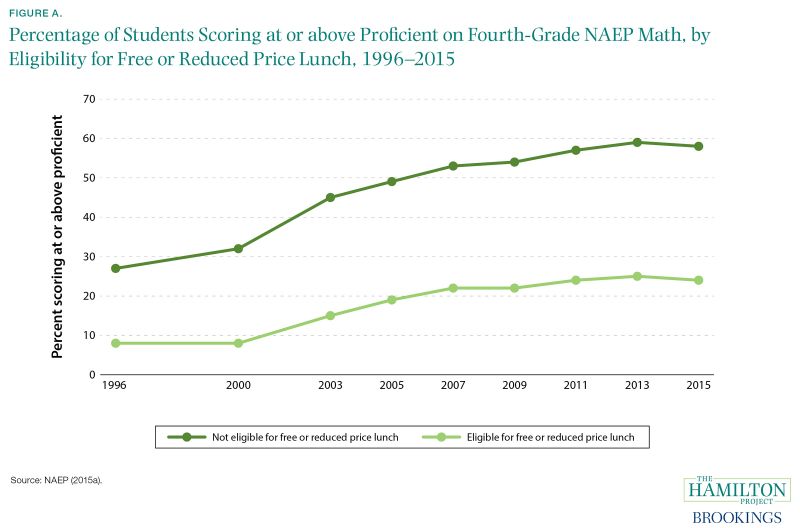
Chapter 1: The Payoff to Skills is High
Fact 1: both cognitive and soft skills—such as perseverance, tenacity, and social skills—play an important role in shaping economic outcomes..
Skills are an important determinant of workers’ earnings and employment opportunities. No test perfectly measures the skills relevant to economic success, but tests that aim to measure analytical ability often do correlate with outcomes in the labor market. For example, the left panel of figure 1 shows a correlation between scores on the Armed Forces Qualification Test (AFQT) and earnings in middle age. Stronger analytical skills as measured by the AFQT correspond to higher wages, resulting in the upward sloping pattern shown in the figure. A similar relationship holds for measures of a range of analytical skills, such as verbal reasoning and problem solving. As seen in the figure, the relationship between AFQT scores and earnings is different for men and women: a 10-point increase in AFQT is associated with about a 15 percent increase in earnings for men but an 11 percent increase for women. Skills measured as early as kindergarten have a positive impact on adult earnings (Chetty et al. 2011).
Employment outcomes also depend on soft skills—a bundle of character attributes (sometimes referred to as noncognitive skills) that includes motivation, perseverance, tenacity, creativity, self-control, and the ability to work productively in groups (Deming 2015; Heckman, Stixrud, and Urzua 2006). The right panel of figure 1 shows on the horizontal axis a combined index of three scales that measure social skills, self-esteem, and the extent to which a person believes that her own actions, as opposed to forces outside of her control, determine rewards and success in life. The upward sloping pattern indicates that, by this measure, those with higher noncognitive skills also earn more, on average. The relationship between this noncognitive index and earnings is similar for men and women: a 10-point increase in the noncognitive index is associated with about a 7 percent increase in earnings for both men and women. Emerging research has found that both cognitive and soft skills can be taught, but that the teachers who are effective at raising cognitive skills are not necessarily the same teachers who are effective at imparting soft skills (Jackson 2012; Kraft and Grace 2016).
It is important to note, however, that tests of both cognitive and soft skills are correlated with other factors that influence employment outcomes, such as educational attainment, parents’ income, and the neighborhood environment. This makes it difficult to measure precisely the relative importance of these other factors compared to skills in determining a young person’s later economic success. Compounding this difficulty is the fact that skill formation is a cumulative process in which experiences in early childhood and adolescence lay the foundations for future learning. This cumulative feature is partly attributable to perceptions of elf-efficacy: early success at learning not only makes later skill-building easier, but also shows that effort has rewards, which can create a self-reinforcing motivation to continue learning (Heckman 2006). The flip side is that impediments to early learning can have cumulative negative effects on later skill formation. Such obstacles are particularly troubling given that the effects of skills on economic outcomes reach far beyond earnings; early childhood test scores are correlated with high school graduation rates (see Fact 12), college attendance, marriage, home ownership, and retirement savings (Chetty et al. 2011).
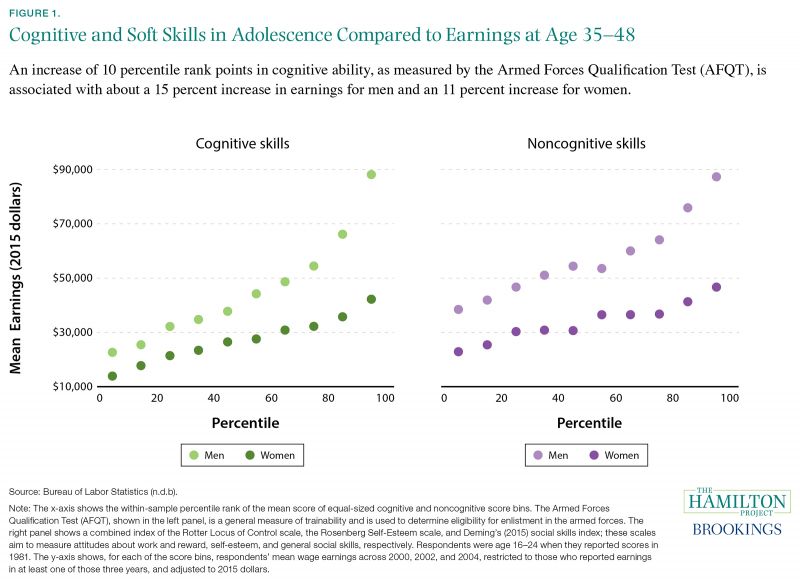
Fact 2: The skills premium has increased dramatically.
The gap in earnings between high-school-educated and college-educated workers has more than doubled in the United States over the past three decades (Autor 2014). Although a large number of developed countries show a similar trend, the United States appears to have the largest skills premium—that is, the gap between the wages of low- and high-skilled workers. In part, the magnitude of this gap reflects the fact that the inflation-adjusted earnings of workers with high levels of education have risen much more over the past 35 years than have the earnings of less-educated workers, as shown in figure 2. In fact, real earnings for men without a bachelor’s degree have actually fallen since 1980—and fallen dramatically for men with no high school diploma, whose earnings are down by more than 20 percent. Gains in earnings for women with a bachelor’s degree or an advanced degree were more than twice as large as those for women with a high school diploma, some college, or an associate degree. However, earnings for women at all education levels tended to increase at a higher rate than they did for similarly educated men. The differences may be partially explained by a lower initial level of earnings for women relative to men.
In recent decades the growing earnings premium for education has contributed substantially to the net growth of earnings inequality. Roughly two-thirds of the overall increase in earnings dispersion between 1980 and 2005 is accounted for by the rising returns to schooling—primarily the growing premium to postsecondary education (Goldin and Katz 2007). To exclude the effect of the very top and bottom of the earnings distribution on growing inequality, one can compare earnings at the 90th percentile of the wage distribution to earnings at the 10th percentile. This 90/10 ratio has also grown substantially in recent decades. Fully 95 percent of its growth between 1984 and 2004 was attributable to rising returns to education (Fortin, Lemieux, and Firpo 2011). In other words, if the education premium had remained constant, there would have been essentially no increase in wage inequality between 90th- and 10th-percentile workers.
Why has the education premium risen in recent decades? Economists continue to study this question, but a number of studies point to the interplay of supply and demand for skills. In The Race between Education and Technology, Harvard economists Claudia Goldin and Lawrence Katz (2008) make the case that the U.S. economy prospered during the twentieth century in large part because educational attainment kept up with the rising demand for skills, which was catalyzed by significant technological change. The labor market’s demand for analytical skills, written communications, and specific technical knowledge increased dramatically. Between 1900 and 1980 Americans kept pace by steadily increasing their level of education, reflecting in large part the country’s commitment to a secondary school system essentially free and open to all (Goldin and Katz 2008). Yet over the past three decades the rise in educational attainment has slowed, even as technological progress—and the corresponding demand for skills—has accelerated. Goldin and Katz (2008) succinctly capture the essence of the story: “In the first half of the century, education raced ahead of technology, but later in the century, technology raced ahead of educational gains” (p. 8).
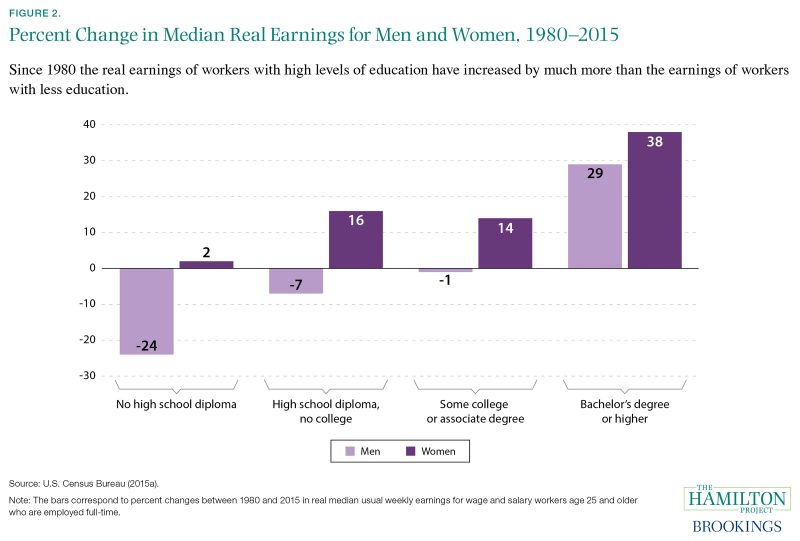
Fact 3: Educational attainment has increased in the United States, especially among women.
Despite a slowing pace, educational attainment in the United States has gradually risen over the past 35 years, as shown in figure 3. The share of young women with college degrees almost doubled, from 21 to 39 percent, and young women are now more likely than young men to have a college degree. As shown in Fact 2, this has coincided with large increases in the wage premium for women with college degrees. High school completion rates have also increased over this period. From 1980 to 2015 the share of American men age 25–34 that completed high school inched up from 86 to 90 percent, and rose from 85 to 91 percent among women.
Nonetheless, many researchers worry that skill levels among young people in the United States are far too low. Historically, successive generations have attained more education at a rate of approximately one additional year of schooling every decade; for example, individuals born in 1930 averaged about 11 years of schooling by the time they reached age 30, compared with 13 years for people born in 1950 (Goldin and Katz 2008). But for individuals born around 1950 and later, this pace was roughly cut in half, even though the economic returns to education have increased (see Fact 2). Individuals born around 1985, who were 30 years old in 2015, averaged 14 years of schooling.
There is concern among some researchers that public policies aimed at improving skills and educational attainment are too often evaluated on narrowly defined criteria such as conventional cognitive test scores. For example, in the 1960s the Head Start program was thought to have fallen short of its goals because it did not permanently raise the IQs of its participants. This kind of write-off may be premature in light of evidence from early childhood interventions such as the Perry Preschool Project, which had lasting benefits that were not picked up by conventional measures of cognitive ability (Schweinhart et al. 2005). In particular, by age 10 the IQ scores of the participants were no higher than those of the control group, but the participants did show more motivation to learn, and by age 40 they were more likely to have graduated high school, to be earning higher salaries, to own a home, to be less dependent on welfare, to have had fewer out-of-wedlock births, and to have not been arrested.
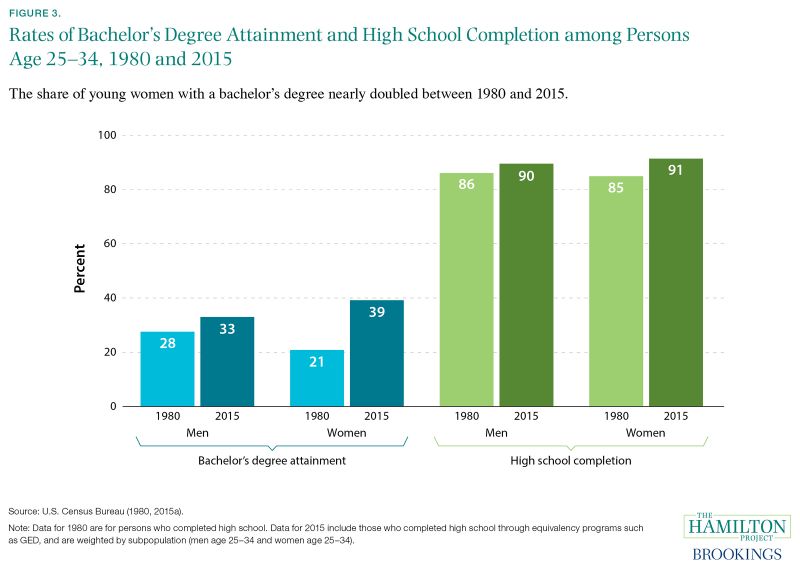
Fact 4: Americans who did not attend college form a larger share of those who live below the poverty line.
On average, more education decreases one’s likelihood of living in poverty. As shown in figure 4, the poorest Americans—with incomes below 100 percent of the federal poverty line, or below $24,000 for a family of four—are typically much less educated as measured by the highest educational attainment within the household. Fully one-fifth never finished high school, and over half have a high school diploma or less. Those with household incomes between 100 and 299 percent of the federal poverty line, or annual incomes between $24,000 and roughly $72,000 for a family of four, are much more educated: roughly four in ten have completed at least an associate degree, and only about one-third of them have a high school diploma or less. Among households earning 300 percent of the federal poverty line or more, over 90 percent have at least some college education. While education is a strong predictor of income, there is still considerable variation in education within income groups. For example, among households living below the poverty line, about 20 percent have at least one member who has completed an associate degree or more.
Shifts in the labor market help to explain the premium for college degrees. Workers lacking college degrees today are much more likely to be employed in low-wage, low-skilled occupations than were such workers in the past (Kearney, Hershbein, and Jácome 2015). For example, the share of working-age men without high school diplomas who were employed as operators and laborers—with median earnings of $25,500 in 2013—fell from 40 percent in 1990 to 34 percent in 2013. Meanwhile, the share working in food, cleaning, and grounds-keeping occupations—whose median earnings were $20,400 in 2013—almost doubled, from 11 to 21 percent.
Increasing one’s education is a good bet to increase one’s earnings. In an empirical simulation , Hershbein, Kearney, and Summers (2015) test what would happen to earnings if one-tenth of the men without a college degree were to obtain one. hey find that the decline in median earnings observed over the past three decades would be nearly erased, and earnings at the 25th percentile of the distribution would be 43 percent higher than they are today, thus helping to reduce inequality in the bottom half of the distribution.
Conditional on attaining a bachelor’s degree, the choice of what to study is also an important predictor of lifetime earnings. For the median graduate, total lifetime earnings range from close to $800,000 to more than $2 million depending on the major, as shown in a Hamilton Project economic analysis (Hershbein and Kearney 2014). Although there is substantial variation in earnings within majors, those that emphasize quantitative skills—such as engineering, computer science, economics, and finance—tend on average to have graduates with the highest lifetime earnings, while majors that train students to work with children or provide counseling services—such as early childhood education, elementary education, and social work—tend to have graduates with lower lifetime earnings. There is compelling evidence that effective teachers in early childhood impart large gains to society through their students’ subsequent gains in earnings and other life outcomes (Chetty et al. 2011). If low pay for teachers in early education dissuades potentially impactful workers from going into the field in the first place, the result could be costly to society in the long run.
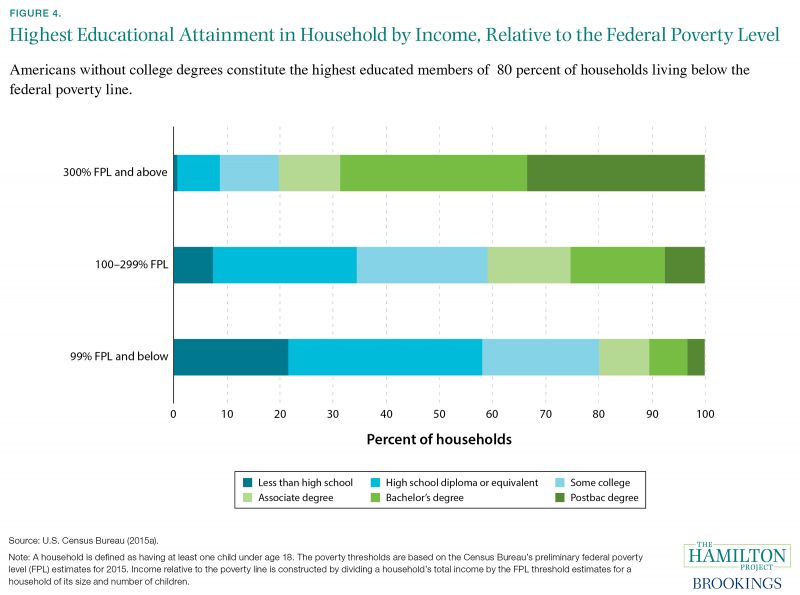
Fact 5: An additional year of schooling increases earnings and reduces the likelihood of an individual being unemployed, on welfare, or in poverty.
Measuring the direct effect of education on economic success is no straightforward task: not only does education improve skills, but students with higher skill levels are more likely to pursue further education. In other words, the education wage premium can be attributed partly to selection (the tendency that students who go on to college already have higher levels of cognitive and soft skills) and partly to treatment (the direct impact of additional years of schooling). As a result, it would be incorrect to infer that giving a college education to someone who would have otherwise obtained just a high school diploma would cause her earnings to increase by the size of the gap between high-school-educated and college-educated workers. However, research that isolates the causal impact of additional schooling does find that additional years of schooling improve outcomes.
To isolate the effects of educational attainment on earnings, Messacar and Oreopoulos (2012) take advantage of changes to state laws governing minimum school-leaving age. As shown in figure 5, one year of additional schooling lowers the probability of a student later being unemployed by 3.6 percentage points, of being on welfare by 5.5 percentage points, and of living below the poverty line by 8.1 percentage points. Among those working at least 25 hours per week, an additional year of compulsory schooling is associated with a 10.7 percent increase in annual earnings. These results may be understated because education earnings gaps tend to increase with age and these results focus only on younger cohorts.
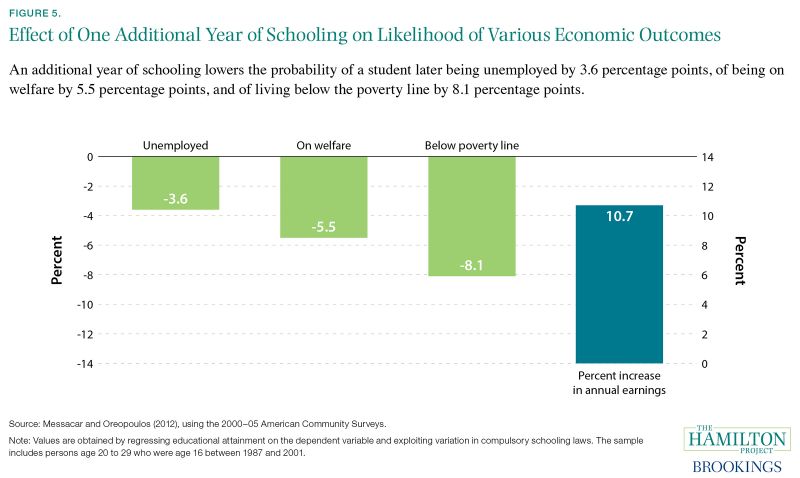
Chapter 2: The K-12 System Faces Serious Challenges
Fact 6: the majority of u.s. public school students—over 27 million children—attend a high poverty school..
Title I of the Elementary and Secondary Education Act (ESEA) of 1965 provides federal funding to schools either through targeted assistance to low-income students, or through a schoolwide program if at least 40 percent of the school’s students qualify as low income (based on local criteria such as eligibility for the free or reduced-price school lunch program or receipt of means-tested family assistance through the Social Security Act or Medicaid) (§ 1113). The U.S. Department of Education (ED) classifies schools with 40 percent or more low-income students as high-poverty schools (Lippman, Burns, and McArthur 1996, 18). In 2014 a majority of students nationwide—56 percent—attended high-poverty schools. The state with the highest share of students attending high-poverty schools is Mississippi, at nearly 92 percent, and the state with the lowest share is Minnesota, at roughly 17 percent. As shown in figure 6, southern states tend to have the largest shares of students attending high-poverty schools.
School poverty concentrations are a strong predictor of school achievement averages (Kennedy, Jung, and Orland 1986; Murnane and Steele 2007), and concentrations of low-income students lead to a variety of challenges for a state’s public school systems. Research demonstrates that concentrations of low-income students are more expensive to educate across several dimensions (Downes and Pogue 1994; Duncombe and Yinger 2004). For example, schools with high shares of low-income students have higher teacher attrition rates due to difficult working conditions such as larger class sizes and lower-quality facilities (Greenlee and Brown 2009; Murnane and Steele 2007). Schools with high concentrations of poverty also face higher student turnover because low-income students tend to change schools more often (National Center for Education Statistics [NCES] 1996, figures 3.14). Title I of ESEA provides supplemental funding to school districts with large numbers or concentrations of low-income students.
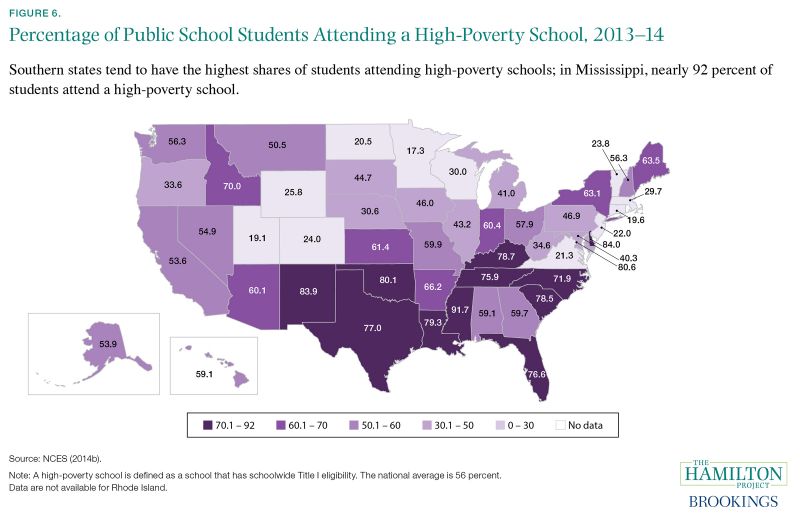
Fact 7: On average, states with higher concentrations of children in poverty receive less antipoverty (Title I) funding per child.
Title I of ESEA is the primary source of federal funding for schools with high concentrations of poverty. The purpose of Title I, particularly its schoolwide program, is to allocate more money to schools with concentrations of poverty. As discussed in Fact 8, low-income students are more likely to struggle in school and require additional support. However, the negative trend in figure 7 shows that states with higher shares of low-income students receive less Title I funding per eligible student. Because Title I is the primary mechanism for the federal government to distribute school funds across states, this negative relationship is counterintuitive and suggests that the funds may not be targeted appropriately in the status quo.
The negative relationship between share of students eligible and funding per eligible student is due in large part to the interaction between Title I’s chronic underfunding and the complex Title I formulas that distort allocations in the absence of full funding. For example, to fully fund the Basic Grants portion of Title I in 2015 would have required $50 billion in allocations; Congress instead appropriated only $6.5 billion. A new Hamilton Project policy proposal by Nora Gordon, “Increasing Targeting, Flexibility, and Transparency in Title I of the Elementary and Secondary Education Act to Help Disadvantaged Students” (2016) discusses the causes of this dilemma and offers potential policy solutions. Gordon explains that a small state minimum leads to states such as Vermont receiving a disproportionate level of Title I funding. Additionally, a provision known as hold harmless, which allows districts to continue to receive allocations based on allocations received in previous years, prevents Title I funding from adapting quickly to structural changes in poverty levels across states and districts.
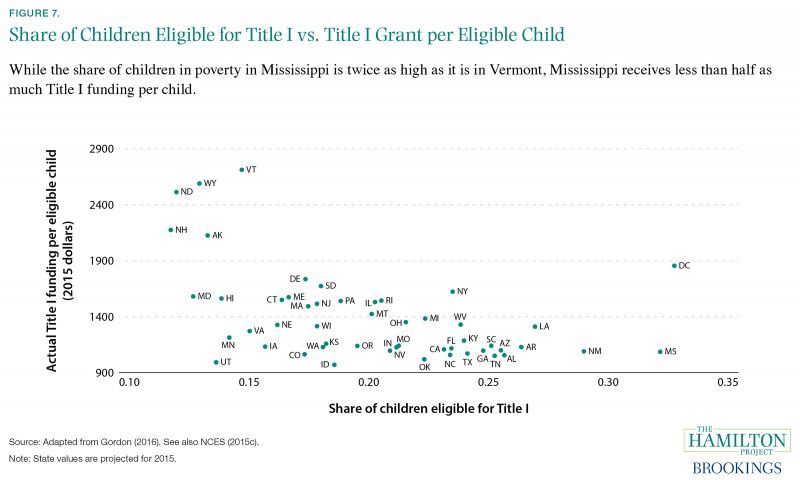
Fact 8: Average performance among low-income students declines as their population share increases.
High poverty concentrations pose a challenge, in part because average test scores among low-income students decline as the share of low-income students increases. The graph demonstrates that, on average, a 10 percentage point increase in the share of low-income students in a state predicts a 2.3 percentage point decrease in the share of low-income students scoring at or above proficient on the National Assessment of Educational Progress (NAEP); a proficient score indicates “solid academic performance,” positioned between the basic and advanced levels (NAEP 2015a). The national average for the share of low-income students scoring proficient or better is 18 percent, compared to 48 percent for the rest of the student population. In states with high concentrations of low-income students, this figure is as low as 7.4 percent.
However, some states with similar shares of low-income students have very different levels of proficiency. For example, Connecticut, Massachusetts, and New Jersey all have a share of low-income students that is just under 40 percent, but there is a difference of nearly 20 percentage points in the share of low-income students scoring at or above proficient. While it is difficult to directly compare school quality across states, Connecticut has a school finance formula that is heavily reliant on local property taxes—leading to more funding for schools in high-value areas—and has been noted as one of the states with the largest achievement gaps between high- and low-income students across a variety of measures (NAEP 2015b; Zimmer and Hodgson 2015).
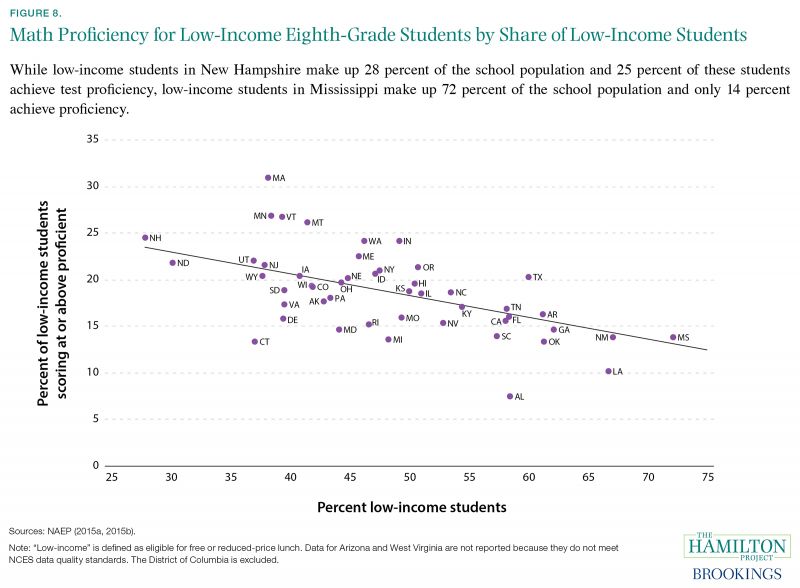
Fact 9: The salary of public school teachers has declined relative to other career options
Average earnings among women with college degrees have increased dramatically over the past 25 years. While the average female college graduate working full-time earned an inflation-adjusted $56,204 in 1993, by 2014 her earnings had grown almost 20 percent to $67,088. Teacher pay, on the other hand, has been stagnant over these years, dropping slightly from $58,048 to $56,689. As shown in figure 9, both college-educated women overall and school teachers in particular saw their wages decline through the Great Recession.
Although not all teachers are female, teaching remains the second-most popular occupation for women (U.S. Department of Labor [DOL] 2014), and three-quarters of public school teachers are female (NCES 2015a). As alternative labor market opportunities for women have expanded, teaching has become a relatively less attractive career path (Murnane and Steele 2007). The average starting salary for an education major in 2014 was $40,267, the only category to see a decline from the previous year (National Association of Colleges and Employers [NACE] 2014). This stands in stark contrast to 1960, when teachers earned on average 13 percent more than their fellow female college graduates, and even in contrast to 1980, when teachers earned 4 percent more (Hurley 2013).
Earlier work found that salary increases during the 1980s did not improve the quality of new teachers entering the profession (Ballou and Podgursky 1997). Since then, though, the accountability movement has realigned incentives so that schools today are more likely to be evaluated by student performance. As argued in Duncan and Murnane (2014), a well-designed accountability system can promote improvements in school practices, such as greater willingness to use resources and to work together in new ways to better promote students’skill development. As a result, salary increases may matter more today than they did in the past.
In a recent poll, 60 percent of undergraduate students reported some interest in a teaching career. When asked what policies might induce them to join the profession, the top responses included increasing pay for every teacher and, in particular, increasing pay for high-performing teachers (Hiler and Hatalsky 2014). The pay and prestige disincentives among the best and brightest to teach may pose an especially large problem for high-poverty schools, where work environment challenges associated with teaching in such schools, including lower parental engagement and leadership instability, further compound the opportunity costs to becoming a teacher (Simon and Johnson 2013). Emphasis on school accountability also increases pressure on teachers to improve student test scores and serves as a disincentive to working at a low-performing school (Murnane and Steele 2007). Among those who chose to teach directly after college, those who scored in the highest quarter on college entrance exams were less likely to be observed in the profession 10 years later than were those who scored in the lowest quarter; 13 percent of teachers reported leaving the profession altogether due to low pay (Alt and Henke 2007).
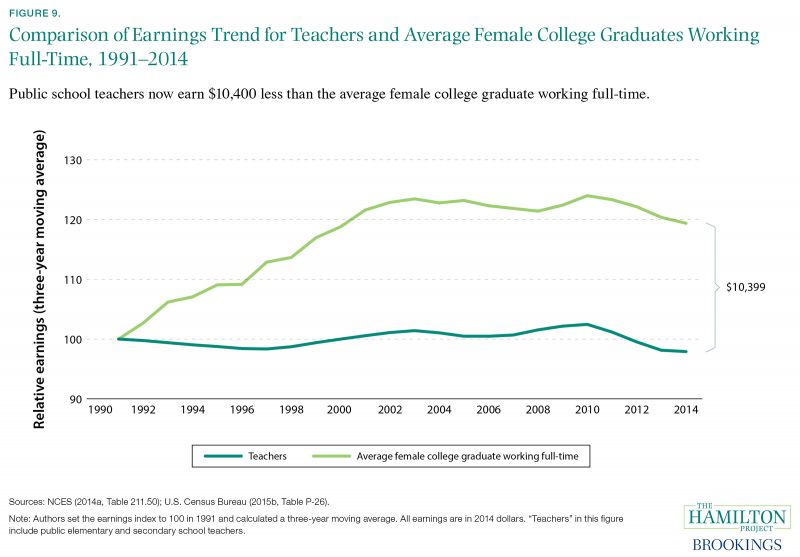
Fact 10: Spending on K-12 students varies substantially by state.
There is a large degree of variation in instructional spending across states. Instructional spending includes salaries and benefits for teachers, textbooks, supplies, and other purchased services for extra- and cocurricular activities (NCES 2012b). While schools in the Northeast spend $8,000 to $13,000 or more per student on instruction, schools in western and southern states typically spend much less (NCES 2012a). After adjusting for differences in living costs across regions (as proxied by variation in average earnings across states), the spending gaps narrow slightly but remain: northeastern states spend almost twice as much as western and southern states.
States predominantly rely on income and sales taxes for education funding, which can provide wealthier states more resources for education (Oliff and Leachman 2011). As a result of varying resources and preferences for education across states, a student in Vermont may receive as much as $95,000 more in instructional expenditures from kindergarten through 12th grade (adjusted for cost of living) than a student in Utah (NCES 2012a). Ensuring that students have equal access to a quality education across all states is a key rationale for federal involvement in school funding (Rentner 1999; ED 2012).
It is worth noting that spending also varies substantially within states and even within school districts (see Fact 11). The Every Student Succeeds Act (ESSA) of 2015 introduced requirements to report school-level spending, which will bring unprecedented transparency to these spending differences.
Fact 11: Most education spending comes from state and local revenues.
Federal, state, and local education spending for public elementary and secondary schools totaled $620 billion in 2012, the most recent year for which data are available. Although the population of students has grown by 40 percent since 1960, per-pupil spending has increased by 274 percent (NCES 2014a). Federal education funds flow to states primarily through grant programs, such as funding for low-income students through Title I of ESEA and special education grants through the Individuals with Disabilities Education Act (IDEA) of 1990. The federal role in funding education grew with the 2001 reauthorization of ESEA, known as the No Child Left Behind Act of 2001, and temporarily increased further with the economic stimulus package in 2009 through additional grants for Title I and IDEA, along with State Fiscal Stabilization Fund grants for education (ED 2009). Despite increases in the federal share of spending, from 6 percent in 1990 to a peak of 13 percent in 2010 and back to 10 percent in 2012, the vast majority of school funding comes from state and local levels.
Local school funding is predominantly raised from property taxes, which make up 81 percent of total school revenue (NCES 2015c). Since wealthy families tend to live in affluent communities, increasing the tax base and revenues for local schools, their children’s per-student spending is typically higher in these districts than in poor districts. As a result, revenues raised for school spending can differ dramatically due to differences in property values and tax rates. In Texas, for example, the Fort Sam Houston school district receives only $265 in local revnue per student, while the neighboring Alamo Heights school district receives $13,007 in local revenue per student (NCES 2012a).
In cases where variations in property values lead to wide disparities in local revenue for educational spending, state and federal funds can serve to offset these differences. Beginning in the 1970s, many states have reformed their school finance systems to address this inequality. Often reacting to mandates from courts that found local finance systems unconstitutional, states have moved away from funding based primarily on property taxes and have implemented state aid formulas that direct more money to low-income and low-tax-base school districts (Lafortune, Rothstein, and Schanzenbach, 2016). Once state and federal spending are included in the example of Texas school districts above, the gaps are reduced dramatically: total revenues per student in Fort Sam Houston are $14,640, compared with $15,607 in Alamo Heights.
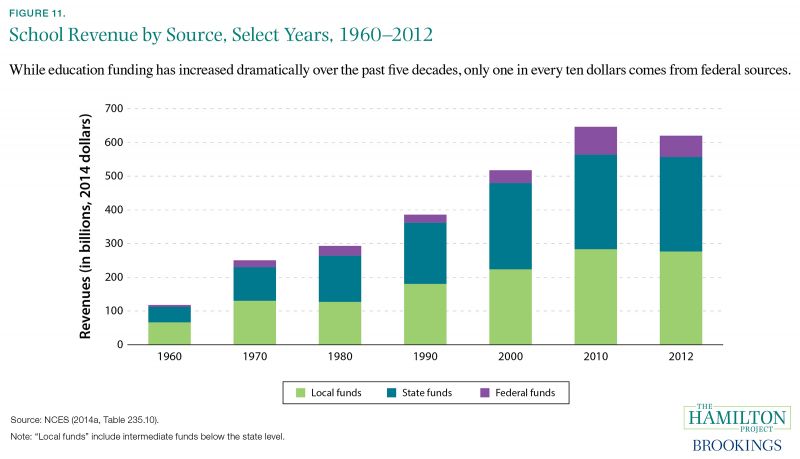
Chapter 3: Promising Approaches to Improve Educational Outcomes
Fact 12: early childhood interventions can raise high school graduation rates..
On average, a black child entering kindergarten scores 0.66 standard deviations in math (and 0.40 in reading) below her white peers (Fryer and Levitt 2006). By comparison, the income achievement gap is even worse: upon entering kindergarten, the difference in scores between a child from a household in the 10th percentile of the income distribution and a child from a household in the 90th percentile was more than two times greater than the black–white achievement gap (Reardon 2011). Furthermore, the income achievement gap remains as the child advances through school (Reardon 2011).
The persistence of these gaps suggests that intervening early in life may have lasting benefits, and that a number of early-life interventions, as shown by figure 12, may help children to develop the foundational cognitive and emotional skills needed to successfully complete later milestones, such as high school graduation (Murnane 2013).
Three programs focused on preschool-aged children have substantially improved high school graduation rates, especially among students at greater risk of dropping out. Head Start, the federally funded program targeting poor children between the ages of three and five with preschool, health, and social services, increased high school graduation rates among recipients by up to 20 percentage points, depending on the cohort and demographic group studied (Deming 2009; Garces, Thomas, and Currie 2002; and Ludwig and Miller 2007). Head Start particularly benefited black and Hispanic males, increasing their high school graduation rates by 5.5 and 18.1 percentage points, respectively. Furthermore, it is estimated that the Perry Preschool intervention, which provided high-quality preschool to black children, had positive effects on a number of outcomes, including increased earnings and lower rates of crime among participants. Preschool attendees graduated high school at rates 20 percentage points higher than nonattendees (Schweinhart et al. 2005). Targeting somewhat older children, the Tennessee Student/Teacher Achievement Ratio (STAR) experiment investigated the effects of being assigned to a small class size from kindergarten through third grade (Chetty et al. 2011). Black and low-income males experienced particularly sizeable gains in high school graduation rates from assignment to smaller classes (Murnane 2013).
In addition, early-life interventions outside of school settings have been shown to increase high school graduation rates. Recent work on cohorts born in the 1960s and 1970s has shown that access to the Food Stamp Program from the time of a child’s conception through age five increased high school graduation rates by 18 percentage points (Hoynes, Schanzenbach, and Almond 2016). The success of these childhood programs points to the lasting benefits of intervening well before students enter high school.
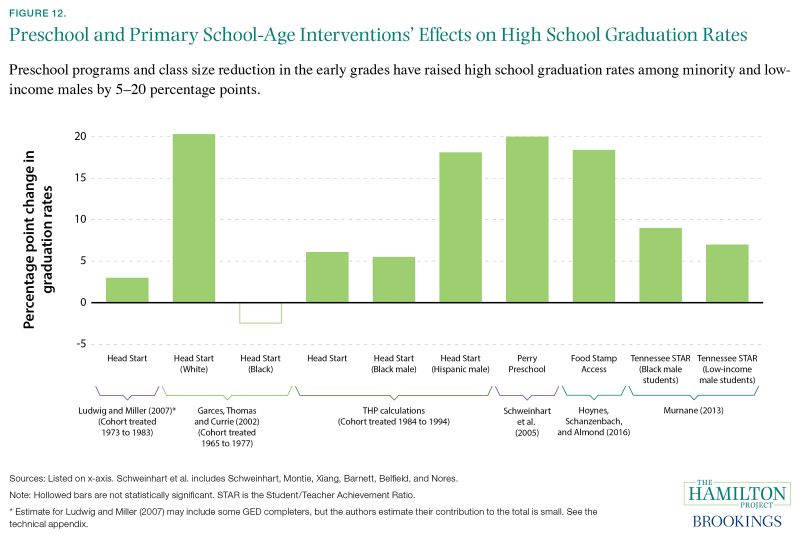
Fact 13: Interventions for older children are not too late—interventions during high school also raise graduation rates.
There is strong evidence that a variety of high school age interventions, most of them targeting students from low-income and minority backgrounds, have successfully increased high school graduation rates. Figure 13 graphs the percentage point increase in the high school graduation rate for several high school interventions, with the per-student net cost of the intervention displayed below the bars when applicable. Note that we do not mean to suggest that these are the only effective interventions, but instead that these are the interventions that have been rigorously evaluated.
Many of the interventions in the figure share the theme of expanded school choice (i.e., improving outcomes through the channel of where students go to school). They include school lotteries in Charlotte-Mecklenburg County Schools (which improved high school graduation rates by 14 percentage points), charter high schools in Florida and Chicago (7–15 percentage points), and the District of Columbia’s school voucher program (21 percentage points). Net costs for each of these interventions are hard to estimate, but are generally thought to be modest. New York’s small schools initiative has been successful in raising graduation rates (9 percentage points) particularly among black males (11 percentage points, or from 31 to 42 percent), a group that has historically had some of the lowest graduation rates (Bifulco, Unterman, and Bloom 2014). The additional cost per student per year of the small schools initiative was about $850, and falls to nearly zero when accounting for differences in teacher salaries and student populations (Unterman 2014).
Other interventions have focused on improving outcomes within schools. These interventions tend to be more limited in scope. Double-dose algebra, a program at Chicago Public Schools, requires students whose eighth grade math test scores place them below the national median to enroll in two algebra courses when they begin high school—regular algebra and an algebra support class (Cortes and Goodman 2014). At an estimated cost of less than $1,000 per student, students enrolled in the double-dose classes increased their graduation rates by 2.6 percentage points; however, these effects were only found for the highest-scoring students subject to the intervention, who scored just below the national median (Cortes and Goodman 2014). An intensive mentoring program at 11 high schools, most of them urban, has also improved graduation rates among low-performing youth (Rodríguez-Planas 2012).
An important recent paper documents the impact of court-ordered school finance reforms in the 1970s and 1980s on spending and subsequent student outcomes (Jackson, Johnson, and Persico 2016). A 10 percent increase in per-pupil spending during each year of schooling increases high school graduation rates by 10 percentage points. Although the additional funding was generally unrestricted, the study finds that school spending increases were associated with decreases in student-to-teacher ratios and increased teacher salaries.
Similar to the school choice interventions, it is difficult to extrapolate whether these programs would still be effective if they were more widely adopted both within and across school districts. Murnane (2013) highlights the central challenge facing education reformers: because of their limited scale, modest interventions—such as double-dose algebra—are more straightforward to implement and are easier to rigorously evaluate, but they do not address the underlying challenges facing less-advantaged students. Large-scale interventions, such as New York’s small schools initiative and some charter school models, may show some success at addressing the underlying challenges but are difficult to successfully replicate in other contexts. Improving the methods of evaluation and designing interventions for replicability are crucial to understanding what additional approaches work for improving high school graduation rates.
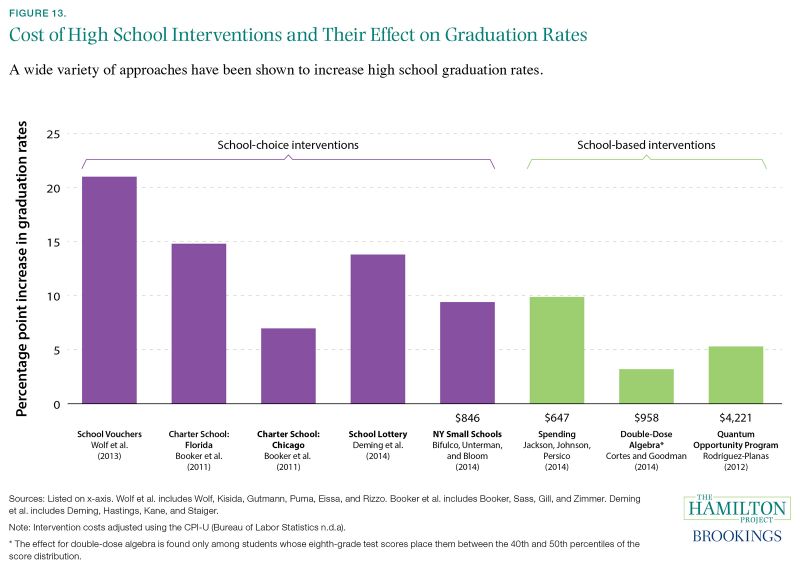
Fact 14: Several charter schools have been successful at raising student achievement, but gains are not universal.
Charter school enrollment has grown steadily over the past two decades, from about 400,000 students (1 percent of the student population) in 2001 to 2.3 million (4.5 percent of the student population) in 2013 (NCES 2015b). Charter schools differ from traditional public schools because they are subject to fewer regulations and typically receive a fixed funding amount per pupil (though total expenditures per pupil vary due to philanthropic support). Charter schools have greater scope to innovate, employing a variety of methods, such as different curricula, alternative class schedules including longer school days and “Saturday school” to increase instructional time, high-dose tutoring, and other approaches (Angrist et al. 2010; Fryer 2012).
This new approach has yielded some success: many urban charter schools are able to significantly improve test scores in math and English in one year. As shown in figure 14, middle school students attending urban charter schools in Massachusetts and New York have increased their math scores by roughly one-tenth to one-third of a standard deviation relative to their peers who attended traditional public schools. Such gains are substantial: in the case of the Harlem Children’s Zone charter schools, if the same gains were achieved for three years it would be enough to eliminate the black–white achievement gap (Dobbie and Fryer 2011).
However, evaluations of charters at the national level show that, on average, charter schools perform no better than traditional schools (Gleason et al. 2010). In Massachusetts, for example, nonurban charter schools appear to reduce test scores, which may be due to differences in curriculum or student demographics (Angrist, Pathak, and Walters 2012). These results suggest charter school expansion should be considered carefully, factoring in the composition and needs of the district’s student population, as well as the relative success of some charter school models over others.
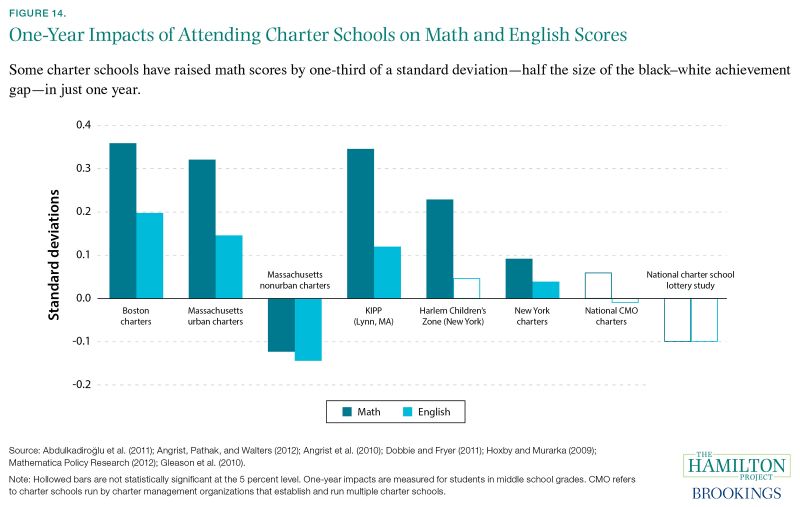
Related Content
Brad Hershbein, Melissa S. Kearney, Lawrence H. Summers
March 31, 2015
Michael Greenstone, Adam Looney, Jeremy Patashnik, and Muxin Yu, The Hamilton Project
June 26, 2013
Isabel V. Sawhill, Jeffrey Tebbs, William T. Dickens
April 30, 2006
Related Books
Robert Kagan
April 30, 2024
Daniel S. Hamilton, Joe Renouard
April 1, 2024
Michael E. O’Hanlon
February 15, 2024
K-12 Education
Economic Studies
The Hamilton Project
Modupe (Mo) Olateju, Grace Cannon
April 15, 2024
Phillip Levine
April 12, 2024
Hannah C. Kistler, Shaun M. Dougherty
April 9, 2024
- Undergraduate Project Topics
- MBA-MSC-PGD Project Topics
- OND/NCE Project Topics
- HND Project Topics

Call Us Today: 09159097300, 09067754232
- Hire A Writer
- Hire A Data Analyst
- Happy Customers
- OND/NCE RESEARCH PROJECT TOPICS
- HND RESEARCH PROJECT TOPICS
- UNDERGRADUATE PROJECT TOPICS
- MBA-MSC-PGD THESIS R...
Our Archives
- Accounting 745
- Accounting Education 12
- Actuarial Science 5
- Adult Education 11
- African Languages 4
- Agricultural Business And Financial Management 5
- Agricultural Economics 17
- Agricultural Engineering 3
- Agricultural Extension 3
- Agricultural Marketing And Cooperatives 11
- Agricultural Science 3
- Agricultural Science Education 1
- Animal Production 3
- Animal Science 5
- Archaeology And Museum 2
- Architecture 4
- Atmospheric And Environmental Physics 2
- Auditing And Forensic Accounting 9
- Banking And Finance 549
- Biochemistry 3
- Biology Education 16
- Biomathematics 2
- Brewing Science 5
- Building Technology 17
- Business Administration 476
- Business Education 18
- Business Management 33
- Chemical Engineering 4
- Chemistry 6
- Chemistry Education 6
- Child & Basic Education 14
- Child Right 3
- Civil Engineering 8
- Clothing And Fashion 1
- Commerce 10
- Communication Arts 7
- Computer Science 231
- Computer Science Education 17
- Cooperative And Rural Development 4
- Cooperative Economics 24
- Criminology And Security Studies 22
- Crop Production 9
- Crop Science And Environmental Protection 3
- Curriculum Studies 5
- Defence Studies 7
- Disaster & Risk Management 6
- Economics 362
- Economics Education 14
- Education 2182
- Education Foundation 18
- Education Management And Policy 4
- Educational Administration And Planning 9
- Educational Measurement And Evaluation 5
- Electrical Electronics Engineering 12
- Electronic Accounting 17
- Elementary Education 2
- Energy Economics 4
- English Language Education 16
- English Literary Studies 27
- Environmental Biology 2
- Environmental Geochemistry 1
- Environmental Geology 2
- Environmental Science 9
- Estate Management 44
- Ethics And Civic Education 2
- Fine & Applied Arts 5
- Fisheries And Aquaculture 2
- Food And Nutrition 3
- Food Science & Technology 21
- Forestry And Wildlife 2
- French Education 4
- Gender And Women Studies 5
- Genetics And Biotechnology 1
- Geography 2
- Geography Education 4
- Geophysics 1
- Guidance Counseling 12
- Health & Sex Education 5
- Health Economics 8
- Health Education 50
- Health Environmental Education And Human Kinetics 6
- Health Information Management 7
- History & International Relations 31
- Home And Rural Economics 7
- Home Economics 5
- Hospitality And Catering Management 11
- Human Resource Management 268
- Human Right 1
- Hydrogeology 3
- Industrial Chemistry 8
- Industrial Mathematics 1
- Industrial Physics 1
- Information Technology 17
- Insurance 16
- Integrated Science Education 8
- International Affairs And Strategic Studies 6
- International Law And Diplomacy 24
- Islamic And Arabic Studies 3
- Journalism 8
- Library And Information Science 5
- Linguistics 2
- Marine And Transport 3
- Marine Biology 1
- Marine Engineering 4
- Marketing 152
- Mass Communication 288
- Mathematical Economics 2
- Mathematics 15
- Mathematics Education 10
- Mba Finance 8
- Mechanical Engineering 6
- Medical And Health Science 13
- Medicine And Surgery 2
- Microbiology 17
- Office Technology & Management 11
- Petroleum Engineering 4
- Philosophy 38
- Physics Education 11
- Political Science 128
- Primary Science Education 2
- Production And Management 1
- Project Management 1
- Psychology 12
- Psychology Education 5
- Public Administration 35
- Public Health 29
- Public Relations 12
- Purchasing And Supply 11
- Pure And Applied Chemistry 1
- Quantity Surveying 13
- Radiography And Radiological Sciences 5
- Religious And Cultural Studies 7
- Science And Computer Education 7
- Science Laboratory And Technology 14
- Secretarial Studies 9
- Smes & Entrepreneurship 145
- Social Science And Humanities 1
- Social Studies Education 8
- Sociology And Anthropology 24
- Soil Science 3
- Staff Development And Distance Education 4
- Statistics 36
- Surveying And Geo-informatics 3
- Taxation 64
- Teacher Education 8
- Technical Education 1
- Theatre Arts 4
- Theology 17
- Tourism And Hospitality Management 56
- Urban & Regional Planning 13
- Veterinary 1
- Vocational Education 17
- MBA-MSC-PGD Thesis research materials
- Click Here For More Departments »
ECONOMICS EDUCATION UNDERGRADUATE RESEARCH PROJECT TOPICS AND MATERIALS
We can save you worthwhile time... its faster and easier when you search
LIST OF ECONOMICS EDUCATION UNDERGRADUATE RESEARCH PROJECT TOPICS AND MATERIALS
If you cannot find your desired topic among the listed topics call 09159097300,09067754232 Proceed to Hire a Writer » --> OR Call and our seasoned writer will get back to you. --> OR Click here to hire a writer Click here to hire a data analyst
Searching makes everthing so easy... get a hint
- ACCOUNTING 745
- ACCOUNTING EDUCATION 12
- ACTUARIAL SCIENCE 5
- ADULT EDUCATION 11
- AFRICAN LANGUAGES 4
- AGRICULTURAL BUSINESS ... 5
- AGRICULTURAL ECONOMICS 17
- AGRICULTURAL ENGINEERING 3
- AGRICULTURAL EXTENSION 3
- AGRICULTURAL MARKETING... 11
- AGRICULTURAL SCIENCE 3
- AGRICULTURAL SCIENCE E... 1
- ANIMAL PRODUCTION 3
- ANIMAL SCIENCE 5
- ARCHAEOLOGY AND MUSEUM 2
- ARCHITECTURE 4
- ATMOSPHERIC AND ENVIRO... 2
- AUDITING AND FORENSIC ... 9
- BANKING AND FINANCE 549
- BIOCHEMISTRY 3
- BIOLOGY EDUCATION 16
- BIOMATHEMATICS 2
- BREWING SCIENCE 5
- BUILDING TECHNOLOGY 17
- BUSINESS ADMINISTRATION 476
- BUSINESS EDUCATION 18
- BUSINESS MANAGEMENT 33
- CHEMICAL ENGINEERING 4
- CHEMISTRY 6
- CHEMISTRY EDUCATION 6
- CHILD & BASIC EDUCATION 14
- CHILD RIGHT 3
- CIVIL ENGINEERING 8
- CLOTHING AND FASHION 1
- COMMERCE 10
- COMMUNICATION ARTS 7
- COMPUTER SCIENCE 231
- COMPUTER SCIENCE EDUCA... 17
- COOPERATIVE AND RURAL ... 4
- COOPERATIVE ECONOMICS 24
- CRIMINOLOGY AND SECURI... 22
- CROP PRODUCTION 9
- CROP SCIENCE AND ENVIR... 3
- CURRICULUM STUDIES 5
- DEFENCE STUDIES 7
- DISASTER & RISK MANAGE... 6
- ECONOMICS 362
- ECONOMICS EDUCATION 14
- EDUCATION 2182
- EDUCATION FOUNDATION 18
- EDUCATION MANAGEMENT A... 4
- EDUCATIONAL ADMINISTRA... 9
- EDUCATIONAL MEASUREMEN... 5
- ELECTRICAL ELECTRONICS... 12
- ELECTRONIC ACCOUNTING 17
- ELEMENTARY EDUCATION 2
- ENERGY ECONOMICS 4
- ENGLISH LANGUAGE EDUCA... 16
- ENGLISH LITERARY STUDIES 27
- ENVIRONMENTAL BIOLOGY 2
- ENVIRONMENTAL GEOCHEMI... 1
- ENVIRONMENTAL GEOLOGY 2
- ENVIRONMENTAL SCIENCE 9
- ESTATE MANAGEMENT 44
- ETHICS AND CIVIC EDUCA... 2
- FINE & APPLIED ARTS 5
- FISHERIES AND AQUACULT... 2
- FOOD AND NUTRITION 3
- FOOD SCIENCE & TECHNOL... 21
- FORESTRY AND WILDLIFE 2
- FRENCH EDUCATION 4
- GENDER AND WOMEN STUDIES 5
- GENETICS AND BIOTECHNO... 1
- GEOGRAPHY 2
- GEOGRAPHY EDUCATION 4
- GEOPHYSICS 1
- GUIDANCE COUNSELING 12
- HEALTH & SEX EDUCATION 5
- HEALTH ECONOMICS 8
- HEALTH EDUCATION 50
- HEALTH ENVIRONMENTAL ... 6
- HEALTH INFORMATION MAN... 7
- HISTORY & INTERNATIONA... 31
- HOME AND RURAL ECONOMICS 7
- HOME ECONOMICS 5
- HOSPITALITY AND CATERI... 11
- HUMAN RESOURCE MANAGEM... 268
- HUMAN RIGHT 1
- HYDROGEOLOGY 3
- INDUSTRIAL CHEMISTRY 8
- INDUSTRIAL MATHEMATICS 1
- INDUSTRIAL PHYSICS 1
- INFORMATION TECHNOLOGY 17
- INSURANCE 16
- INTEGRATED SCIENCE EDU... 8
- INTERNATIONAL AFFAIRS ... 6
- INTERNATIONAL LAW AND ... 24
- ISLAMIC AND ARABIC STU... 3
- JOURNALISM 8
- LIBRARY AND INFORMATI... 5
- LINGUISTICS 2
- MARINE AND TRANSPORT 3
- MARINE BIOLOGY 1
- MARINE ENGINEERING 4
- MARKETING 152
- MASS COMMUNICATION 288
- MATHEMATICAL ECONOMICS 2
- MATHEMATICS 15
- MATHEMATICS EDUCATION 10
- MBA FINANCE 8
- MECHANICAL ENGINEERING 6
- MEDICAL AND HEALTH SCI... 13
- MEDICINE AND SURGERY 2
- MICROBIOLOGY 17
- OFFICE TECHNOLOGY & MA... 11
- PETROLEUM ENGINEERING 4
- PHILOSOPHY 38
- PHYSICS EDUCATION 11
- POLITICAL SCIENCE 128
- PRIMARY SCIENCE EDUCAT... 2
- PRODUCTION AND MANAGEM... 1
- PROJECT MANAGEMENT 1
- PSYCHOLOGY 12
- PSYCHOLOGY EDUCATION 5
- PUBLIC ADMINISTRATION 35
- PUBLIC HEALTH 29
- PUBLIC RELATIONS 12
- PURCHASING AND SUPPLY 11
- PURE AND APPLIED CHEMI... 1
- QUANTITY SURVEYING 13
- RADIOGRAPHY AND RADIOL... 5
- RELIGIOUS AND CULTURAL... 7
- SCIENCE AND COMPUTER E... 7
- SCIENCE LABORATORY AND... 14
- SECRETARIAL STUDIES 9
- SMEs & ENTREPRENEURSHIP 145
- SOCIAL SCIENCE AND HUM... 1
- SOCIAL STUDIES EDUCATION 8
- SOCIOLOGY AND ANTHROPO... 24
- SOIL SCIENCE 3
- STAFF DEVELOPMENT AND ... 4
- STATISTICS 36
- SURVEYING AND GEO-INFO... 3
- TAXATION 64
- TEACHER EDUCATION 8
- TECHNICAL EDUCATION 1
- THEATRE ARTS 4
- THEOLOGY 17
- TOURISM AND HOSPITALIT... 56
- URBAN & REGIONAL PLAN... 13
- VETERINARY 1
- VOCATIONAL EDUCATION 17
- MBA-MSC-PGD Thesis resea... 17
- Click Here For More Departments
Featured Posts
- SPINBOT: ARTICLE REWRITER AND THE QUALITY OF UNDERGRADUATE PROJECTS
- WHY STUDENTS MISTAKE CONCEPTUAL FRAMEWORK TO CONCEPTUAL LITERATURE
- THE DIFFERENCE BETWEEN JUSTIFICATION OF THE STUDY AND SIGNIFICANCE OF THE STUDY
- 6 TIPS ON HOW TO PRESENT AN UNDERGRADUATE SEMINAR PAPER
- PICO PROCESS: HOW TO DO STUDY PROTOCOL FOR UNDERGRADUATE PROJECTS
- SOLUTION TO THE CHALLENGES UNDERGRADUATE STUDENTS FACE DURING DISSERTATION WRITING
© 2024 UniProjectMaterials - ECONOMICS EDUCATION FREE UNDERGRADUATE PROJECT TOPICS AND RESEARCH MATERIALS | Terms of use

Economics Education Project Topics and Materials | PDF/DOC
List of best economics education project topics and materials for economics education students:.
Investment Appraisal In A Depressed Economy. A Case Study Of Cadbury Nigeria Plc.
Role Of Continuous Assessment In Teaching And Learning Of Economics. A Case Study Of Enugu South L.G.A.
Investigation Into Academic Indiscipline And Failure Among Secondary School Students In (English Language Mathematics, Igbo language, Agricultural Science, Economics. A Case Study Of Nigeria.
Bank Fraud And Its Effects On Economy. Case Study Of Afribank Nigeria Pic Enugu.
Effect Of Unemployment Among Youths Undergraduate. A Case Study Of Escet Nigeria.
Teachers Development Programme And School Effectiveness In The Secondary School Of Oye Ekiti. .
Influence Of The Physical School Environment On The Academic Performance Of Secondary School Students. A Case Study Of Ilorin West Local Government Area, Kwara State.
Financial System As The Prime Mover Of Economic Activities. As Study Of Nigerian Bank For Commerce And Industry In Enugu State.
Analysis Of External Debt And Economic Growth. .
Bank Customer Relationship As A Developing Economy. A Case Study Of Union Bank Of Nigeria Plc Okpara Avenue Enugu Branch.
Partnership Business And Its Control Button To The Economics Development And Growth. A Case Study Of Enugu Metropolis.
The Impact Of Oil Price Changes On The Economic Growth. Case Study Of Nigeria.
Effect Of Socio Economic Background On Academic Performance Of Secondary School Biology Students. A Case Study Of Enugu North Local Government Area Of Enugu State.
Appraisal Of The Techniques Used In Teaching Of Economics In Secondary Schools. A Case Study Of Enugu East Lga.
Effect Of Socio Economic Background Of Adolescent Students On The Academic Achievement In Senior Secondary School. A Case Study Of Udi Education Zone Of Enugu State.
Community Banks And Economics Development, Problems And Prospect. A Case Study Of Umudioka Community Bank Nig Ltd Anambra State.
- Curriculum Development in Economics Education: Explore the design and effectiveness of economics education curricula, analyzing the alignment with current economic trends and global perspectives. Investigate the inclusion of practical applications and real-world scenarios to enhance learning outcomes.
- Assessment Methods in Economics Education: Examine the different assessment tools and methods used in economics education, evaluating their validity and reliability. Consider the impact of technology on assessment practices and explore innovative approaches.
- Pedagogical Strategies in Economics Education: Investigate diverse teaching methods employed in economics classrooms, including traditional lectures, online platforms, simulations, and experiential learning. Assess the effectiveness of these strategies in promoting student engagement and understanding.
- Role of Technology in Economics Education: Explore the integration of technology in economics education, analyzing the impact of online resources, educational apps, and virtual simulations on student learning outcomes. Investigate the challenges and opportunities associated with technology adoption.
- Financial Literacy Education: Examine the role of economics education in promoting financial literacy. Assess the effectiveness of programs aimed at improving individuals’ understanding of personal finance, budgeting, and investment.
- Economics Education and Sustainable Development: Explore the intersection of economics education and sustainable development. Investigate how economic principles can be integrated into sustainable practices and assess the role of education in fostering environmentally conscious economic decisions.
- Gender Disparities in Economics Education: Analyze gender-based disparities in economics education, exploring factors influencing the participation and achievement of male and female students. Propose strategies to address gender imbalances in the field.
- Cross-Cultural Perspectives in Economics Education: Examine the impact of cultural diversity on economics education. Investigate how cultural differences influence learning styles, curriculum design, and the relevance of economic concepts in different global contexts.
- Economics Education and Entrepreneurship: Explore the relationship between economics education and the development of entrepreneurial skills. Assess the effectiveness of educational programs in fostering an entrepreneurial mindset and preparing individuals for business ventures.
- Public Policy and Economics Education: Analyze the role of economics education in shaping public policy. Investigate how policymakers and educators collaborate to ensure that economic principles contribute to informed decision-making at the governmental level.
- Economics Education and Inclusive Practices: Examine strategies for promoting inclusivity in economics education, considering the needs of diverse learners, including those with different abilities, learning styles, and cultural backgrounds.
- Teacher Training in Economics Education: Investigate the impact of teacher training programs on the quality of economics education. Assess the effectiveness of professional development initiatives in enhancing educators’ pedagogical skills and subject knowledge.
- Critical Thinking in Economics Education: Explore the development of critical thinking skills in economics education. Assess the incorporation of problem-solving, analysis, and decision-making skills in the learning outcomes of economics programs.
- Economics Education and Globalization: Examine the role of economics education in preparing individuals for a globalized economy. Analyze how curricula address international economic issues and promote global awareness among students.
- Economics Education and Behavioral Economics: Investigate the integration of behavioral economics principles into economics education. Assess how understanding human behavior and decision-making enhances the relevance and applicability of economic concepts.
- Gamification in Economics Education: Explore the use of gamification techniques in economics education. Analyze the impact of educational games and simulations on student engagement, motivation, and learning outcomes.
- Economics Education and Civic Engagement: Examine the connection between economics education and civic engagement. Assess how economic literacy contributes to informed citizenship and active participation in societal decision-making processes.
- Historical Perspectives in Economics Education: Investigate the inclusion of historical perspectives in economics education. Analyze how understanding the historical development of economic theories enhances students’ comprehension of contemporary economic issues.
- Economics Education and Online Learning: Explore the growing trend of online learning in economics education. Assess the effectiveness of virtual classrooms, online resources, and interactive platforms in delivering economic content.
- Ethical Considerations in Economics Education: Examine the integration of ethical principles into economics education. Analyze how educators address ethical dilemmas and instill a sense of social responsibility in students.
- Economics Education and Career Readiness: Investigate the alignment between economics education and the skills required for career readiness. Assess how educational programs prepare students for diverse economic roles and industries.
- Community Engagement in Economics Education: Explore the involvement of communities in economics education. Assess the impact of community partnerships, outreach programs, and collaborative projects on student learning and community development.
- Economics Education and Technological Advancements: Examine the adaptation of economics education to technological advancements. Assess the integration of artificial intelligence, blockchain, and other emerging technologies into economics curricula.
- Financial Inclusion and Economics Education: Investigate the role of economics education in promoting financial inclusion. Analyze programs that aim to empower individuals with limited access to financial resources through education.
- Economics Education and Global Economic Crises: Explore how economics education addresses global economic crises. Analyze the adaptability of curricula in responding to economic downturns, recessions, and other crises.
- Economics Education and Environmental Economics: Examine the incorporation of environmental economics into economics education. Assess how programs address environmental challenges and promote sustainable economic practices.
- Economics Education and Health Economics: Investigate the intersection of economics education and health economics. Analyze how understanding economic principles contributes to informed decision-making in healthcare and public health.
- Economics Education and Student Motivation: Explore strategies for enhancing student motivation in economics education. Assess the impact of motivational techniques, feedback mechanisms, and recognition on student engagement.
- International Comparisons in Economics Education: Compare economics education systems across different countries. Analyze the strengths and weaknesses of various approaches and identify best practices for global economic education.
- Economics Education and Learning Styles: Examine how different learning styles impact economics education. Assess the effectiveness of personalized approaches to accommodate diverse learning preferences.
- Economics Education and the Digital Divide: Investigate the implications of the digital divide on economics education. Analyze how disparities in access to technology affect the learning experiences of students.
- Economics Education and Social Justice: Explore the role of economics education in promoting social justice. Analyze how programs address economic inequalities and contribute to creating a more equitable society.
- Economics Education and Financial Decision-Making: Examine the relationship between economics education and individuals’ financial decision-making. Assess how economic literacy influences financial choices and behavior.
- Economics Education and Policy Advocacy: Investigate the involvement of economics education in policy advocacy. Analyze how educators and students contribute to shaping economic policies and influencing decision-makers.
- Economics Education and Multidisciplinary Approaches: Explore the integration of multidisciplinary perspectives into economics education. Assess the benefits of combining economics with other fields such as psychology, sociology, and political science.
- Economics Education and Lifelong Learning: Examine the role of economics education in promoting lifelong learning. Analyze how programs cater to the needs of individuals seeking continuous economic education throughout their lives.
- Economics Education and Innovation: Investigate the connection between economics education and innovation. Assess how educational programs foster creativity, problem-solving, and entrepreneurial thinking among students.
- Economics Education and Student Retention: Explore strategies for improving student retention in economics education programs. Analyze factors influencing attrition rates and propose interventions to enhance student persistence.
- Future Trends in Economics Education: Conclude by exploring future trends in economics education. Consider the impact of emerging technologies, global economic shifts, and educational innovations on the evolution of economics education.
- The impact of technology on economics education
- Evaluating the effectiveness of online economics courses
- Comparative analysis of economics curricula in different countries
- The role of simulations in teaching economics concepts
- Assessing the impact of financial literacy programs on high school students
- The influence of socio-economic factors on students’ performance in economics
- Exploring innovative teaching methods in economics education
- The correlation between teachers’ qualifications and students’ performance in economics
- Analyzing the effectiveness of peer teaching in economics classrooms
- The role of experiential learning in economics education
- Investigating the use of case studies in teaching economic theories
- Assessing the impact of multimedia resources on economics learning outcomes
- The relationship between students’ attitudes towards economics and their academic performance
- Evaluating the effectiveness of flipped classrooms in economics education
- The impact of gender on students’ interest and performance in economics
- Analyzing the role of extracurricular activities in enhancing economic knowledge
- The influence of family background on students’ economic literacy
- Comparative study of economics education in urban and rural schools
- Assessing the effectiveness of financial literacy programs for elementary school students
- The role of economic competitions in fostering students’ interest in the subject
- Evaluating the integration of real-world economic issues into the curriculum
- The impact of teacher-student relationships on economics learning outcomes
- Investigating the effectiveness of project-based learning in economics classrooms
- The role of educational technology in promoting economic literacy
- Analyzing the impact of government policies on economics education
- The effectiveness of using games to teach economic concepts
- Exploring the role of field trips in enhancing understanding of economic principles
- The impact of socioeconomic disparities on access to quality economics education
- Assessing the correlation between standardized testing and economic literacy
- Investigating the impact of teacher professional development on economics education
- The role of financial incentives in motivating students to excel in economics
- Analyzing the influence of cultural factors on students’ perceptions of economics
- The impact of collaborative learning on students’ performance in economics
- Evaluating the effectiveness of in-service training for economics teachers
- The role of educational policies in shaping economics curricula
- Analyzing the impact of student-centered approaches in economics education
- The correlation between students’ career aspirations and their interest in economics
- Investigating the role of teacher enthusiasm in fostering students’ interest in economics
- The effectiveness of integrating current events into economics classrooms
- Assessing the impact of assessment methods on students’ understanding of economic concepts
- Exploring the relationship between students’ self-efficacy and performance in economics
- The role of educational technology in promoting financial literacy
- Analyzing the impact of globalization on economics education
- The effectiveness of integrating interdisciplinary perspectives into economics curricula
- Investigating the influence of parental involvement on students’ economic literacy
- The impact of classroom environment on students’ engagement in economics
- Assessing the effectiveness of online discussion forums in enhancing economics learning
- The correlation between students’ extracurricular involvement and their performance in economics
- Exploring the role of economics clubs in schools in promoting interest in the subject
- The impact of teacher training programs on the integration of technology in economics classrooms
- Analyzing the influence of government expenditure on economics education
- Evaluating the effectiveness of financial literacy interventions for at-risk populations
- The role of economic policy simulations in teaching complex economic concepts
- Assessing the impact of gender-sensitive teaching approaches in economics education
- Investigating the influence of educational resources on students’ access to economics knowledge
- The effectiveness of using case studies to teach economic policy analysis
- Analyzing the role of community partnerships in enhancing economics education
- The impact of classroom size on students’ engagement and performance in economics
- Evaluating the effectiveness of teacher mentoring programs in improving economics instruction
- The correlation between students’ motivation and their achievement in economics
- Exploring the role of guest speakers in economics classrooms
- The influence of socioeconomic status on students’ attitudes towards economics
- Assessing the impact of financial literacy programs on college students’ decision-making
- The role of economics education in fostering entrepreneurship skills
- Investigating the impact of teacher feedback on students’ understanding of economic concepts
- Analyzing the effectiveness of online simulations in teaching economic modeling
- The correlation between students’ prior knowledge and their performance in economics
- Exploring the role of student-led initiatives in promoting economic literacy
- The impact of teacher professional networks on economics education practices
- Assessing the effectiveness of using real-world examples to teach economic principles
- The influence of standardized testing on the emphasis of economic topics in schools
- Analyzing the impact of financial education on students’ financial behavior
- The effectiveness of using multimedia presentations in economics instruction
- Evaluating the influence of cultural diversity in shaping economics curricula
- Investigating the correlation between students’ critical thinking skills and their performance in economics
- The role of assessment practices in shaping students’ attitudes towards economics
- The impact of economic education on students’ civic engagement
- Assessing the effectiveness of differentiated instruction in economics classrooms
- Exploring the influence of educational policies on the inclusion of diverse perspectives in economics education
- The correlation between students’ involvement in economic research projects and their performance
- Investigating the role of community service in enhancing students’ understanding of economic issues
- Analyzing the impact of teacher professional development on the integration of global perspectives in economics education
- The effectiveness of using case studies to teach economic history
- Evaluating the influence of economic education on career choices
- The correlation between students’ self-regulation skills and their academic performance in economics
- Exploring the role of economic simulations in developing students’ decision-making skills
- The impact of extracurricular economic activities on students’ overall academic performance
- Assessing the effectiveness of interdisciplinary projects in economics education
- The role of educational games in teaching economic concepts to elementary school students
- Investigating the impact of financial literacy programs on college students’ debt management
- Analyzing the correlation between students’ socio-emotional skills and their performance in economics
- Exploring the influence of cultural sensitivity in teaching economic principles
- The effectiveness of using social media in economics education
- Assessing the impact of educational policies on the inclusion of environmental economics in curricula
- The correlation between students’ attitudes towards risk and their understanding of economic decision-making
- Investigating the role of educational technology in promoting global economic awareness
- Analyzing the impact of teacher collaboration on curriculum development in economics education
- The effectiveness of using real-world case studies to teach economic theory
- Exploring the influence of economic education on students’ environmental consciousness
- Assessing the correlation between students’ financial knowledge and their economic decision-making skills
- The impact of teacher training programs on integrating sustainability into economics education
- Evaluating the effectiveness of online platforms for collaborative economic projects
- The role of financial literacy programs in addressing income inequality awareness
- Analyzing the influence of socio-economic disparities on access to advanced economics courses
- Exploring the correlation between students’ participation in economic competitions and their academic performance
- The effectiveness of using virtual reality in economics education
- Assessing the impact of economic education on students’ political awareness
- Investigating the correlation between students’ mathematical skills and their performance in economics
- The role of economic education in addressing gender inequality awareness
- Analyzing the impact of teacher-student mentoring programs on students’ career aspirations in economics
- Exploring the influence of cultural diversity in shaping students’ perspectives on economic issues
- The effectiveness of using case studies to teach behavioral economics concepts
- Assessing the impact of financial literacy programs on college students’ budgeting skills
- The correlation between students’ participation in economic research projects and their interest in the subject
- Investigating the role of economic education in promoting ethical decision-making
- Analyzing the influence of parental involvement in financial education on students’ financial behaviors
- The impact of teacher professional development on integrating social justice issues into economics education
- Exploring the correlation between students’ exposure to economic policy debates and their interest in the subject
- The effectiveness of using multimedia resources to teach economic policy analysis
- Assessing the influence of cultural sensitivity in designing economics assessment methods
- The role of economic education in promoting sustainable consumer behaviors
- Analyzing the impact of financial literacy programs on high school students’ investment knowledge
- Evaluating the effectiveness of using economic simulations to teach market structures
- The correlation between students’ participation in economic clubs and their understanding of economic concepts
- Exploring the influence of educational technology on students’ collaborative problem-solving skills in economics
- The impact of teacher professional development on integrating technology for data analysis in economics education
- Assessing the effectiveness of using real-world examples to teach international trade concepts
- Investigating the correlation between students’ exposure to economic history and their interest in the subject
- The role of economic education in fostering social entrepreneurship skills
- Analyzing the influence of cultural diversity in shaping students’ views on economic policy issues
- Exploring the effectiveness of using economic games to teach decision-making skills
- The correlation between students’ involvement in community service and their understanding of economic principles
- Assessing the impact of teacher-student mentoring programs on students’ attitudes towards economic challenges
- The effectiveness of using multimedia presentations to teach economic modeling
- Evaluating the influence of cultural sensitivity in designing economics assessment methods
- Investigating the impact of financial literacy programs on college students’ saving habits
- Analyzing the correlation between students’ exposure to economic debates and their interest in the subject
- Exploring the role of economic education in promoting sustainable business practices
- The impact of teacher professional development on integrating technology for economic forecasting in classrooms
- Assessing the effectiveness of using real-world examples to teach economic development concepts
- The correlation between students’ participation in economic research projects and their understanding of economic principles
- Investigating the role of educational technology in promoting financial decision-making skills
- Analyzing the influence of cultural sensitivity in designing economics curriculum materials
- The effectiveness of using case studies to teach environmental economics concepts
- Exploring the impact of financial literacy programs on high school students’ understanding of credit
- Assessing the correlation between students’ exposure to economic policy debates and their interest in pursuing economics majors
- The role of economic education in fostering ethical business practices
- Analyzing the influence of cultural diversity in shaping students’ perspectives on economic inequality
- The impact of teacher professional development on integrating technology for economic policy analysis
- Evaluating the effectiveness of using economic simulations to teach supply and demand concepts
- Exploring the correlation between students’ involvement in economic clubs and their understanding of economic theory
- Investigating the influence of educational technology on students’ collaborative problem-solving skills in economics
- Locate and click the Economics Education project topic you want to download.
- On the Economics Education project material’s page, click ‘Download Complete Material ‘ link.
- You will download the Economics Education project topic’s complete material after a successful payment.
The time it takes to download Economics Education project research material depends on two factors:
- If the Economics Education project topic is on this page, you will receive the complete Economics Education project material instantly or immediately after payment.
- If the Economics Education project topic is a third-party project material, you will receive it within 1 hour.
Copy three (3) topics from the above listed Economics Education project topics and submit to your supervisor.
Chapter one of the above Economics Education topics is free. You have to donate and download any complete Economics Education project material.
- Agriculture
- Arts & Humanities
- Engineering
- Environmental & Physical Sciences
- Management & Social Sciences
- Medical & Health Sciences
- Natural & Applied Sciences
- All Project Fields
- Thesis & Dissertation Topics

Economics Education Project Topics
Researchwap.com, other project categories.
- 1. AFRICAN LANGUAGES AND LINGUISTIC
- 2. ACCOUNTING
- 3. ACCOUNTING EDUCATION
- 4. ACTUARIAL SCIENCE
- 5. ADULT EDUCATION
- 6. AGRICULTURAL ECONOMICS
- 7. AGRICULTURAL EXTENSION
- 8. AGRONOMY
- 10. ANIMAL SCIENCE
- 11. ARCHITECTURE
- 12. BANKING AND FINANCE
- 13. BIBLICAL AND THEOLOGY
- 14. BIOCHEMISTRY
- 15. BIOLOGY
- 16. BREWING SCIENCE AND TECHNOLOGY
- 17. BUILDING TECHNOLOGY
- 18. BUSINESS ADMINISTRATION
- 19. BUSINESS EDUCATION
- 20. BUSINESS MANAGEMENT
- 21. CHEMICAL ENGINEERING
- 22. CHEMISTRY
- 23. CHILD/BASIC EDUCATION
- 24. CIVIL ENGINEERING
- 25. CO-OPERATIVE ECONOMICS
- 26. COMMERCE
- 27. COMPUTER SCIENCE EDUCATION
- 28. COMPUTER SCIENCE SECTION A : SOURCE CODES & APPLICATIONS
- 29. COMPUTER SCIENCE SECTION B : ONLY DOCUMENTATION
- 30. COMPUTER SCIENCE SECTION C : NO CODING/DESIGNS (THEORIES)
- 31. CRIMINOLOGY
- 32. CROP SCIENCE
- 33. CURRICULUM STUDIES AND EDUCATIONAL PLANNING
- 34. DENTISTRY
- 35. ECONOMICS
- 36. EDUCATION
- 37. EDUCATIONAL MANAGEMENT
- 38. EDUCATIONAL TECHNOLOGY
- 39. ELECTRICAL AND ELECTRONICS ENGINEERING
- 40. ENGLISH EDUCATION
- 41. ENGLISH LITERARY STUDIES
- 42. ENGLISH/LINGUISTIC
- 43. ENTREPRENEURSHIP
- 44. ENVIRONMENTAL SCIENCE
- 45. ESTATE MANAGEMENT
- 46. FINE APPLIED ARTS
- 47. FISHERY AND AQUACULTURE
- 48. FOOD AND NUTRITION
- 49. FOOD SCIENCE & TECHNOLOGY
- 50. FORESTRY WILDLIFE
- 52. GENERAL EDUCATION
- 53. GEOGRAPHY
- 54. GEOGRAPHY EDUCATION
- 55. GEOLOGY
- 56. GUIDANCE COUNSELING
- 57. HEALTH AND KINETICS
- 58. HEALTH AND SEX EDUCATION
- 59. HEALTH EDUCATION
- 60. HISTORY & INTERNATIONAL RELATIONS
- 61. HOME ECONOMICS
- 62. HUMAN RESOURCE MANAGEMENT
- 63. INDUSTRIAL CHEMISTRY
- 64. INFORMATION TECHNOLOGY
- 65. INSURANCE
- 66. INTEGRATED SCIENCE EDUCATION
- 67. INTERNATIONAL LAW AND DIPLOMACY
- 68. INTERNATIONAL RELATIONS, HISTORY AND DIPLOMACY
- 69. ISLAMIC AND ARABIC STUDIES
- 71. LIBRARY INFORMATION SCIENCE
- 72. LINGUISTICS
- 73. MANAGEMENT
- 74. MARINE AND TRANSPORT MANAGEMENT
- 75. MARINE ENGINEERING
- 76. MARKETING
- 77. MASS COMMUNICATION
- 78. MATHEMATICS
- 79. MATHEMATICS AND STATISTICS EDUCATION
- 80. MATHS AND STATISTICS
- 81. MBA-MSC-PGD THESIS RESEARCH
- 82. MECHANICAL ENGINEERING
- 83. MEDICINE AND SURGERY
- 84. MICRO-BIOLOGY
- 86. NIGERIAN/AFRICAN LANGUAGES
- 87. NURSING
- 88. OCCUPATIONAL HEALTH AND SAFETY
- 89. OFFICE TECHNOLOGY
- 90. OIL AND GAS/PETROLEUM ENGINEERING
- 91. PEACE STUDIES AND CONFLICT RESOLUTION
- 92. PHARMACY
- 93. PHILOSOPHY
- 94. PHYSICS
- 95. PHYSIOLOGY
- 96. POLITICAL SCIENCE
- 97. PRODUCTION AND OPERATIONS MGT.
- 98. PROJECT MANAGEMENT
- 99. PSYCHOLOGY
- 100. PUBLIC ADMINISTRATION
- 101. PUBLIC HEALTH
- 102. PURCHASING AND SUPPLY
- 103. QUANTITY SURVEYING
- 104. RELIGIOUS AND CULTURAL STUDIES
- 105. SCIENCE LABORATORY AND TECHNOLOGY
- 106. SECRETARIAL STUDIES
- 107. SMES/ENTREPRENEURSHIP
- 108. SOCIAL STUDIES EDUCATION
- 109. SOCIOLOGY
- 110. SOIL SCIENCE
- 111. SPORTS
- 112. SURVEYING
- 113. TAXATION
- 114. THEATRE ARTS
- 115. THEOLOGY
- 116. TOURISM AND HOSPITALITY MANAGEMENT
- 117. URBAN & REGIONAL PLANNING
- 118. VETERINARY
- 119. VOCATIONAL AND TECHNICAL EDUCATION
- 120. ZOOLOGY
SEE MORE PROJECT CATEGORIES
Testimonies from our clients.
Please feel free to carefully review some written and captured responses from our satisfied clients.
"Exceptionally outstanding. Highly recommend for all who wish to have effective and excellent project defence. Easily Accessable, Affordable, Effective and effective."
"I saw this website on facebook page and I did not even bother since I was in a hurry to complete my project. But I am totally amazed that when I visited the website and saw the topic I was looking for and I decided to give a try and now I have received it within an hour after ordering the material. Am grateful guys!"
"Researchwap.com is a website I recommend to all student and researchers within and outside the country. The web owners are doing great job and I appreciate them for that. Once again, thank you very much "researchwap.com" and God bless you and your business! ."
"Great User Experience, Nice flows and Superb functionalities.The app is indeed a great tech innovation for greasing the wheels of final year, research and other pedagogical related project works. A trial would definitely convince you."
"I love what you guys are doing, your material guided me well through my research. Thank you for helping me achieve academic success."
"researchwap.com is God-sent! I got good grades in my seminar and project with the help of your service, thank you soooooo much."
"Sorry, it was in my spam folder all along, I should have looked it up properly first. Please keep up the good work, your team is quite commited. Am grateful...I will certainly refer my friends too."
"Am happy the defense went well, thanks to your articles. I may not be able to express how grateful I am for all your assistance, but on my honour, I owe you guys a good number of referrals. Thank you once again."
"My Dear Researchwap, initially I never believed one can actually do honest business transactions with Nigerians online until i stumbled into your website. You have broken a new legacy of record as far as am concerned. Keep up the good work!"
"WOW, SO IT'S TRUE??!! I can't believe I got this quality work for just 3k...I thought it was scam ooo. I wouldn't mind if it goes for over 5k, its worth it. Thank you!"
"I did not see my project topic on your website so I decided to call your customer care number, the attention I got was epic! I got help from the beginning to the end of my project in just 3 days, they even taught me how to defend my project and I got a 'B' at the end. Thank you so much researchwap.com, infact, I owe my graduating well today to you guys...."
"My friend told me about ResearchWap website, I doubted her until I saw her receive her full project in less than 15 miniutes, I tried mine too and got it same, right now, am telling everyone in my school about researchwap.com, no one has to suffer any more writing their project. Thank you for making life easy for me and my fellow students... Keep up the good work"
"I wish I knew you guys when I wrote my first degree project, it took so much time and effort then. Now, with just a click of a button, I got my complete project in less than 15 minutes. You guys are too amazing!."
"I was scared at first when I saw your website but I decided to risk my last 3k and surprisingly I got my complete project in my email box instantly. This is so nice!!!."
- To contribute to our success story, send us a feedback or please kindly call 2348037664978 . Then your comment and contact will be published here also with your consent. Thank you for choosing researchwap.com .
HOW TO GET YOUR COMPLETE PROJECT MATERIAL INSTANTLY
* Choose your approved or related project topic listed on our site - researchwap.com .
* Click on the topic to preview its content (this is recommended to let clients have a fair knowledge of what they are going for, and to give out samples to those who have trust issues with online business).
* You can also send an Email to [email protected]
* All project materials on this website are well researched by professionals with high level of professionalism.
* But if you do not have an approved project topic yet
FREQUENTLY ASKED QUESTIONS
1. How can I get the complete project if I order?
2. How will my payment be confirmed?
3. One of your topics suites my project, but the case study is different. What step should I take?
4. How long does it take to get the complete project?
5. Why should I trust this website?
6. Do you accept ATM payments and Online Transfers?
7. Is it a complete research project or just materials?
8. How can I pay Online with my ATM card?
1. Visit an ATM
2. Insert your card
3. Select Quickteller
4. Select "Pay bills"
5. Choose your account type
6. Select "Others"
7. Enter 322222 as the payment code
8. Enter your phone number as "Customer Reference"
9. Accept the N1.00 amount displayed
10. Follow prompts to complete the transaction
9. How will I receive a software?
10. I have a fresh topic that is not on your site. How do I go about it?
Copyright © 2024. All rights reserved researchwap.com - Free Project Topics, Research Materials, and Academic Resources
- Project Topics
- Project Topics Materials
- Project topics in education
- Accounting project topics
- Computer science project topics
- Project topics for mass communication
- Project topics for Marketing
- Project topics for business administration
- Project topics in economics

- REQUEST PROJECT
- HIRE A WRITER
- SCHOLARSHIPS
Project By Departments
- Agric Engineering
- Agriculture
- Architecture
- Banking And Finance
- BioChemistry
- Building Technology
- Business Administration
- Chemical Engineering
- Civil Engineering
- Computer Engineering
- Computer Science
- Cooperative And Rural Development
- Cooperative Economics
- Design And Technology
- Electrical Electronic Engineering
- Entrepreneurial And Business Management
- Estate Management
- Fine And Applied Arts
- Food Technology
- Health Science And Technology
- Home And Rural Economics
- Hospitality Management And Technology
- Industrial Chemistry
- Industrial Relation and Personnel Management
- International And Diplomatic Studies
- Library And Information Science
- Mass Communication
- Mechanical Engineering
- Medical And Health Science
- Microbiology
- Nursing Science
- Office Technology and Management
- Political Science
- Printing Technology
- Public Administration
- Public Relations And Communication
- Purchasing And Supply
- Quantity Surveyor
- Science Lab Technology
- Secretarial Administration
- Staff Development And Distance Education
- Urban And Regional Planning
- Thesis and Dissertation
Free Economics Project Topics
Discover a wide range of Free Economics Project topics for your final year research paper. Choose from our extensive list of Economics project topics and download the materials instantly.
We offer prompt delivery of reliable and comprehensive Economics research materials listed on our website. Find complete and ready-made Economics project work for your academic needs.
Explore fresh Economics Project ideas or conduct a search for related projects using our convenient search box. Our project materials collection caters to students pursuing ND, HND, BSc, MSc, PGD, and Phd degrees. Access our list of Economics Project topics in PDF and Word formats for easy reference.
1 . The Impact Of Marketing Strategy On Productivity (a Study Of First Bank Nigeria Plc)
2 . the role of manufacturing sector in nigeria’s economy, 3 . impact of the national poverty eradication programme (napep) on the economic development of nigeria, 4 . the role of financial institutions in agricultural development (1990-2010) (a case study of nigeria agricultural cooperative and rural development bank), 5 . the impact of commercial bank credit on non-oil export trade in nigeria, 6 . the impact of the manufacturing sector on economic growth in nigeria, 7 . the impact of exchange rate on the nigeria economic growth, 8 . the effect of organizational justice on citizenship behaviour of employees in nigerian breweries, 9 . the impact of interest rate on domestic investment, 10 . the impact of import growth on the development of industrial sector in nigeria, 11 . re-evaluation of the impact of monetary policy on agricultural output in nigeria, 12 . impact of public spending on poverty in nigeria, 13 . impact of electricity power supply on the performance of small and medium scale enterprise sme in nigeria, 14 . impact of agricultural financing on the agricultural output in nigeria, 15 . exchange rate determination and the nigerian economy, 16 . the contribution of the agricultural sector to the development of nigeria economy 1983 - 2015, 17 . impact of healthcaredelivery on agricultural sector output in nigeria, 18 . impact of fiscal policy on economic growth in nigeriament of economic recessionin nigeria 2014- 2017, 19 . access to finance and entrepreneurial development in nigeria, 20 . assessment of the economic impact of the development of shopping mall on the existing retail business in enugu metropolis (a case study of shoprite enugu).
Page 1 of 6
Be the First to Share On Social

LATEST PROJECT TOPICS
- Scholarships
- Download Projects
- Bank Details
- Free Data/Airtime
- Terms and Condition
- Sim hosting
- Back to Top
- Privacy Policy RSS Feeds

- FREE PROJECT TOPICS
- NCE PROJECT TOPICS
- OND PROJECT TOPICS
- HND PROJECT TOPICS
- BSC PROJECT TOPICS
- PGDE PROJECT TOPICS
- MBA PROJECT TOPICS
- MSC PROJECT TOPICS
- HIRE A WRITER FOR NCE
- HIRE A WRITER FOR OND
- HIRE A WRITER FOR HND
- HIRE A WRITER FOR BSC
- HIRE A WRITER FOR PGD
- HIRE A WRITER FOR MSC
- HIRE A WRITER FOR MBA
Undergraduate Project Topics and Postgraduate Research Materials Free Download
Get Free Undergraduate Project Topics and Download Complete Postgraduate Research Papers and Masters Material Guides in PDF and DOC File from Chapters 1 to 5 with References, Citations, and Questionnaires.

Find and Download Undergraduates and Postgraduates Final Year Project Papers PDF Instantly.
Eduproject Topics has over 20,000 free undergraduate project topics and postgraduate research papers for final year students in different departments and well-research materials ready for instant download in ( PDF & MS-Word Format ). Complete final year project works for students in NCE, OND, HND, BSC, PGD, MBA, M.Sc, and Ph.D. all in one place in 2024.
We understand the stress final year undergraduate and postgraduate students in Nigeria, Kenya, India, United States, London, Canada, Cameroon, Ghana, and other African International Schools go through when it comes to searching google scholar and other academic repository platforms. Students can get relevant research project topics, new research ideas, well-researched complete project materials , master’s project works, seminar topics, source codes , proposals, conference papers, dissertation papers, master’s thesis topics, related research , and research guides on this platform. Feel safe, we are here to guide you through.
List of Undergraduate Project Topics and Postgraduate Materials By Departments
Most read undergraduate project topics and masters materials, avoid the stress, hire a writer.
Hire us to guide you in your final year research work on NCE, OND, HND, BSC, PGD, MSC, and MBA. Let us do the whole research project work for you and give you a complete paper based on your specifications. All you have to do is to give us your approved project topic and the day you will need your research paper. We will deliver a complete research project write-up that can be submitted and accepted on any degree level.
Be rest assured dear student that you are highly valued and therefore your excellent grade (A) is our concern. We are determined to help you achieve that because we are professionals ⇓
How it Works?
All undergraduate and postgraduate project topics on this website are free. And the Complete project works are quality ready-made projects with documentation.
- locate your department on this website or simply browse through to view our free chapter one, table of content, or abstract. If you are satisfied with the free content, make a purchase to download the complete project material and research paper instantly, if not, contact us for more project works .
- After making a purchase with your debit card, this website will automatically send you a link to your email address to download the complete project work instantly from the abstract, table of contents, chapters one to five with references, questionnaire, and source codes (appendix).
- Also, If going for the option of bank transfer or deposit, please provide all the necessary contact details to us so that we can reach you. And your complete project material and research paper will be sent to your email or WhatsApp in the next 15 minutes after the payment has been confirmed.
Customer Support.
Call Us – 08060082010, 08107932631
Whats-app us: (+234) 09075193621
Email: [email protected]
Please, share us on Social Media ⇓
In conclusion, if you love our project works, please kindly share us on social media so that other students will gain from our services.

- Top Colleges
- Top Courses
- Entrance Exams
- Admission 2024
- Study Abroad
- Study in Canada
- Study in UK
- Study in USA
- Study in Australia
- Study in Germany
- IELTS Material
- Scholarships
- Sarkari Exam
- Visual Stories
- Write a review
- Login/ Register
- Login / Register
CBSE Class 12 Economics Project Topics 2023: List of Ideas, Guidelines

Manali Ganguly ,
Mar 4, 2024 | CBSE 12th
Share it on:
CBSE class 12 Economics Project Topics 2023 are Strategy of Inclusive Growth, Minimum Support Prices, The Components of Government Budget, Micro Scale and Small Scale Industries in India, and many more. Following the guidelines is crucial to fetching marks in the project.

CBSE class 12 Economics Project Topics 2024 include Expenditure on Health in the States, Minimum Support Prices, Credit Availability Trends in India, Waste Management System in India and more. CBSE has laid down guidelines for the project which must be followed by the students.
The project is crucial to developing an overall understanding of the topic for the students. Through the project, the students gain a practical knowledge of the issues discussed. It helps them understand the theoretical components of their syllabus concerning the practical world.
This article will list down the most trending and popular topics for the CBSE class 12 Economics project alongside briefly discussing the guidelines given by the board for the preparation of the project.
Table of Contents
List of CBSE Class 12 Economics Project Topics 2024
Cbse class 12 economics project guidelines, cbse class 12 economics project: marks distribution, checklist for cbse class 12 economics project.
Here’s a list of project topics for CBSE class 12 Economics. Students must pick a topic of which they have a thorough knowledge. Selection of the topic for a project is crucial to the assessment of one’s project.
The list of topics for the CBSE class 12 Economics project has been shared below:
- The Existing Food Supply Channel of India
- Micro Scale and Small Scale Industries in India
- Contemporary Employment Situation in India
- The Impact of the Goods and Services Tax Act on GDP
- The Disinvestment Policy: Pros and Cons
- Expenditure on Health in the States
- Strategy of Inclusive Growth
- Human Development Index
- Self-help or Independent Group
- Monetary Policy Committee: Functions
- Credit Availability Trends in India
- What is the Role of RBI in the Controlling of Credit
- Comment on India's Budgetary Condition
- The Components of Government Budget
- What are the Reasons for the Currency War? What are its Repercussions?
- Determination of Exchange Rate: Techniques and Methods
- Is Livestock the Backbone of Rural India? Comment
- What are the Cost Ratio Benefits of the Sarva Shiksha Abhiyan?
- Types of Alternative Fuel and their Importance
- What are the Cost Ratio Benefits of the Golden Quadrilateral?
- Relation between Stock Price Index and A Nation's Economic Health of a Nation
- Minimum Support Prices
- Minimum Wage Rate: Approach, Application
- Waste Management System in India
- Is Digital India a Step Forward?
- Vertical Farming: An Alternative
- Water Crisis and Rain Water Harvesting
- Silk Route: Reviving the past
- Is Bumper Production a Boon or Bane to the farmers
- Made in India: A Road to Progress
- Analysing the Trend in Rise of the Concrete Jungle
- Aatmanirbhar Bharat
- Is Organic Farming a Way Back to Nature
- The Economic Crisis in Sri Lanka
- Pros and Cons of a Cashless Economy
- Environmental Crisis
- A Comparative Study Between Economies (Any 3 Economies)
- Economic Relevance of G-20
- Sustainable Development Goals
- New Education Policy 2020: A New System of Education
- Comment on Amrit Kaal
- Function and Importance of the Central Bank
- Unemployment and Subsequent Poverty in India
- Export Promotion and Import Substitution
- Education Sector of India: Growth
- India’s Growing Health Sector
- Economic Trends in the Post-Covid Era
- How Commercial Banks Work: A Detailed Study
- Brexit: Pros and Cons
Read More: CBSE Class 12 English Project Guide 2024: Topics, Guidelines
The CBSE class 12 Economics project topics 2024 is a step toward enhancing the practical concept of the students for what they learn in their curriculum. They learn how to apply the economic principles that they learn in the pages of the book can be applied to the practical world. The project guidelines were released by CBSE on the official website.
The important points to be remembered that will make the project are:
- The project must have a word length of 3500 to 4000 words.
- The project must preferably be handwritten.
- One project will be allotted in a single academic session.
- The project must be original and must showcase an independent piece of study.
Read More: 100+ ASL Topics for CBSE Students 2024
The CBSE class 12 Economics Project Topics 2024 is very crucial in the assessment of the student. The distribution of marks for the CBSE class 12 Economics project 2024 is given in the table below.
Read More: CBSE Class 12th Economics Syllabus 2024-24: Download PDF
The checklist for the CBSE class 12 Economics project topics 2024 has been shared below. The project must contain all the below-mentioned components.
- An introduction of the title or topic
- Identification and an understanding of the causes and consequences of the subject in question along with the remedies
- Describe the stakeholders along with the effect that each one of them faces
- Pros and cons of the issues or situations discussed
- Understanding the short-term as well as the long-term application of the economic plans and strategies that are mentioned in the research course
- Four points to take care of - reliability of the issues discussed, validity of the issues, appropriateness of the data that is used in the project
- The writing and presentation of the issue or topic must be such that it seems spontaneous within the project.
- Citation is very crucial. Citation and reference must be given through the bibliography, resources section, and the footnotes
Read More: Speech Writing Format: Samples for Class 11 & 12
What are the CBSE class 12 Economics project topics?
What is the marks allotted for CBSE class 12 Economics project?
What marks are allotted to the viva voce?
POST YOUR COMMENT
Explore colleges in india view all.
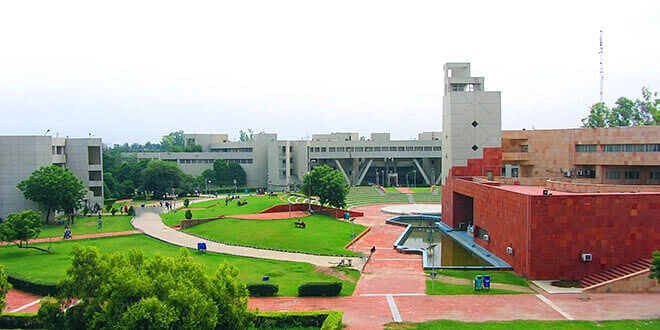
DTU - Delhi Technological University
Delhi, Delhi NCR

Sri Guru Gobind Singh College of Commerce, Delhi University, New Delhi
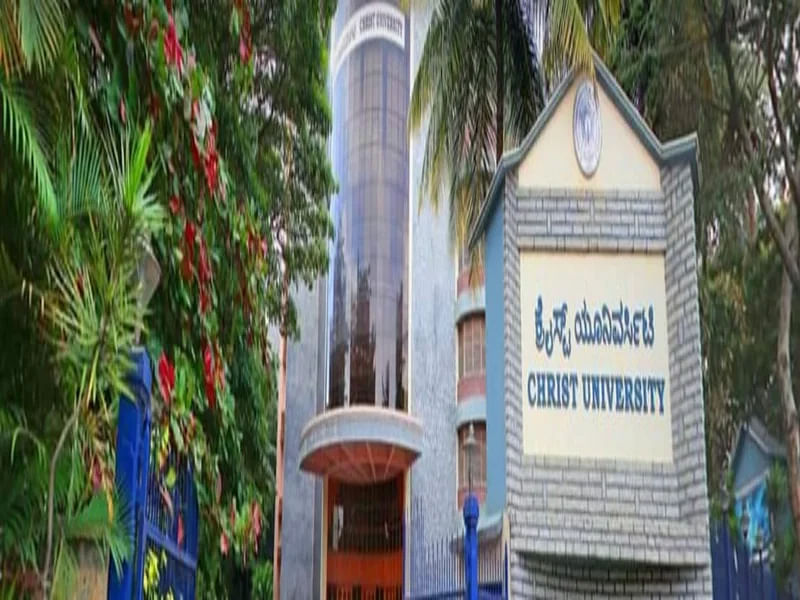
Christ University, Bangalore
Bangalore, Karnataka
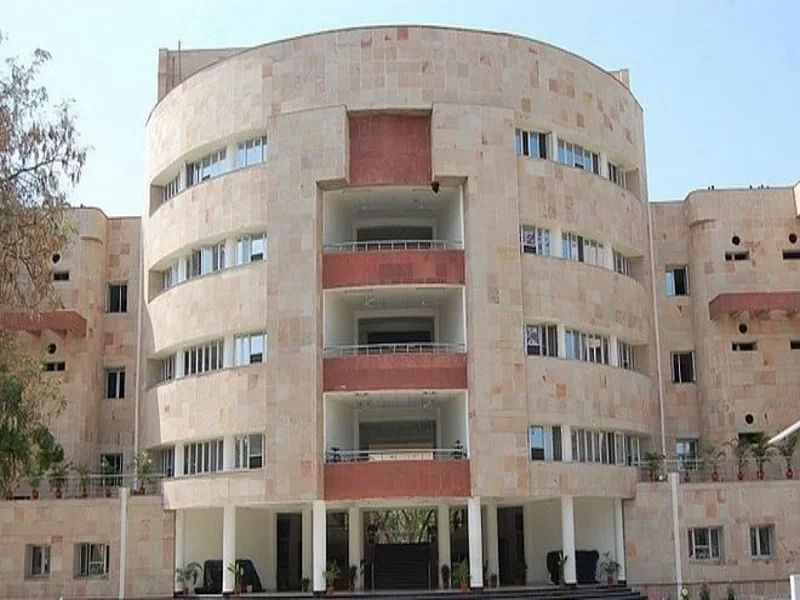
Motilal Nehru National Institute of Technology, [MNNIT] Allahabad
Allahabad, Uttar Pradesh
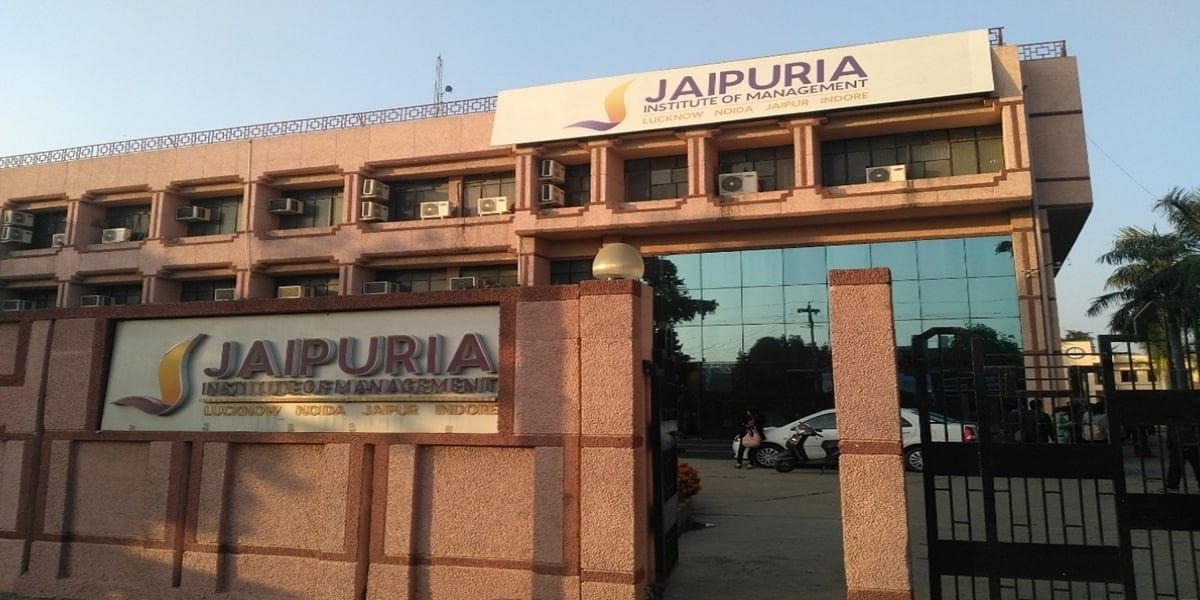
Jaipuria Lucknow - Jaipuria Institute of Management
Lucknow, Uttar Pradesh

SRMIST - SRM Institute of Science and Technology, Chennai
Chennai, Tamil Nadu
Entrance Exams after 12th Boards

Exam Date: Apr 4, 2024
Result Date: Apr 25, 2024

JEE Advanced
Exam Date: May 26, 2024
Result Date: N/A

Exam Date: Apr 17, 2023
Result Date: Apr 26, 2023
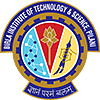
Exam Date: May 20, 2024

Exam Date: May 5, 2024
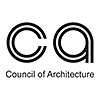
Exam Date: Apr 6, 2024
Result Date: Jun 13, 2023
Explore articles on Board exams VIEW ALL
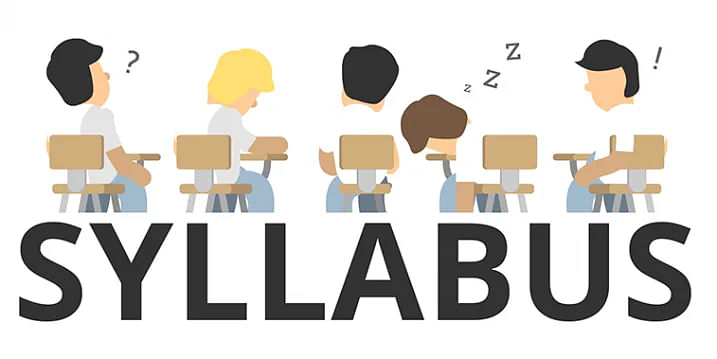
CBSE Class 11 Sociology Deleted Syllabus 2024-25: Download PDF
Shubhi Shriti

CBSE Class 11 Geography Deleted Syllabus 2024-25: Download PDF
Sushmita Sundas

CBSE Class 12 Geography Deleted Syllabus 2024-25: Download PDF

CBSE Class 11 Computer Science Deleted Syllabus 2024-25: Download PDF
Latest News on Board Exams VIEW ALL

MAH HSC Result 2024 Expected to be Out Soon at mahresult.nic.in
Abhilasha Kiran

Punjab Board Class 10 Result 2024 Expected to Be Out Tomorrow at pseb.ac.in

HPBOSE 10th Result 2024 to Release Soon at hpbose.org

Punjab Board 10th Result 2024 to Be Out Soon at pseb.ac.in
Related Articles

CBSE Practice Paper Class 12 2023-24: Download PDF with Solution
Venushree Agarwal

CBSE Class 12 Sociology Deleted Syllabus 2024-25 - Download PDF
Preyoti Dey

CBSE Class 12 Accountancy Deleted Syllabus 2024-25 - Download PDF

CBSE Class 12 English Deleted Syllabus 2024-25 - Download PDF

CBSE Class 12 Business Studies Deleted Syllabus 2024-25 - Download PDF

CBSE Class 12 Computer Science Deleted Syllabus 2024-25 - Download PDF
Get Free Scholarship worth 25000 INR
- ₦ USD EUR GBP GHS NGN KES RWF UGX TZS SLL ZMW XOF XAF
- Sign in | SignUp

Cart is empty.

- Accounting Education Projects 0
- Accounting Projects 154
- Actuarial Science Projects 2
- Adult Education and Continuing Projects 5
- Agric Economics Projects 2
- Agricultural Engineering Projects 13
- Agricultural Science Education Projects 8
- Agricultural Science Projects 7
- Agronomy Projects 5
- Anatomy Projects 1
- Animal Production Projects 2
- Anthropology Projects 0
- Archaeology Projects 0
- Architecture Projects 0
- Arts Education Projects 0
- Banking and Finance Projects 87
- Biochemistry Projects 49
- Biology Education Projects 12
- Biology Projects 4
- Biotechnology & Bioinformatics Projects 5
- Botany Projects 1
- Building Technology Projects 0
- Business Administration Projects 57
- Business Education Projects 2
- Chemical Engineering Projects 6
- Chemistry Education Projects 8
- Chemistry Projects 53
- Christian Religious Studies Projects 2
- Civil Engineering Projects 12
- Classics Projects 0
- Computer Engineering Projects 6
- Computer Science Education Projects 1
- Computer Science Projects 37
- Cooperative Economics Projects 0
- Criminology Projects 6
- Dentistry Projects 0
- Economics Education Projects 5
- Economics Projects 22
- Education Projects 10
- Educational Foundation Projects 4
- Educational Management Projects 82
- Educational Technology Projects 2
- Electrical Electronic Engineering Projects 33
- English Education Projects 9
- English Literature Projects 0
- English Projects 5
- Entrepreneurship Studies Projects 2
- Environmental Science Projects 6
- Estate Management Projects 10
- Finance Projects 3
- Fine and Applied Art Projects 0
- Fishery and Aquaculture 1
- Food Technology Projects 62
- French Language Projects 0
- Geography and Meteorology Projects 2
- Geography Education Projects 0
- Geology and Geophysics Projects 3
- German Language Projects 0
- Guidance and Counseling Projects 18
- History Projects 5
- Home Economics Projects 2
- Horticulture Projects 1
- Human Kinetics Projects 1
- Human Nutrition and Dietetics Projects 11
- Human Resource Management Projects 2
- Industrial Chemistry Projects 2
- Industrial Relations and Personnel Management Projects 13
- Information Technology Management Projects 10
- Insurance Projects 1
- International Relations & Conflict Studies Projects 6
- Islamic Studies Projects 3
- Italian Studies Projects 0
- Language Projects 0
- Law Projects 6
- Library Science Projects 18
- Marketing Projects 45
- Mass Communication Projects 2
- Mathematics Education Projects 15
- Mathematics Projects 32
- Mechanical Engineering Projects 22
- Medical Health Science Projects 1
- Medical Laboratory Science Projects 1
- Metallurgical Engineering Projects 0
- Microbiology Projects 57
- Music Projects 0
- Nursing Projects 3
- Office Technology Management Projects 0
- Petroleum Engineering Projects 0
- Pharmacology Projects 5
- Philosophy Projects 3
- Physical Health Education Projects 1
- Physics Education Projects 6
- Physics Projects 29
- Physiology Projects 0
- Plant Science Projects 18
- Political Science Projects 3
- Portuguese Studies Projects 0
- Primary Education Projects 2
- Production Engineering Projects 4
- Psychology Projects 16
- Public Administration Projects 32
- Public Health Projects 15
- Purchasing and Supply Projects 4
- Quantity Survey Projects 2
- Religious Studies Projects 1
- Science Laboratory Technology Projects 1
- Secretarial Administration Projects 0
- Social Studies Education Projects 4
- Sociology Projects 28
- Spanish Studies Projects 0
- Special Education Projects 1
- Statistics and Demography Projects 10
- Sustainable Development Projects 1
- Taxation Projects 0
- Theatre Arts Projects 1
- Theology and Biblical Studies Projects 3
- Tourism and Hospitality Management Projects 2
- Transport Management Projects 0
- Urban and Regional Planning Projects 0
- Veterinary Medicine Projects 12
- Vocational Education Projects 1
- Zoology Projects 13
- Accounting Education Project 9
- Accounting Project 560
- Adult and Continuing Education Project 12
- African Languages Project 0
- Agric Economics Project 0
- Agric Extension Project 1
- Agricultural Engineering Project 13
- Agricultural Science Education Project 3
- Agricultural Science Project 14
- Agronomy Project 0
- Anatomy Project 0
- Anthropology Project 0
- Archaeology Project 1
- Architecture Project 2
- Arts Education Project 1
- Banking and Finance Project 394
- Biochemistry Project 58
- Biology Education Project 28
- Biology Project 0
- Botany Project 4
- Building Technology Project 17
- Business Administration Project 618
- Business Education Project 51
- Chemical Engineering Project 2
- Chemistry Education Project 12
- Chemistry Project 48
- Christian Religious Studies Project 11
- Civil Engineering Project 30
- Classics Project 0
- Computer Engineering Project 4
- Computer Science Education Project 38
- Computer Science Project 198
- Cooperative Economics Project 15
- Criminology Project 1
- Dentistry Project 0
- Early Childhood Education Project 13
- Economics Education Project 35
- Economics Project 225
- Education Project 195
- Educational Administration Project 3
- Educational Foundation Project 10
- Educational Management Project 69
- Educational Technology Project 11
- Electrical Electronic Engineering Project 37
- English Education Project 51
- English Literature Project 28
- English Project 28
- Entrepreneurship Studies Project 0
- Environmental Health Project 2
- Environmental Science Project 21
- Estate Management Project 60
- Fine and Applied Arts Project 1
- Fishery and Aquaculture Project 0
- Food Technology Project 73
- French Language Project 3
- Geography and Meteorology Project 12
- Geography Education Project 7
- Geology Project 17
- German Language Project 0
- Guidance and Counseling Project 155
- Hausa Language Project 1
- History Project 61
- Home Economics Education Project 4
- Human Kinetics Project 10
- Human Nutrition and Dietetics Project 138
- Human Resource Management Project 0
- Igbo Language 0
- Industrial Chemistry Project 13
- Industrial Relations and Personnel Management Project 128
- Insurance Project 14
- Integrated Science Education Project 4
- International and Diplomatic Studies Project 0
- International Relations & Conflict Studies Project 22
- Islamic Studies Project 18
- Italian Studies Project 0
- Language Project 3
- Law Project 9
- Library Science Project 32
- Linguistic and Communication Project 0
- Marketing Project 279
- Mass Communication Project 160
- Mathematics Education Project 30
- Mathematics Project 26
- Mechanical Engineering Project 65
- Medical Health Science Project 3
- Medical Laboratory Science Project 1
- Metallurgical Engineering Project 3
- Microbiology Project 174
- Midwifery Project 0
- Music Project 0
- Nursing Project 18
- Office Technology Management Project 24
- Petroleum Engineering Project 2
- Pharmacology Project 4
- Philosophy Project 72
- Physical Health Education Project 54
- Physics Education Project 14
- Physics Project 25
- Physiology Project 1
- Plant Science Project 0
- Political Science Project 40
- Portuguese Studies Project 0
- Primary Education Project 31
- Production Engineering Project 24
- Psychology Project 15
- Public Administration Project 193
- Public Health Project 55
- Purchasing and Supply Project 57
- Quantity Survey Project 11
- Religious Studies Project 2
- Science Laboratory Technology Project 84
- Secretarial Administration Project 51
- Social Development Project 9
- Social Science Education Project 7
- Social Studies Education Project 20
- Sociology Project 127
- Soil Science Project 0
- Spanish Studies Project 0
- Special Education Project 3
- Statistics and Demography Project 41
- Surveying and Geoinformatics Projects 1
- Taxation Project 0
- Theatre Arts Project 0
- Theology and Biblical Studies Project 3
- Tourism and Hospitality Management Project 18
- Transport and Maritime Project 0
- Transport Management Project 18
- Urban and Regional Planning Project 1
- Veterinary Medicine Project 1
- Vocational Education Project 7
- Yoruba Language 0
- Zoology Project 1

- Business & Finance 13
- Education 4
- Fiction & Literature 0
- Health and Fitness 4
- Kids 0
- Mystery & Suspense 1
- Nonfiction 0
- Novels & Comics 0
- Periodicals 0
- Religion 1
- Romance 1
- Science Fiction & Fantasy 0

- Accounting 7
- Banking and Finance 0
- Biochemistry 0
- Biology 0
- Business Administration 2
- Chemical Engineering 0
- Chemistry 1
- Computer Science 2
- Economics 1
- Education 0
- Environmental Science 1
- Marketing 4
- Mass Communication 1
- Nursing 1
- Office Technology Management 2
- Philosophy 0
- Physics 2
- Political Science 0
- Psychology 0
- Public Administration 1
- Purchasing and Supply 1
- Science Lab Technology 0
- Secretarial Administration 1
- Sociology 0
- Statistics 0

- JAMB Past Questions 0
- NECO Past Questions 0
- Post UTME Past Questions 1
- WAEC Past Questions 0

- Academic Journals 0
- Clinical Case Study 0
- Clinical Trials 0
- Trade Journals 0

- Email Directory 1
- GSM Numbers 33
- JAMB DE FORM (REG E-PIN) 0
- JAMB UTME FORM (REG E-PIN) 0
- NABTEB Nov Dec GCE Form 0
- NABTEB Result Checker 0
- National Common Entrance Form 0
- NECO GCE FORM (REG E-PIN) 0
- NECO Result Checker Token 1
- WAEC GCE FORM (REG E-PIN) 0
- WAEC Result Checker 1
- WAEC Verification PIN (NYSC) 0
- Undergraduate Projects
- Economics Education Project
Filter Results By
- Projects Postgraduate Projects Undergraduate Projects Accounting Education Project Accounting Project Adult and Continuing Education Project African Languages Project Agric Economics Project Agric Extension Project Agricultural Engineering Project Agricultural Science Education Project Agricultural Science Project Agronomy Project Anatomy Project Anthropology Project Archaeology Project Architecture Project Arts Education Project Banking and Finance Project Biochemistry Project Biology Education Project Biology Project Botany Project Building Technology Project Business Administration Project Business Education Project Chemical Engineering Project Chemistry Education Project Chemistry Project Christian Religious Studies Project Civil Engineering Project Classics Project Computer Engineering Project Computer Science Education Project Computer Science Project Cooperative Economics Project Criminology Project Dentistry Project Early Childhood Education Project Economics Education Project Economics Project Education Project Educational Administration Project Educational Foundation Project Educational Management Project Educational Technology Project Electrical Electronic Engineering Project English Education Project English Literature Project English Project Entrepreneurship Studies Project Environmental Health Project Environmental Science Project Estate Management Project Fine and Applied Arts Project Fishery and Aquaculture Project Food Technology Project French Language Project Geography Education Project Geography and Meteorology Project Geology Project German Language Project Guidance and Counseling Project Hausa Language Project History Project Home Economics Education Project Human Kinetics Project Human Nutrition and Dietetics Project Human Resource Management Project Igbo Language Industrial Chemistry Project Industrial Relations and Personnel Management Project Insurance Project Integrated Science Education Project International Relations & Conflict Studies Project International and Diplomatic Studies Project Islamic Studies Project Italian Studies Project Language Project Law Project Library Science Project Linguistic and Communication Project Marketing Project Mass Communication Project Mathematics Education Project Mathematics Project Mechanical Engineering Project Medical Health Science Project Medical Laboratory Science Project Metallurgical Engineering Project Microbiology Project Midwifery Project Music Project Nursing Project Office Technology Management Project Petroleum Engineering Project Pharmacology Project Philosophy Project Physical Health Education Project Physics Education Project Physics Project Physiology Project Plant Science Project Political Science Project Portuguese Studies Project Primary Education Project Production Engineering Project Psychology Project Public Administration Project Public Health Project Purchasing and Supply Project Quantity Survey Project Religious Studies Project Science Laboratory Technology Project Secretarial Administration Project Social Development Project Social Science Education Project Social Studies Education Project Sociology Project Soil Science Project Spanish Studies Project Special Education Project Statistics and Demography Project Surveying and Geoinformatics Projects Taxation Project Theatre Arts Project Theology and Biblical Studies Project Tourism and Hospitality Management Project Transport Management Project Transport and Maritime Project Urban and Regional Planning Project Veterinary Medicine Project Vocational Education Project Yoruba Language Zoology Project
- Business Plan
- Feasibility Study
- Software License
- Training Manual
- Exam Token & Pin
Sign In with social media

Forgot Password
Please Write your Email
Order Tracking

- Nigerian Project Topics
- Ghanaian Project Topics
- Kenyan Project Topics
- Hire a Writer
- Request a Topic
- Research Articles
- Testimonies
Economics Education Project Topics and Materials
Select your department.
- Accounting [233]
- Adult Education & Exra-Mural Studies [5]
- Agriculture [53]
- Agricultural Economics & Extension [114]
- Agricultural Engineering [7]
- Agronomy [1]
- Animal Science [54]
- Applied Chemistry [2]
- Applied Science [1]
- Archaeology & Tourism [5]
- Architecture [7]
- Banking and Finance [187]
- Biochemistry [70]
- Biological Sciences [12]
- Biotechnology [8]
- Building [36]
- Business Administration & Management [393]
- Business Economics [29]
- Business Information Technology [12]
- Chemical Pathology [1]
- Chemical Engineering [27]
- Chemistry [11]
- Civil Engineering [47]
- Communication & Multimedia [8]
- Community Medicine [22]
- Computer Engineering [54]
- Computer Science [185]
- Criminology [14]
- Crop Science [28]
- Education [210]
- Educational Foundation [146]
- Educational Psychology & Counselling [14]
- Economics [211]
- Economics & Development Studies [7]
- Economics Education [16]
- Electrical & Computer Engineering [20]
- Electrical Electronics Engineering [49]
- Energy & Environmental Technology [2]
- English & Literary Studies [110]
- English Language [99]
- Entrepreneurship [10]
- Environmental Planning [6]
- Environmental Science [55]
- Estate Management [61]
- Experience & Wellness Management [1]
- Fashion Design & Clothing Technology [1]
- Fine Arts [18]
- Fishery & Aquaculture [9]
- Food Science & Technology [28]
- Forestry [3]
- Geography [22]
- Geoinformatics and Surveying [2]
- Geology [7]
- Guidance & Counselling [15]
- Health Administration & Management [3]
- History [31]
- Home & Rural Economics [5]
- Home Science, Nutrition & Dietetics [29]
- Hotel Restaurant & Tourism Management [1]
- Human Aging & Elderly Service [1]
- Human Anatomy [2]
- Human Kinetics and Health Education [6]
- Human Physiology [10]
- Industrial Chemistry [9]
- Industrial Design [5]
- Industrial Engineering [1]
- Industrial Management [8]
- Industrial Relations & Personnel Management [9]
- Industrial Technical Education [4]
- Information & Resource Management [23]
- Information Technology [11]
- Innovative Business Services [1]
- Insurance [5]
- International Business [66]
- International Relations [20]
- Interpreting & Sign Language Interpreter [1]
- Islamic Studies [15]
- Library & Information Science [119]
- Linguistics & Communication [58]
- Linguistics, Igbo & other Nigerian Languages [33]
- Local Government & Development Studies [15]
- Marketing [93]
- Mass Communication [353]
- Materials Science & Engineering [18]
- Mathematics [30]
- Mathematics & Statistics [44]
- Mechanical Engineering [21]
- Medical Biochemistry [4]
- Metallurgical & Materials Engineering [7]
- Microbiology [82]
- Natural Resource Management [5]
- Nursing Science [82]
- Office Technology & Management [52]
- Petroleum Engineering [41]
- Pharmaceutical & Medicinal Chemistry [7]
- Pharmaceutics & Pharmaceutical Microbiology [4]
- Pharmacognosy & Drug Development [9]
- Pharmacology & Therapeutics [9]
- Pharmacology & Toxicology [4]
- Philosophy [8]
- Physical & Health Education [47]
- Physics [22]
- Physiology [13]
- Physiotherapy [1]
- Plant Science & Biotechnology [17]
- Plastics Technology [4]
- Political Science [101]
- Psychology [17]
- Public Administration [146]
- Public Health [23]
- Purchasing & Supply [33]
- Quantity Surveying [23]
- Religion & Cultural Studies [12]
- Renewable Energy [3]
- Science Laboratory Technology [44]
- Social Services [4]
- Sociology [101]
- Statistics [10]
- Sustainable Coastal Management [1]
- Technology & Communication [3]
- Theatre & Performing Arts [19]
- Theology & Biblical Studies [11]
- Theriogenology & Production [1]
- Tourism [25]
- Urban & Regional Planning [31]
- Veterinary Medicine [3]
- Veterinary Parasitology & Entomology [1]
- Veterinary Pharmacology & Toxicology [2]
- Veterinary Physiology [2]
- Veterinary Public Health & Preventive Medicine [5]
- Vocational & Technical Education [40]
- Water Resources & Environmental Engineering [6]
- Zoology [16]
Featured Post
Reporting and discussing your findings.
This page deals with the central part of the thesis, where you present the data that forms the basis of your investigation, shaped by the...

Recent Posts
- Terms of Use
Using our service is LEGAL and IS NOT prohibited by any university/college policies.
Our service is legal because, all institutions permit their students to read previous project, books, articles or papers while developing their own works. According to Austin Kleon "All creative work builds on what came before"… Read More!
- Project Topics & Materials

- Nigerian Project Topics
- Ghanaian Project Topics
- Kenyan Project Topics
- Hire a Writer
- Request a Topic
- Research Articles
- Browse Departments
- Testimonies
Economics Education Project Topics
Search for your topic here.
See full list of Project Topics under your Department Here!
Featured Post
How to write a research hypothesis.
A hypothesis is a description of a pattern in nature or an explanation about some real-world phenomenon that can be tested through observ...

Popular Posts
- INDECENT DRESSING AMONG STUDENTS; EFFECTS AND SOLUTION Indecent dressing , also known as immodest dressing was once uncommon in Africa, but today, it is progressively becoming part of us and at ...
- INDECENT DRESSING; A SERIOUS ENCROACHMENT ON OUR MORAL VALUES (A CASE STUDY OF MASS COMMUNICATION STUDENTS) ABSTRACT This research looks at indecent dressing, causes and the societal effects it has on our moral value. It discusses several dress...
- CRIME RATE PREDICTION SYSTEM Abstract To be better prepared to respond to criminal activity, it is important to understand patterns in crime. In our project, we analyze ...
- Free Project Topics :: Check Project Topics by Department - Click on any of the following departments to download full list of project topics and materials: ...
- THE ROLE OF LITERATURE IN THE ENGLISH LANGUAGE TEACHING AND LEARNING OF SELECTED SECONDARY SCHOOLS ABSTRACT This research investigates the role of literatures in the English language teaching and learning using some selected secondary ...
- AWARENESS, USE AND USERS’ SATISFACTION WITH LIBRARY E-RESOURCES BY UNDERGRADUATES OF NATIONAL OPEN UNIVERSITY OF NIGERIA, LAGOS STUDY CENTRE ABSTRACT This study was carried out to ascertain awareness, use and users’ satisfaction of library electronic resources by undergraduates...
- THE POSITIVE INFLUENCE OF THE LANGUAGE OF SOCIAL MEDIA ON THE ENGLISH LANGUAGE ABSTRACT The boom in the use of social media in our time has no doubt brought a lot alteration in different language conventions. The ea...
- E-AUTHENTICATION SYSTEM USING A COMBINATION OF QR CODE AND OTP FOR ENHANCED SECURITY Abstract In the proposed scheme, the user can easily and efficiently login into the system. We analyze the security and usability of the pro...
- IMPACT OF RADIO BROADCAST ON RURAL AREAS/COMMUNITIES (A CASE STUDY OF ERUWA TOWN IN OYO STATE) ABSTRACT This research work takes a crucial look at the impact of Radio Broadcast on rural dwellers. A case study of Eruwa Town, Ibarapa...
- THE INFLUENCE OF TECHNOLOGY ON THE ENGLISH VOCABULARY AMONG SENIOR SECONDARY SCHOOL STUDENTS IN ABAKALIKI URBAN ABSTRACT As new technologies emerge; the English language evolves ways of describing them. The more there are changes in society so does...
Recent Posts
Terms of use, search for your topic here.

+234LG, +234(0)80LOC.
Economics Education Project Topics
List of project topics on economics education, download economics education complete projects, total online projects ( 0 ).
Page 1 of 1
To Request More Topics from our offline database Click Here
If you could not find a suitable topic or material yet, chat us up on 01. Whatsapp [+2348187644224] or 02. Facebook our client assistance team will gladly help you from the over one million (1m) Materials in our offline database.
You can make some fortune for yourself on projectwaka through. a. instant cash buy b. instant cash referal c. project publication ... among others read details., research topics and full project work..
ProjectWaka.com is a bank of full project works, students' final year project ideas, free project topics and materials pdf, project work samples and complete project pdf. We have made provision of all project contents free of charge [₦ 0.00] and in rare cases did require a service support fee; our database has grown to about one million [1,000,000] research project materials, we are committed to serving you research topics in Economics Education, free project topics and materials pdf on Economics Education, good project topics and proposals on Economics Education, Economics Education New Project Topics and Research Materials chapters 1-5.
love doctors online
we also provide love doctors, relation counsellors, and the experienced a place to offer relationship tips for healthy relationship (Friendship, Dating and Courtship).
The quantity and quality of student projects, the satisfying academic solutions together with the simplicity of our platform and our free offering with just a service support fee requirement from users makes us the best and largest research project website. You can subscribe for our updates on the following handle: Facebook , Whatsapp, Twitter, Instagram, and linkedin . If you have any suggestion or complain email [email protected] or WhatsApp +234818 764 4224. or Call +234807 177 5447.
How we can prepare for the future with foundational policy ideas for AI in education

Integrating AI in education effectively should be done with responsible and AI use in mind. Image: Unsplash/Yogendra Singh
.chakra .wef-1c7l3mo{-webkit-transition:all 0.15s ease-out;transition:all 0.15s ease-out;cursor:pointer;-webkit-text-decoration:none;text-decoration:none;outline:none;color:inherit;}.chakra .wef-1c7l3mo:hover,.chakra .wef-1c7l3mo[data-hover]{-webkit-text-decoration:underline;text-decoration:underline;}.chakra .wef-1c7l3mo:focus,.chakra .wef-1c7l3mo[data-focus]{box-shadow:0 0 0 3px rgba(168,203,251,0.5);} TeachAI Steering Committee

.chakra .wef-9dduvl{margin-top:16px;margin-bottom:16px;line-height:1.388;font-size:1.25rem;}@media screen and (min-width:56.5rem){.chakra .wef-9dduvl{font-size:1.125rem;}} Explore and monitor how .chakra .wef-15eoq1r{margin-top:16px;margin-bottom:16px;line-height:1.388;font-size:1.25rem;color:#F7DB5E;}@media screen and (min-width:56.5rem){.chakra .wef-15eoq1r{font-size:1.125rem;}} Artificial Intelligence is affecting economies, industries and global issues

.chakra .wef-1nk5u5d{margin-top:16px;margin-bottom:16px;line-height:1.388;color:#2846F8;font-size:1.25rem;}@media screen and (min-width:56.5rem){.chakra .wef-1nk5u5d{font-size:1.125rem;}} Get involved with our crowdsourced digital platform to deliver impact at scale
Stay up to date:, artificial intelligence.
- How artificial intelligence (AI) is integrated is critical as it should enhance human interaction and decision-making rather than replace them through responsible and equitable application in education.
- Students and educators must learn about AI to prepare them for a future increasingly intertwined with AI technologies, including understanding AI’s principles, applications and ethical implications.
- Policy recommendations for integrating AI in education effectively include creating AI-focused task forces, promoting AI literacy, establishing responsible AI guidelines, professional development support and AI research and development.
Education leaders and policymakers face the challenge of leading their communities when artificial intelligence (AI), including education, is becoming increasingly prominent in society. Understanding AI is critical for crafting effective policies that promote responsibility and equity in how AI tools can be accessed, how AI-enabled learning experiences are designed and how students use AI in the classroom. Integrating AI into society should augment, not replace, human interaction and decision-making.
“Leveraging AI’s transformative power, we can drive human progress by revolutionizing education globally, democratizing access and preparing future generations for the challenges and opportunities of a rapidly evolving world,” says Narmeen Makhani from the Education Testing Service.
Innovative teaching with and about AI provides an opportunity to improve equity and help students remain competitive in a changing labour market. For example, the International Monetary Fund estimates that 40% of global jobs will be complemented or in extreme cases, replaced by AI.
“Today’s students can anticipate a future where they will be working with or alongside AI,” according to Joseph South, a chief learning officer at the Association for Supervision and Curriculum Development and International Society for Technology in Education. “It is essential that educators and students understand its present power and potential impact. Our schools must prepare the next generation of AI designers.”
Building AI literacy is essential for understanding AI’s principles, concepts, applications, limitations and ethical implications. It prepares individuals to engage responsibly with AI in various aspects of life, including education and the workforce.
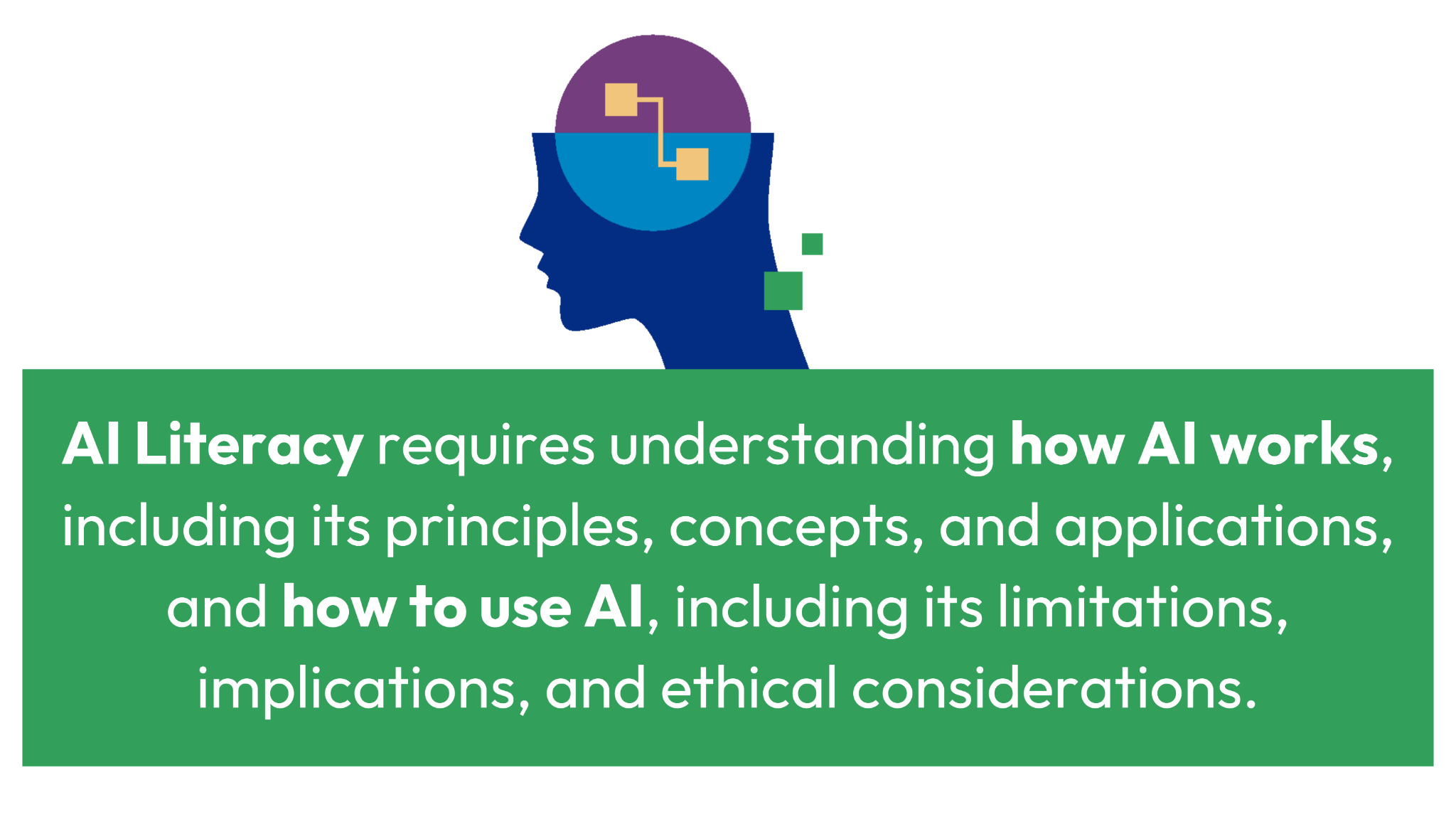
In education, AI offers benefits such as personalized learning, effective feedback and operational efficiency. However, it also poses risks, such as misinformation and loss of critical thinking skills.
Key policy approaches
The Khan Academy’s chief learning officer, Kristen DiCerbo, believes AI holds the promise to tackle many of the persistent problems we see in education, including unfinished learning and teacher burnout.
“By providing access to 1:1 learning support and true teacher assistance, including using data to drive recommendations, we can improve learning outcomes for all,” she says.
Policymakers and education leaders can prepare the future workforce by implementing five foundational policies to help realize the potential benefits of AI in education while mitigating the risks.
- Foster leadership: Create an AI in education task force with experts, educators, students, community members and policymakers to guide policy and oversee implementation. These task forces can drive innovation and ensure AI aligns with educational goals.
- Promote AI literacy: Integrate AI concepts into curricula and teach students to evaluate AI and its outputs critically. Students can become informed consumers and creators of AI-powered technologies by understanding AI’s potential and limitations.
- Provide guidance: Establish clear guidelines for the safe and responsible use of AI in education. We must ensure that AI tools are used ethically, focusing on student privacy and responsible usage. By providing guidance, we can ensure that AI enhances learning experiences without compromising safety or privacy.
- Build capacity: Support educators and staff in integrating AI into teaching, learning, and school management and operations. Professional development programmes can help staff understand AI, its limitations and ethical considerations. By building capacity, we can ensure that leaders develop the expertise to serve their communities and that all staff are equipped to use AI responsibly and effectively throughout the education system.
- Support innovation: Fund research and development to advance AI in education pedagogy, curriculum and tools. By supporting innovation, we can drive the development of new AI technologies that enhance learning experiences and improve student outcomes.
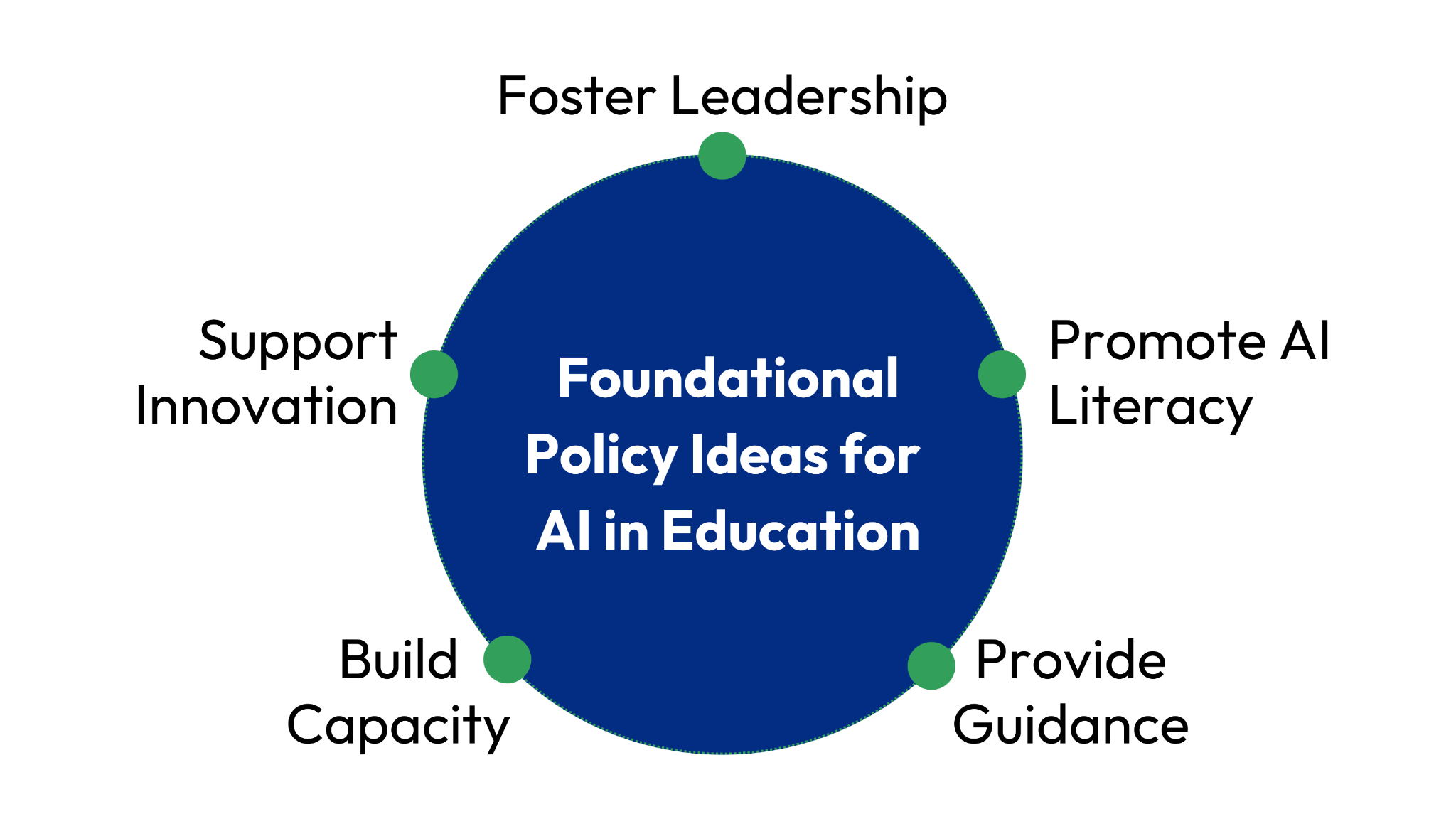
“Transforming education requires the engagement of all those serving school systems. The TeachAI initiative is honoured to bring education leaders, policymakers, technology creators, researchers, and civil society together to create resources such as these foundational policy ideas,” says Pat Yongpradit, chief academic officer of Code.org.
Working together to foster leadership, promote AI literacy, provide guidance, build capacity and support innovation, we can ensure that AI enhances education for all students.
As the World Economic Forum’s Saadia Zahidi says: “As we navigate the uncertainties of AI in education, TeachAI’s guidance in this swiftly evolving environment becomes indispensable. Embracing a multistakeholder approach to developing and implementing these foundational policies will be paramount for optimizing AI’s benefits while mitigating associated risks.”
Let’s seize the opportunity to harness the power of AI and create a brighter future for education.
Have you read?
Unesco releases a new roadmap for using ai in education, without universal ai literacy, ai will fail us.
To learn more about TeachAI’s latest resource, Foundational Policy Ideas for AI in Education, visit teachai.org/policy .
TeachAI is an initiative uniting education and technology leaders to assist governments and education authorities in teaching with and about AI. It is led by Code.org , the Educational Testing Service , the International Society for Technology in Education , Khan Academy and the World Economic Forum . It is advised by a diverse group of more than 100 organizations, governments and individuals. TeachAI’s goals include providing policy guidance, increasing awareness, and building community and capacity.
Don't miss any update on this topic
Create a free account and access your personalized content collection with our latest publications and analyses.
License and Republishing
World Economic Forum articles may be republished in accordance with the Creative Commons Attribution-NonCommercial-NoDerivatives 4.0 International Public License, and in accordance with our Terms of Use.
The views expressed in this article are those of the author alone and not the World Economic Forum.
Related topics:
The agenda .chakra .wef-n7bacu{margin-top:16px;margin-bottom:16px;line-height:1.388;font-weight:400;} weekly.
A weekly update of the most important issues driving the global agenda
.chakra .wef-1dtnjt5{display:-webkit-box;display:-webkit-flex;display:-ms-flexbox;display:flex;-webkit-align-items:center;-webkit-box-align:center;-ms-flex-align:center;align-items:center;-webkit-flex-wrap:wrap;-ms-flex-wrap:wrap;flex-wrap:wrap;} More on Artificial Intelligence .chakra .wef-17xejub{-webkit-flex:1;-ms-flex:1;flex:1;justify-self:stretch;-webkit-align-self:stretch;-ms-flex-item-align:stretch;align-self:stretch;} .chakra .wef-nr1rr4{display:-webkit-inline-box;display:-webkit-inline-flex;display:-ms-inline-flexbox;display:inline-flex;white-space:normal;vertical-align:middle;text-transform:uppercase;font-size:0.75rem;border-radius:0.25rem;font-weight:700;-webkit-align-items:center;-webkit-box-align:center;-ms-flex-align:center;align-items:center;line-height:1.2;-webkit-letter-spacing:1.25px;-moz-letter-spacing:1.25px;-ms-letter-spacing:1.25px;letter-spacing:1.25px;background:none;padding:0px;color:#B3B3B3;-webkit-box-decoration-break:clone;box-decoration-break:clone;-webkit-box-decoration-break:clone;}@media screen and (min-width:37.5rem){.chakra .wef-nr1rr4{font-size:0.875rem;}}@media screen and (min-width:56.5rem){.chakra .wef-nr1rr4{font-size:1rem;}} See all

AI for Impact: The Role of Artificial Intelligence in Social Innovation

Causal AI: the revolution uncovering the ‘why’ of decision-making
Darko Matovski
April 11, 2024

How to build the skills needed for the age of AI
Juliana Guaqueta Ospina

These are the 4 skills to look for when building an AI governance team
Allan Millington
April 10, 2024

UN and EU both agree new AI rules, and other digital technology stories you need to know
April 8, 2024

AI vs Art: Will AI help or hinder human expression?
Robin Pomeroy and Sophia Akram
Major new film and TV studio campus to be built in Stirling
The development will be built on former Ministry of Defence (MoD) land at Forthside. An independent economic impact assessment has estimated the project will create more than 4,000 jobs over 25 years.

Scotland reporter @Jenster13
Wednesday 17 April 2024 12:50, UK

A major new film and television studio campus is to be created in Stirling.
Stirling Studios will become one of the biggest media hubs in Scotland and is expected to pave the way for thousands of high-skilled jobs.
An independent economic impact assessment has estimated the project will create more than 4,000 jobs over 25 years, with the positive benefits filtering down the wider supply chains.
The development will be built on former Ministry of Defence (MoD) land at Forthside.

Announcing the plans on Wednesday, the chief executive of Stirling Council said the site and buildings could fit well with the needs in the sector.
Carol Beattie said: "In a previous role as director of creative industries for Scottish Development International, I knew there was still an opening for more production space in Scotland.
"At that point, I spent time in London speaking to the British Film Commission and studio operators such as Pinewood, Three Mills and Warner Brothers to understand the specifications of a good site.
More on Scotland

East Ayrshire man jailed for six months after dog abandoned in cage had to be put down

Woman arrested in connection with death of 34-year-old woman in Aberdeen

Workers at The 13th Note in Glasgow win employment tribunal
Related Topics:
"When I saw the unique buildings and location at Forthside, I considered it to be a fantastic fit, which has since been confirmed through our close consultation with the industry, including Screen Scotland."

Experts have assessed there is currently 100,000 sq ft of studio space and 110,000 sq ft for production, logistics and office space at the site.
Some of the existing buildings on the site will be retained and refurbished, while the remainder of the land will be redeveloped and cleared in line with existing plans.
The site has already been used as a filming location.

Feedback on the plans also highlighted the many benefits of Stirling itself, including its surrounding scenery and natural landscapes, its central location, excellent transport links, and the opportunities to increase Scotland's talent pool through partnership working with the likes of the University of Stirling and Forth Valley College.
The MoD land was snapped up by the local authority for £5m through the Stirling and Clackmannanshire City Region Deal - a £214m partnership between Stirling and Clackmannanshire councils, the University of Stirling and the UK and Scottish governments.
This ambitious project has been supported by repurposing a proportion of the £19m grant secured by the council from UK government's levelling up fund for the redevelopment and regeneration of Forthside.

Keep up with all the latest news from the UK and around the world by following Sky News
Stirling Council leader Chris Kane said: "We have an opportunity to embed an industry in our city which will bring thousands of high-skilled jobs, put us on a global creative map and deliver a significant economic boost to the region over many decades.
"By making innovative use of the existing buildings on a former military site, we are creating a studio campus that will provide everything film producers need to meet demand in a thriving sector.
"Students in our schools, our college and our university will be able to pursue creative careers right here in Stirling that in the past would have meant having to consider leaving to chase opportunities elsewhere."
Read more from Sky News: Why are thousands of video game workers losing their jobs? Taylor Swift fans 'could have lost £1m due to Eras ticket scams'
Be the first to get Breaking News
Install the Sky News app for free

John Lamont, UK government minister for Scotland, said he was "delighted" that £24m of Westminster funding has helped the council with its ambitions.
He added: "The jobs and economy boosting regeneration that will follow will provide fabulous opportunities for the region.
"The UK government is committed to making sure that Scotland and the wider UK remains an attractive location for film and high-end TV productions.
"That is why we have supported our world-leading creative industries with £1bn in tax reliefs. In total we are investing £72m in levelling up Stirling and Clackmannanshire and more than £3bn across Scotland."
Related Topics
Please update your browser.
We don't support this browser version anymore. Using an updated version will help protect your accounts and provide a better experience.
Update your browser
We don't support this browser version anymore. Using an updated version will help protect your accounts and provide a better experience.
We’ve signed you out of your account.
You’ve successfully signed out
We’ve enhanced our platform for chase.com. For a better experience, download the Chase app for your iPhone or Android. Or, go to System Requirements from your laptop or desktop.
Credit Cards
Checking Accounts
Savings Accounts
Mortgage & Home Equity
Chase for Business
Commercial Banking
- ATM & branch
Please turn on JavaScript in your browser
It appears your web browser is not using JavaScript. Without it, some pages won't work properly. Please adjust the settings in your browser to make sure JavaScript is turned on.
Chase Survey
Your feedback is important to us. Will you take a few moments to answer some quick questions?
You're now leaving Chase
Chase's website and/or mobile terms, privacy and security policies don't apply to the site or app you're about to visit. Please review its terms, privacy and security policies to see how they apply to you. Chase isn’t responsible for (and doesn't provide) any products, services or content at this third-party site or app, except for products and services that explicitly carry the Chase name.
Programs submenu
Regions submenu, topics submenu, quality education for security and economic growth, counterspace trends: an evolving global landscape, unrwa at the epicenter of the gaza crisis—gaza: the human toll.
- Abshire-Inamori Leadership Academy
- Aerospace Security Project
- Africa Program
- Americas Program
- Arleigh A. Burke Chair in Strategy
- Asia Maritime Transparency Initiative
- Asia Program
- Australia Chair
- Brzezinski Chair in Global Security and Geostrategy
- Brzezinski Institute on Geostrategy
- Chair in U.S.-India Policy Studies
- China Power Project
- Chinese Business and Economics
- Defending Democratic Institutions
- Defense-Industrial Initiatives Group
- Defense 360
- Defense Budget Analysis
- Diversity and Leadership in International Affairs Project
- Economics Program
- Emeritus Chair in Strategy
- Energy Security and Climate Change Program
- Europe, Russia, and Eurasia Program
- Freeman Chair in China Studies
- Futures Lab
- Geoeconomic Council of Advisers
- Global Food and Water Security Program
- Global Health Policy Center
- Hess Center for New Frontiers
- Human Rights Initiative
- Humanitarian Agenda
- Intelligence, National Security, and Technology Program
- International Security Program
- Japan Chair
- Kissinger Chair
- Korea Chair
- Langone Chair in American Leadership
- Middle East Program
- Missile Defense Project
- Project on Fragility and Mobility
- Project on Nuclear Issues
- Project on Prosperity and Development
- Project on Trade and Technology
- Renewing American Innovation Project
- Scholl Chair in International Business
- Smart Women, Smart Power
- Southeast Asia Program
- Stephenson Ocean Security Project
- Strategic Technologies Program
- Transnational Threats Project
- Wadhwani Center for AI and Advanced Technologies
- All Regions
- Australia, New Zealand & Pacific
- Middle East
- Russia and Eurasia
- American Innovation
- Civic Education
- Climate Change
- Cybersecurity
- Defense Budget and Acquisition
- Defense and Security
- Energy and Sustainability
- Food Security
- Gender and International Security
- Geopolitics
- Global Health
- Human Rights
- Humanitarian Assistance
- Intelligence
- International Development
- Maritime Issues and Oceans
- Missile Defense
- Nuclear Issues
- Transnational Threats
- Water Security
How Might Israel Strike Back?

Photo: Jamal Awad/Xinhua via Getty Images
Commentary by Daniel Byman
Published April 16, 2024
Iran’s massive drone and ballistic missile strikes on Israel failed to inflict significant damage, but Israeli leaders have vowed to respond to the aggression, although they avoided specifics. Israeli leaders face two questions: Should Israel retaliate, and if so, how?
On the one hand, Iran’s attack was unprecedented—a direct and open strike by an adversary on the Israeli homeland. Had it not been for Israel’s excellent defenses and help from the United States, United Kingdom, and Jordan , the consequences could have been devastating. On the other hand, the strike fizzled. A young girl was seriously injured in the attack, but beyond that there were no major losses, and given the scale of the strike that is impressive. Israel is even enjoying a rare moment of international support , a break from the near-constant criticism of the country over its war in Gaza.
The Netanyahu government has multiple goals, and these pull Israel in different directions when it comes to retaliation. Perhaps most importantly, Israel seeks to maintain deterrence. Since its inception, the Jewish state has been surrounded by foes, and despite peace deals and broader regional acceptance, it still has many enemies. Its security depends in part on those enemies being too afraid to menace Israel, and that in turn requires that those who attack Israel pay a stiff price for doing so.
Deterrence against Iran is particularly important. Iran supports an array of terrorist groups against Israel, regularly denounces Israel in its rhetoric, and has conducted bloody terrorist attacks of its own against Jewish and Israeli targets. Perhaps of greatest concern, Iran has an advanced nuclear program (though not yet nuclear weapons), and Israelis rightly worry that Iran would use nuclear weapons to threaten or attack Israel if deterrence is not robust.
Israeli leaders also seek to reassure the Israeli public: citizens need to know their governments will protect them in the face of external threats, and history has made Israeli Jews especially sensitive to security.
Just as important as what Israel seeks to achieve is what Israel seeks to avoid. Israel has its hands more than full. Israel’s military campaign in Gaza seems stalled, and a conflict with the formidable Lebanese Hezbollah looms as a possibility. In addition, relations with the United States are already strained over Gaza, and President Biden has told Netanyahu that the United States will not support more attacks on Iran, telling him: “You got a win. Take the win.”
Israel has at least four possible responses, all of which have limits and disadvantages. First, Israel could simply do nothing and de-escalate the situation—taking the win, as President Biden has urged. Doing nothing would relieve international audiences and the United States, which fear a regional war, and make Israeli leaders look statesmanlike at a time when they are regularly being depicted as brutal warmongers. Doing nothing, however, may leave the Israeli public unsatisfied. Security-minded Israelis would worry that Iran would be emboldened if it pays no price for this massive attack and that other enemies too might take heart.
A second option, on the other end of the spectrum, would be an open attack on Iran itself. Israel could conduct missile or airstrikes on Iranian military facilities such as airbases or missile launching sites. This might degrade Iran’s capacity somewhat, but more importantly it would be a message to Tehran that it will suffer if it attacks Israel, not just embarrass itself with a failed operation.
The risk of such an attack is that Iran would escalate, and that it would do so throughout the region. Iran might conduct terrorist attacks on Israeli and Jewish targets, as it has in the past, when Iran and its ally Hezbollah struck as far afield as Argentina and Bulgaria in the name of revenge. Perhaps most menacingly, Iran might unleash Hezbollah against Israeli territory. Although Hezbollah and Israel are exchanging blows each day, both have avoided all-out war. The group has a massive rocket arsenal that could overwhelm Israel’s air defenses; one sign of restraint in Iran’s original attack on Israel was that it did not involve Hezbollah . Guarding against Iran would also require military assets that are needed for Gaza and for a Lebanon contingency. Finally, Iran’s response might involve militant attacks on U.S. forces, with Iran justifying this with the claim that the United States and Israel are joined at the waist.
A more covert attack on Iran itself is a third and less risky possibility, although it is also less satisfying for the Israeli public. Sabotage of Iran’s military facilities or a cyberattack, for example, would also send a message to Tehran, albeit one less dramatic than an open military strike. Israel has reportedly conducted these types of attacks in the past, such as the 2021 sabotage of the Natanz enrichment site . This is less risky in terms of escalation, as Iran does not necessarily need to respond publicly to save face, but the message is far more muted.
A fourth option is to continue, perhaps at a more aggressive pace, operations against Iranian military and intelligence figures outside Iran. The attack on Iran’s consulate in Syria that killed several senior Iranian military leaders was the proximate cause of the latest round of fighting, so the escalation potential of this option is clearly high. However, it would also send a message to Tehran that Iran’s attempt to intimidate Israel has failed and reassure the Israeli people that the government continues to target those who would target Israel.
An important U.S. role in all this is to reassure Israel—and make clear to countries like Iran—that the United States will remain engaged in the region and stand by its allies. Israel’s deterrence rests in part on its own capabilities, but having the United States in its corner makes countries like Iran more cautious, and U.S. and allied military support against Iran’s attacks sends a message that Israel is not alone in the face of aggression.
Daniel Byman is a senior fellow with the Transnational Threats Project at the Center for Strategic and International Studies in Washington, D.C.
Commentary is produced by the Center for Strategic and International Studies (CSIS), a private, tax-exempt institution focusing on international public policy issues. Its research is nonpartisan and nonproprietary. CSIS does not take specific policy positions. Accordingly, all views, positions, and conclusions expressed in this publication should be understood to be solely those of the author(s).
© 2024 by the Center for Strategic and International Studies. All rights reserved.

Daniel Byman
Programs & projects.
- Bihar Board
SRM University
Pseb 10th result.
- UP Board 10th Result
- UP Board 12th Result
- Punjab Board Result 2024
- MP Board Result 2024
- Rajasthan Board Result 2024
- Karnataka Board Result
- Shiv Khera Special
- Education News
- Web Stories
- Current Affairs
- नए भारत का नया उत्तर प्रदेश
- School & Boards
- College Admission
- Govt Jobs Alert & Prep
- GK & Aptitude
- CBSE Class 12
CBSE Class 12 Economics Syllabus 2024-25: Download PDF
Cbse class 12 economics syllabus 2025: get here an updated and detailed 2024-25 syllabus for cbse economics class 12. download the 2025 unit-wise syllabus pdf and check the marking scheme..

CBSE 2025 Economics Syllabus for Class 12: CBSE Class 12 Economics is an essential subject for commerce students. It helps them to get an understanding of economic principles like scarcity, opportunity cost, supply and demand, market structures, and economic growth. By studying this subject, commerce students develop the knowledge to absorb complex economic data, identify trends, and evaluate different economic policies. The CBSE Class 12 Economics curriculum is divided into two parts. Part A is about the introduction of macroeconomics. Part B discusses Indian economic development.
CBSE Class 12 Economics Course Structure 2024-2025
Cbse class 12 economics course content 2024-2025.
- Statistics for Economics, NCERT
- Indian Economic Development, NCERT
- Introductory Microeconomics, NCERT
- Macroeconomics, NCERT
- Supplementary Reading Material in Economics, CBSE
CBSE Class 12 Economics Question Paper Design 2024-2025
Cbse class 12 economics marking scheme 2024-2025, cbse class 12 economics list of projects 2024-2025.
- CBSE Class 12 Syllabus 2024-25 (All Subjects)
- NCERT Books for CBSE Class 12 - Latest Edition
- NCERT Solutions for CBSE Class 12 - Updated
- NCERT Rationalised Content for Class 12
Get here latest School , CBSE and Govt Jobs notification in English and Hindi for Sarkari Naukari and Sarkari Result . Download the Jagran Josh Sarkari Naukri App . Check Board Result 2024 for Class 10 and Class 12 like CBSE Board Result , UP Board Result , Bihar Board Result , MP Board Result , Rajasthan Board Result and Other States Boards.
- SSC GD Result 2024
- UPSC MO Recruitment 2024
- UKPSC Lab Assistant Admit Card 2024
- UPSC Final Result 2023
- UP Board 10th 12th Result 2024
- UPSC Topper List 2024
- Manabadi AP Inter Result 2024
- Manabadi Inter Results 2024 AP
- AP Inter Results 2024 with Jagran Josh
- AP Inter Toppers List 2024
Latest Education News
[Official] PSEB Class 10th Result 2024 Date and Time Announced: Check Notice for Punjab Board Matric Results Here
Punjab Board 10th Result 2024: Check PSEB Matric Result Link at pseb.ac.in
Punjab Board Result 2024: Check PSEB 10th, 12th Result Link at pseb.ac.in
PSEB 10th Result 2024 Live: Punjab Board Matric Results Out Tomorrow April 18, Check Latest Updates Here
UPSC 2024: 3 Out of Top 5 are IPS Trainee, Check why IPS want to reattempt to get IAS Post
UP Board 10th, 12th Result 2024 Live Updates: Expected Release After Ram Navami in this Week, Check Website Link and Official Latest Updates Here
KTET Notification 2024 Out: Registration Begins Today, Check Exam Date
Lok Sabha Elections 2024: 'आदर्श आचार संहिता', धारा-144 से कैसे है अलग चलिये समझें?
NIOS 10th Maths Syllabus 2023-2024: Download Class 10 Maths Syllabus PDF
Most wickets in ipl 2024: इन पांच गेंदबाजों में है पर्पल कैप की रेस, कौन निकलेगा सबसे आगे?
Ananya Reddy: Female UPSC 2023 Topper, Read AIR 3 Inspirational Journey
Board Result 2024 Live: MP, Punjab, Telangana, Chhattisgarh, Gujarat, and Other Board 10th, 12th Results Expected Soon, Check Date and Time
Today’s School Assembly Headlines (18 April): Swachhata Pakhwada 2024, Dubai Flood 2024, Mount Ruang Eruption and Other News in English
SSC GD Constable Result 2024 Live: जीडी कांस्टेबल रिजल्ट ssc.gov.in पर जल्द, देखें अपेक्षित कट-ऑफ, स्कोरकार्ड लिंक
Indian Army Sepoy Pharma Syllabus 2024: Download PDF
Current Affairs Quiz: 17 April 2024- Joint Military Exercise Dustlik
ICAI CA May Admit Card 2024 Released: CA Inter, Final Exam Hall Ticket Link Available at eservices.icai.org, How to Download PDF
NCERT Book for Class 11 Biology PDF for 2024-25 (Revised)
SSC GD Result 2024 Live: Constable Scorecard Soon on ssc.gov.in; Check Expected Cut Off, Date and Time
Picture Puzzle IQ Test: Can You Spot One Odd Player In This Squid Game Challenge In 8 Seconds?

COMMENTS
151 Project Topics For Economics Undergraduate Students. The Impact of Government Spending on Economic Growth. Determinants of Foreign Direct Investment Inflows. Analyzing the Effects of Minimum Wage Policies on Employment Levels. Consumer Preferences and Demand Elasticities for Renewable Energy Sources.
400+ Economic Project Topics: How to Choose and Excel in Research. Economic project topics play a pivotal role in the academic journey of students pursuing degrees in economics or related fields. These topics serve as the foundation for research, analysis, and the development of critical thinking skills. Selecting the right economic project ...
51+ Economics Project Topics [Updated] General / By Stat Analytica / 21st February 2024. Economics may sound like a daunting subject, but it's all around us, influencing every aspect of our lives. Economic projects delve into various aspects of how societies produce, distribute, and consume products or goods and services.
Nuclear Energy: Costs and Benefits. The Economics of Carbon Capture and Storage. Transition to a Low-Carbon Economy: Challenges and Opportunities. Energy Markets and Competition. Economic Analysis of Energy Policies and Regulations. These project topics for economics undergraduate students with a diverse range of options for research and ...
The Economics of State and Local Government Fiscal Policies: A Comparative Study. These project topics provide a wide array of options for undergraduate students studying economics. They cover various subfields within economics, allowing students to explore topics. Also Read : 80+ Innovative STE Micro Project Topics: Unleash Your Inner Scientist.
Engineering Economics Project Ideas. Economics Project Topics for Research. Tax Reforms and Their Impact on Economic Growth. Economic Impact of Social Media Marketing. Comparative Analysis of Micro and Macro Economics. The Role of Mentors in Economics Education. The Impact of International Trade on a Country's Economy.
10 Best Economics Project Topics for College Students. 1. Best Economics Project Topics: Pandemic and the Global Economy. COVID-19 was harsh on us all. Every nation and every industry suffered. The world saw extensive lockdowns that brought the global economy to a grinding halt.
15. Technology and Innovation. Technology is one of the trending economic project topics that can make your high school project successful. Investigate the economic effects of technology like AI, blockchain, or EVs. Examine their impact on different sectors, employment rates, and GDP growth.
1. The Role Of Manufacturing Sector In Nigeria's Economy 2. Impact Of The National Poverty Eradication Programme (napep) On The Economic Development Of Nigeria 3. The Impact Of Commercial Bank ...
Topics include signaling and human capital theories, valuation of school quality, charter/magnet schools, and informational and financial frictions in higher education. This course explores three questions in the economics of education: What are the economic returns to education? How do people's valuations of education relate to economists ...
The Hamilton Project supports policies that foster economic growth and broad-based participation in that growth. For the past decade we have emphasized that evidence-based improvements to public ...
project topic; ecoe46444: comparative analysis of education/economics and economics students' pattern of carryover in courses between 2007-2010 in university of benin: ecoe31429: allocation of funds across expenditure heads in the nigerian public teaching hospitals (a case study of lagos university teaching hospital, lagos) ecoe37416
Here is the List of Best Economics Education Project Topics and (PDF/DOC) Materials for Students: Effect Of Socio Economic Background On Academic Performance Of Secondary School Biology Students. A Case Study Of Enugu North Local Government Area Of Enugu State. Partnership Business And Its Control Button To The Economics Development And Growth.
ECONOMICS EDUCATION PROJECT TOPICS AND MATERIALS. ATTENTION: Below are economics education Accounting Project Topics with available Chapters 1-5. Click on any to read its Contents. THE APPLICATION OF INFORMATION TECHNOLOGY TO THE LEARNING AND TEACHING OF ECONOMICS IN NIGERIA : A CASE STUDY OF SEC. SCH IN JOS.
VIEW PROJECT INFO. 1. Economics Education. THE INFLUENCE OF ECONOMIC BACKGROUND ON STUDENTS ACADEMIC PERFORMANCE IN EDO STATE. EXPLORE. EXPLORE. 2. Economics Education. THE ROLE OF ISLAMIC BANKING AND CHALLENGES IN GLOBAL FINANCIAL CRISIS IN NIGERIA.
Our project materials collection caters to students pursuing ND, HND, BSc, MSc, PGD, and Phd degrees. Access our list of Economics Project topics in PDF and Word formats for easy reference. 1 . The Impact Of Marketing Strategy On Productivity (a Study Of First Bank Nigeria Plc)
Call Us - 08060082010, 08107932631. Whats-app us: (+234) 09075193621. Email: [email protected]. Please, share us on Social Media⇓. In conclusion, if you love our project works, please kindly share us on social media so that other students will gain from our services. University and Poly Students Search for Undergraduate Project Topics ...
The list of topics for the CBSE class 12 Economics project has been shared below: The Existing Food Supply Channel of India. Micro Scale and Small Scale Industries in India. Contemporary Employment Situation in India. The Impact of the Goods and Services Tax Act on GDP. The Disinvestment Policy: Pros and Cons.
Get Undergraduate Economics Education Project Topics and Download Complete Economics Education Project Materials. WhatsApp. (+234) 08147801594
0. The impact of financial institution on the economic development of nigeria. (a case study of commercial bank in enugu urban) CHAPTER ONE 1.0Introduction Nigeria is a major of crude oil and importance or of this commodity has been highly manifested in the nation's economy. Starting from the early 70's, the ….
Project topics, Complete project material, free topics in education, business administration projects, computer science topics, science and engineering project topics, complete project material in nigeria, hire a writer, economics projects, statistics project topics, phd topics, impacts, topics in ghana, university, polytechnic, final year research project topic, Masters projects ...
Download Economics Education Research Project Topics and Materials. Click on any of the following topics to access its full content! 1. UNEMPLOYMENT AND REACTION OF PARENTS TOWARDS THEIR CHILDREN EDUCATION (CASE STUDY OF WAMAKKO LOCAL GOVERNMENT AREA) 2. THE ROLE OF MOTIVATION ON THE ACADEMIC PERFORMANCE OF STUDENTS IN ECONOMICS IN SOKOTO ...
Over 1,000,000 completed research projects ALL FREE (0.00). We have made available lists of Economics Education research topics , Economics Education Project Ideas , Economics Education Project Topics and Research Materials chapters 1-5. for students and researchers
Foster leadership: Create an AI in education task force with experts, educators, students, community members and policymakers to guide policy and oversee implementation. These task forces can drive innovation and ensure AI aligns with educational goals. Promote AI literacy: Integrate AI concepts into curricula and teach students to evaluate AI and its outputs critically.
An independent economic impact assessment has estimated the project will create more than 4,000 jobs over 25 years. The development will be built on former Ministry of Defence (MoD) land at Forthside.
In recent years, faculty members in the Fay Jones School have won additional ACSA recognition in the areas of the Distinguished Professor Award, Housing Design Education, Collaborative Practice, Faculty Design, Design Build, Practice and Leadership, and Timber Education — bringing the total honors to 21 since 2014.
The March 2024 Consumer Price Index for All Urban Consumers (CPI-U) report marked a third consecutive 0.4% month-over-month (MoM) increase. On a year-over-year (YoY) basis, inflation rose by a stronger-than-expected 3.5% in March, an uptick from the 3.2% YoY rise in February. 1 The YoY uptick, coupled with March's strong employment report ...
Since economic ties are among the strongest forces binding the United States and India together, it is important to discern the possible impacts of the 2024 general lower-house (Lok Sabha) elections on U.S.-India economic engagement. The countries' stances on protectionism and China will be key defining factors.
Commentary is produced by the Center for Strategic and International Studies (CSIS), a private, tax-exempt institution focusing on international public policy issues.Its research is nonpartisan and nonproprietary. CSIS does not take specific policy positions. Accordingly, all views, positions, and conclusions expressed in this publication should be understood to be solely those of the author(s).
CBSE Class 12 Economics Course Structure 2024-2025. The total 100 marks allocated to CBSE Class 12 Economics papers are segregated into theory and project 80% and 20%, respectively.